Unhallowed Necropolis by pkfan2004
Introduction
Original SA post
Galaga Galaxian, Warbirds looks pretty sick, definitely keep it up!
London waits. It gasps for air, the city filthy with polluted fog, its gutters and alleys thick with filth and blood. Its citizens are no better. London waits to die an undignified death, be it by bombs or the walking dead or a slow starvation.
This is the world of Unhallowed Metropolis, a world with no hope. Last time I went over the core rulebook and all of its classes, monsters and technology. For the expansion, they decided to focus on something they really just briefly glossed over the first time: the ghosts of London.
UNHALLOWED NECROPOLIS
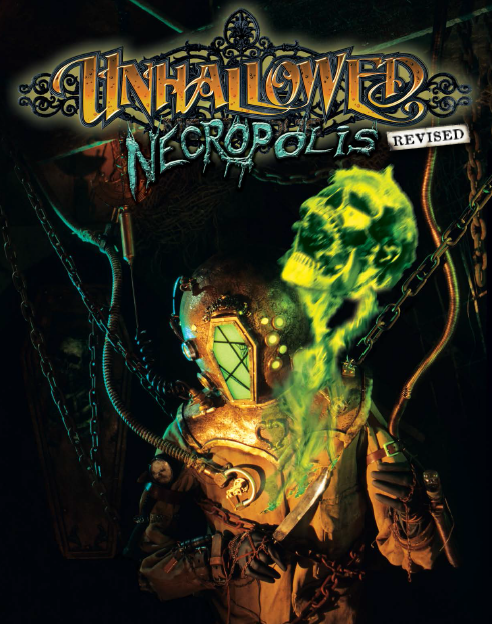
For a quick recap: Unhallowed Metropolis is a d20 based tabletop RPG. The game takes place in 2105, 200 years after the dead rose up in 1905 and threw the world into turmoil. The dead walking was just a symptom of some greater cosmic disease that resulted in the Earth being taken over by a necrotic Blight that mutated plant life and tainted soil. Despite the spiritual death of Earth, mankind stubbornly clung on, resulting in things getting worse and worse.
There are vampires, ghouls, werewolves (in the form of chemically/bite induced Mr. Hydes), reanimated corpses (through plague or mad science), brains in jars, genetically-augmented soulless humanoids and melancholic Frankenstein's monsters. The tech and cultural level is an incredibly lopsided mixture between goth pulp future and traditional Victorian society. The result is a fortress city of London surrounded by giant concrete walls, policed by a WWI-styled army who resolves any outbreak by razing the block and building a new one on the ashes. The other major world powers are a league of Prussian airships, an immortal French god-king who might be the Devil or a dark god who closed the borders of France, a smattering of other European nations and old colonies and everything east of the Rockies in the US. A lot of London's problems are self-inflicted and the game is about playing trouble-seekers in the city.
The word of the day is "hopeless" and it's not gonna get better in this book. Like I said: they mention that ghosts have been roaming London since the early 20th century and they did absolutely nothing with that in the core book. And that always struck me as weird. I mean, ghosts and demons and all sorts of supernatural monsters got a few mentions in the New World of Darkness core book and they all got a few pages dedicated to mechanics and how they work in play. How do you say something like "oh yeah there are ghosts everywhere" and then not expand on that? The book is already ~400 pages long.
Unhallowed Necropolis isn't nearly as long. It's literally a little under half the length. But it does have a lot to add to the core campaign. And, admittedly, there's a lot more to Unhallowed Metropolis than just adding ghosts. Here's a preview of nightmares to come:
-
Chapter 1: Visions and Revelations: a history of spooky stuff and more goings-on in London.
-
Chapter 2: Mysteria in Vitro: Five new classes, new qualities/impediments and new mental disorders. Fun fact: mental disorders actually have a mechanical use in play this time around.
-
Chapter 3: Through a Glass Darkly: Psychic powers, rules for psychics and power listings.
-
Chapter 4: The Ghosts of London: Spiritualism, ghost-hunting, medium powers, exorcisms and how the dead intrude on the living.
-
Chapter 5: Aethertech: Ghost-hunting with gadgets and tools, containing ghosts, more drugs and more ramshackle implants. The closest thing to a full-on equipment chapter.
-
Chapter 6: Beyond the Shroud: The GM chapter.
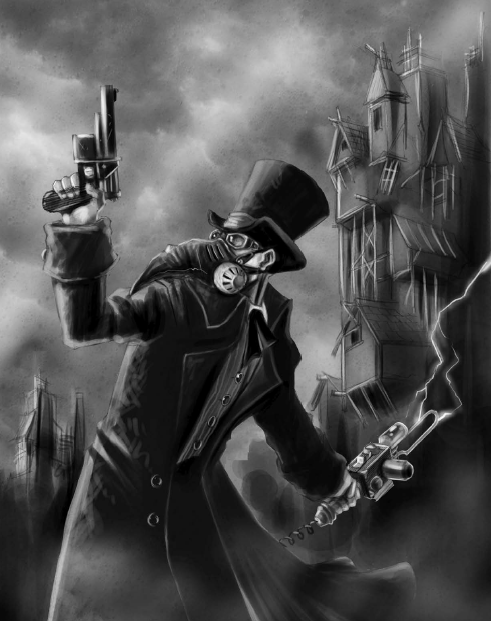
Also I was thinking about adding some extra content to the reviews by attaching some short stories taking place in the metropolis of London. Frankly, Necropolis is more of the same pointless Gothic bleakness and "realistic"/rough rules and it would be boring to give you more of the same. If anyone's interested, let me know and I'll attach them when I come back with Chapter 1.
CHAPTER ONE: Visions & Revelations Part One
Original SA post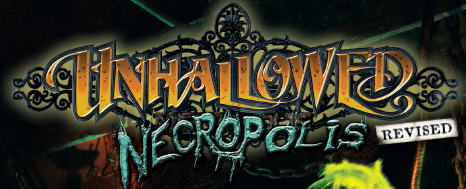
CHAPTER ONE: Visions & Revelations Part One
So Chapter One has a chunk of in-universe text, kicking off with "The Origins of Parapsychology" which is the history of parapsychology in the real world up until the Plague Years. If you're super interested in the field, you probably know the history. I'd recap but this is a tabletop RPG and I'm here to share the fake history of a fake science in a fake society and the fake events herein. There is a lot I'm gonna be skipping over, so I'll be breaking up the paragraphs with pictures of timelines provided in the book.
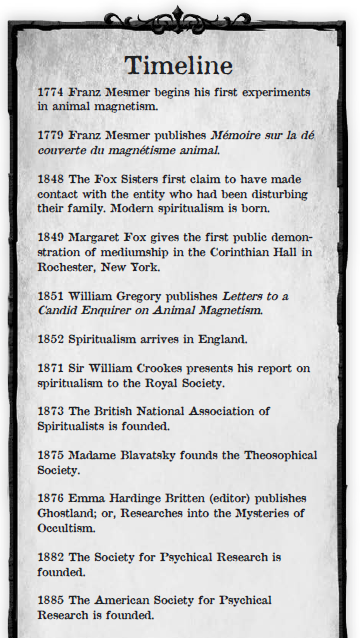
During the Plague Years, there were lots of survivor settlements away from the armies of the world. Sometimes the protected zones would willingly dump people in the wasteland for crimes or to make room or for fun. And as a result of being forced to live directly in the middle of an apocalyptic nightmare, a lot of people developed mixtures of PTSD, depression and more. But a rare few got more than years of emotional turmoil and grief and began to develop unnatural abilities they could exercise with their minds. They were brought to the attention of scientists and the military and were researched.
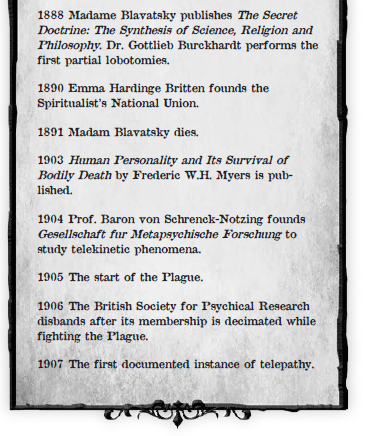
On the other side of supernatural stuff, the mass deaths of the survivor settlements started leading to weird supernatural phenomena, especially if they bordered the wastelands or cities. Hauntings and general ghostly activity began to really step up, especially when death was imminent. A lot of ghosts were confused and disruptive, some were just malicious, and some didn't fully manifest and just threw shit around. On top of that, some people are able to talk to the dead and interact with them.
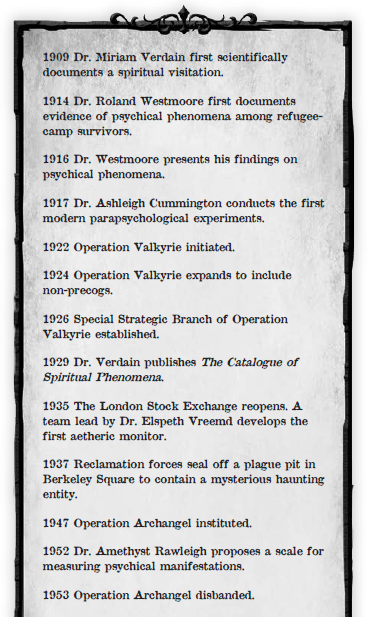
From here it gets really specific about instances of hauntings and psychics unleashing their powers. So let's just jump ahead to 1917. English scientists start taking some of their psychics and their mediums and experimenting on them en masse. A lot go even more insane, a lot of them die, but a few end up refining their powers. The ones that make it through the tests were used for Operation Valkyrie and were assigned to command posts along the wasteland. The idea was that friendly psychics and mediums would be able to help detect major plague outbreaks and help the military coordinate or just help the military destroy Animates and other supernatural monsters.
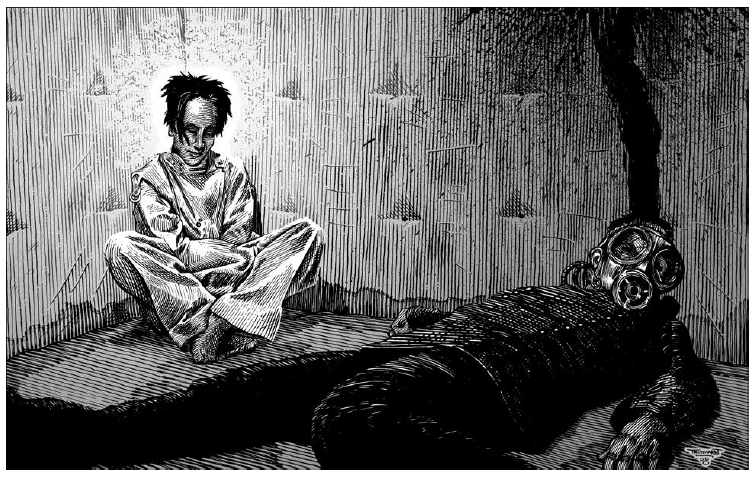
What happens when you use emotionally-disturbed disaster survivors to operate without giving them stability and therapy? Nothing good. The precogs and the other psychics were often inefficient or wrong and they were always understaffed. But they kept intentionally exposing people to mind-breaking situations and they kept pushing. From their pigheadedness came the Special Strategic Branch of Project Valkyrie, controlling squads of similarly-powered psychics who were trained in concentrative techniques to help hold their minds together. Despite having an appalling mortality/insanity/termination rate, the SSB was able to help Britain reclaim London and defend the survivors.
What were the mediums doing? Uh. I dunno. Great question. They're mostly used by the government for a variety of reasons or working privately. Why answer that question more thoroughly when you can just talk about ~PSYCHIC POWERS~?
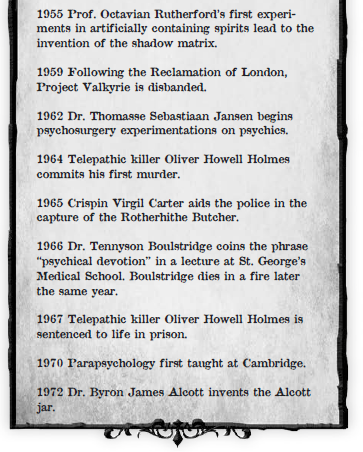
So now that the sources of psychics are understood, and there's a way to get them to control their powers, the British parapsychologists decide to work on means of inhibiting and inducing psychic phenomena. It's kind of hard work to just let a potential asset to the Empire live a life of crushing despair in the wild until they can move stuff with their mind. Both induction and suppression is incredibly costly and hard to research. For suppression, they come up with:
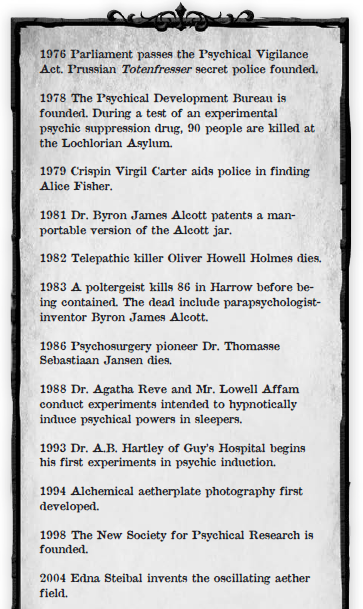
-
Lobotomies are the fastest and easiest way to permanently turn off psychic potential. So are truckloads of sedatives.
-
Psychosurgery was the second answer. Psychosurgery is much more precise means to poke around the grey matter until the psychic was unable to use their power without being rendered insensate to the world.
-
Finally, doctors managed to come up with inhibitor drugs. Side effects of said drugs often involve hallucinations, headaches and nausea, and not all psychics were affected by them. The scientists shrugged and said "good enough" and now inhibitors and drugs come in different doses and sizes at apothecaries. Psychic criminals often have them forcibly installed and untrained street psychics are often addicted to inhibitor drugs to keep themselves "normal".
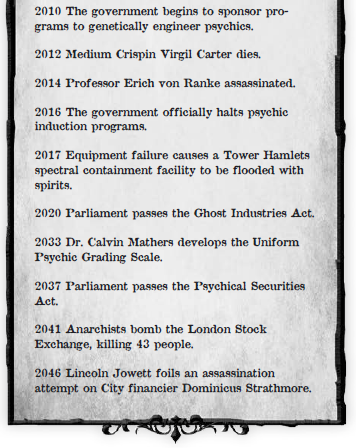
Induction was a lot more sinister. Officially, psychosurgery was used to stimulate the brain in the opposite of suppression surgery. In reality, a group of government workers and private investigators ended up revealing a government conspiracy called Dominion.
Originally called Project Archangel before it was shut down, The Psychic Defense Bureau (aka Dominion) was established to help control psychics for the Empire and induce powers in normal people. Much like the MKULTRA experiments, their real purpose was to operate covertly in asylums and workhouses experimenting on the poor and destitute. On top of that, they often employed heavily-armed kill teams in their labs to help control the test subjects. When a pyrokinetic killed two orderlies by accident, a kill team chased them into the bowels of a sanitarium as the others worked on evacuating the staff. What resulted was the entire asylum burning down, hotter than any normal fire and visible from anywhere in the city. Dominion panicked and set about terminating test subjects and destroying labs to cover their tracks, and it was officially blamed on arson by anarchists. Later, an inquisitive reporter tied together several leads and would interview the disgraced project leader being held until watch in a hospital room and publish his findings in all newspapers. As a result, scandal broke out and accusations fly in the government, support is lost for the ruling party and people start trusting the government less about psychics.
Dominion is not shut down.
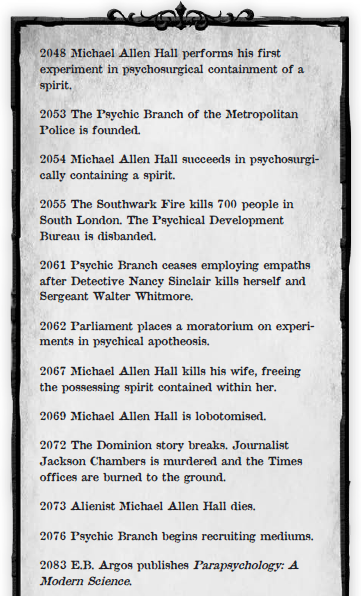
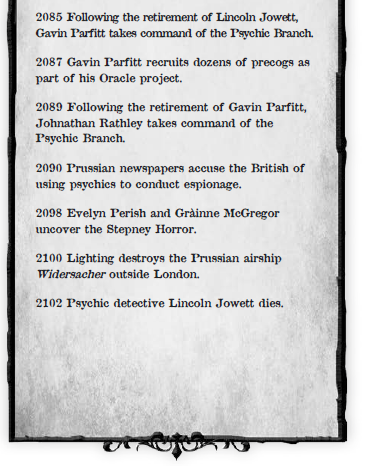
And I'm not done with the chapter yet. Remember how I said this was all about ghosts? Well, I was wrong and Halloween Jack was right. This isn't really about ghosts. This is about whatever the hell the creators felt like adding past the core game. Ghosts themselves really get the short end of the stick compared to psychic powers and Neo-Victorian shrinks. And like I said: I'm skipping a lot of the more specific stuff. I skipped a whole section on how the London stock exchange came to terms with precogs using their powers for insider trading (spoilers: it's illegal to use psychic powers to make a killing on the stock market). But I'm keeping some of it to remind you that they go into an insane amount of worldbuilding sometimes even if it's stuff I really could not care about or would not be used in a plot hook. I could get behind being rogue psychics and adventurers fighting against Dominion. I don't think most of you guys care about Parliament's attempt to come up with licensing and laws regarding psychics.
Next time: GHOSTS! AETHERTECH! PSYCHIC DETECTIVES! MEDIUM DETECTIVES AND THE STEPNEY HORROR! STUFF LIKE IN THIS PICTURE BELOW!
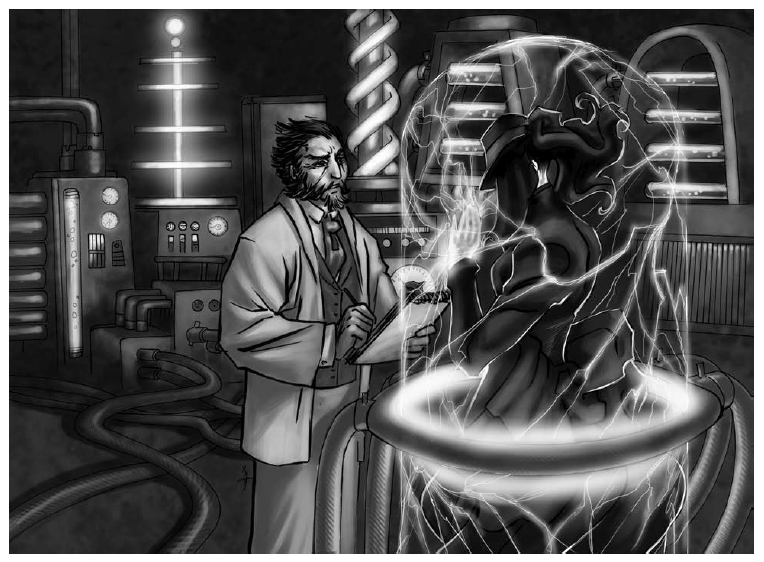
This chapter's short story: The Lowenthal Case
CHAPTER ONE: Visions & Revelations Part Two
Original SA post
CHAPTER ONE: Visions & Revelations Part Two
So what is Britain actually like with all of these ghosts running around? Well, ghost hunting, talking to the dead and banishing spirits is a brisk, thriving business. To some, it's a safer alternative to being an Undertaker or joining the Deathwatch. To others, it's a big money sink for technology or a thankless job that requires a lot of free time or charity. So unless you're hiring a medium to talk to Aunt Josephine, most people's experience with ghosts boil down to containment or avoidance. Unfortunately, London is built on top of the Underground, and the Underground is full of old dead things that keep coming to the surface. These ghosts are no longer anything remotely close to what they once were, howling creatures of malice and spectral energy in misshapen forms.
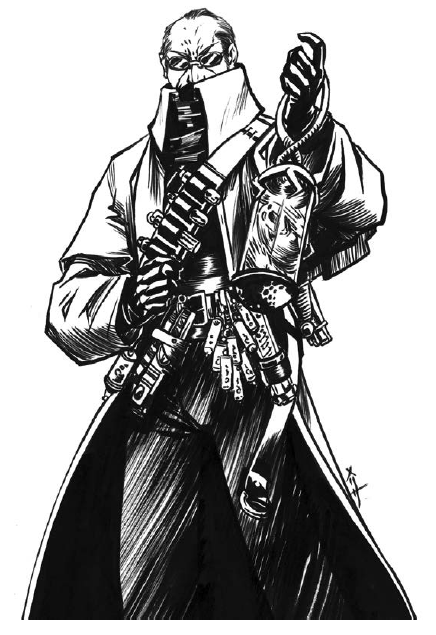
After years of accidentally disinterring ravenous ghosts, mediums, parapsychologists and exorcists started making their own private firms to deal with the restless dead. The business is legal and recognized and controlled by various national rules. Parapsychology is booming and an accredited science to study, with most ghost hunters capturing spirits and bringing them back to research. While it's far from perfect, more often than not Neo-Victorians are looking to capture ghosts or detain them. To them it takes more effort to actually go about exorcising them, and general belief in religion has gone down due to the apocalypse. And more often than not, they do more good than the police or military can.
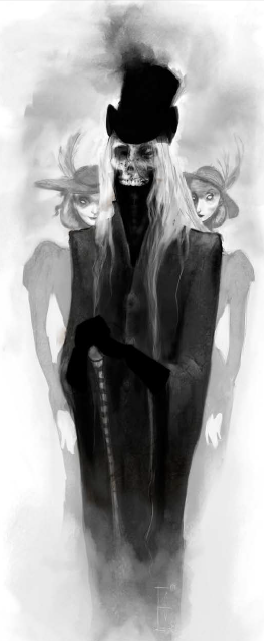
While the police employ precogs and various other psychics in their service, as paid consultants or as actual policemen, more often than not they're a novelty or another tool to be used. A few lucky mediums are employed as forensic pathologists. Occasionally, they will end up picking up and averting an assassination, an anarchist bombing or an Animate outbreak but most of the time they're just used to gather clues or interrogate suspects without touching them. They don't always have to deal with the real monsters.
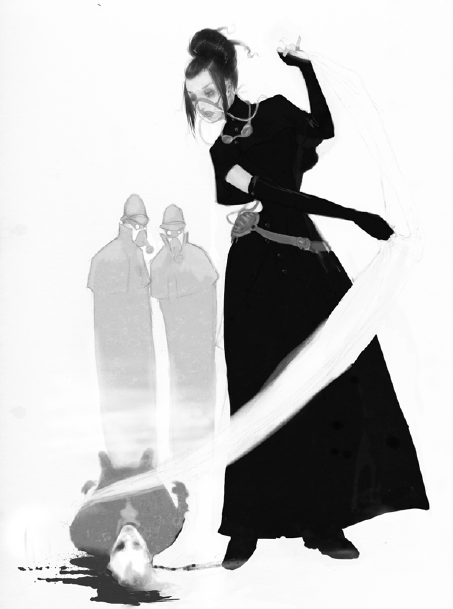
The most notable of these monsters in recent memory was a incident called the Stepney Horror. Stepney was a slum in the city, notorious for being violent and crime-ridden enough to regularly attract feral vampires looking to set up hunting dens or Plague outbreaks. On top of those threats, Stepney was famous for people disappearing in the night. Not just one or two people either; on some nights, around a dozen men, women or children could go missing. The Psychic Branch dispatched some psychic officers to the slum to inspect the area. They found nothing but left with terrible headaches from scanning the area, and after they left the disappearances increased. After the investigation, scientists, psychics, homeless began to flee Stepney and avoid it. When unregistered psychics in the area began killing themselves, the military dispatched some Deathwatch soldiers to help the police. 58 soldiers, policemen and natives were torn apart by an invisible force and the military locked down the block.
One of the head investigators allowed a personal friend, a highly skilled empath, and her Undertaker bodyguard to enter Stepney and investigate. They were given a day to look around before the gates were locked permanently and returned in eighteen hours. What they found inside was an unstoppable horde of Animates centered around a factory deep within the slums and a psychic maelstrom trying to pull them closer. The factory was staffed with Automata (brains in jars operating galvanic bodies, built to do manual work) force-feeding chained captives into the mouth of a furnace. The furnace was pumping something into bottles in the factory and the rest was released into the sky by a smokestack, making a black coal fog of psychic screams and ectoplasmic energy. The duo burned down the factory, returned to the gate and that was the end of the Stepney Horror. The taint of something remains in Stepney and many psychics or scientists refuse to go near where the factory once was. Nobody knows who built the factory or what it was doing, but I'm pretty sure you guys can hazard a guess and come up with something the creators would approve of.
Oh hey, this picture is actually kinda relevant.
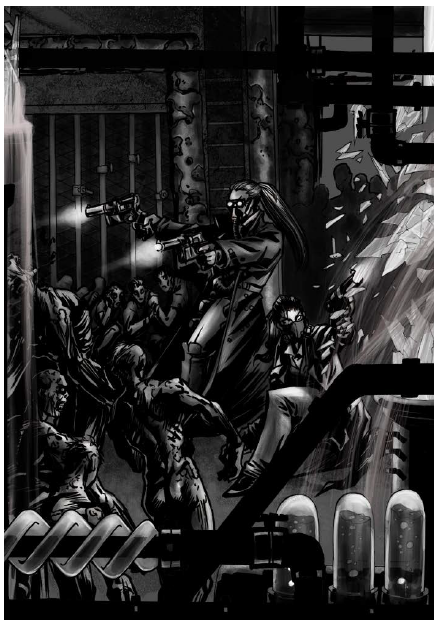
This is the face of the supernatural in London; it's an omnipresent force that preys on the weak and the desperate, just like the city itself. And sometimes, people tamper with it and very bad things happen.
NEXT TIME: THE FIVE PEOPLE WHO TAMPER WITH IT AND HOW YOU CAN PLAY AS THEM
CHAPTER TWO PART ONE: Mysteria in Vitro
Original SA postGuess what's back like a bad penny? If you have no idea what it is I'm talking about (and oh my god the last time I posted anything about this was August 2014, ugggggh) please go check out the Inklesspen archives. Unhallowed Metropolis is the core game and Unhallowed Necropolis is the expansion book.

CHAPTER TWO PART ONE: Mysteria in Vitro
Metropolis had eight character classes: Aristocrat, Criminal, Deathwatch Soldier, Detective, Dhampir Vampire Hunter, Doctor, Mourner, Undertaker. Necropolis adds five more classes and they all have to do with the supernormal and the spiritual: the Alienist, the Exorcist, the Medium, the Parapsychologist and the Psychic.
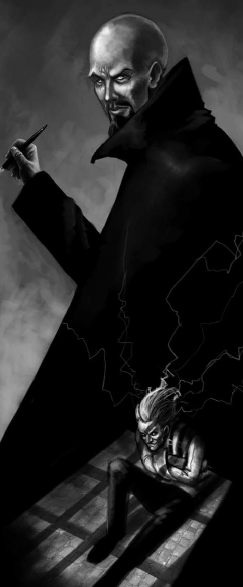
ALIENIST:
Alienists are therapists, psychologists, psychiatrist, shrinks, head-doctors and more. While the plain, vanilla Doctor of Metropolis is a master of all sciences, the Alienist focuses on exploring the realms of the mind. Alienists play a wide role in Neo-Victorian society: they help the police on cases by discerning the pathology of the criminal mind, they are residents at private clinics and public hospitals and they study psychics. Of course, you're clearly playing the kind of Action Psychiatrist who kicks ass for money if you're making an Alienist PC (or you're going to get up to some abominable shenanigans because of your Corruption).
Alienists get the feature of MEDICAL AUTHORITY. Fill out the right paperwork at a sanitarium you're affiliated with and they will commit someone on your behalf. After a minimum stay of three days, the Alienist or the person responsible for the case will decide if the patient must stay committed and for how much longer. I honestly don't see much use for this specific function of the feature: you are cautioned not to abuse your powers lest they get taken away or a patient decides to get revenge on you, but this is still a pretty good way to just brute-force your way past a NPC or stonewall an enemy. They also get the feature of PSYCHOLOGIST: for every point in the skill Psychology, the Alienist gets to pick a bonus from the following list.
-
Applied Psychology: you're really good at Hypnosis and Psychology so every roll you make gets one free reroll.
-
Calming Influence: the Alienist anchors their mind and emotions and it helps keep others stable. Add your Psychology stat score to characters around you that need to make a control or Fear check. This doesn't apply to you, but it's real good for party morale and synergy.
-
Credentials: You're super, super popular. Add your Psychology stat to Credibility rolls to access higher echelons of help and society. Don't disgrace your name, though, or it could affect this ability.
-
Criminologist: Roll Forensic Science at crime scenes to make a profile of the criminal responsible. If you succeed, you get a good profile. Fail and you get a flawed one with
some
correct info but also some red herrings.
-
Death Councillor (sic): +1 to Credibility rolls when helping people mourn.
-
Disciplined Mind: Take this in coordination with Calming Influence. Actually, take this period; Fear rolls suck and I've never much cared for that whole system. It makes you immune to all natural Fear rolls and you can reroll a Fear roll when it's caused by a supernatural power (vampiric gaze, psychic ability).
-
Insight: Sense Motive. Make Wit rolls against a target's charm to determine if they're lying or not. You also get one free reroll per roll for Charm contests against you.
-
Manhunter: One free reroll per use of the Tracking skill to find people or humanoids.
-
Private Menagerie: You, uh. You have a collection of deviant minds imprisoned in your possession. Talk to the GM to figure out how exactly this works (let's say, optimistically, you either are keeping a ward at home in a guest room or a patient in an asylum you're directly responsible for). This can be a handful of people or a single insane psychic. If you can consult these patients while investigating, add +2 to research on Medicine or Psychology. This is cumulative with Private Library or Private Lab and if the patients get loose they will be pretty pissed at you.
-
Private Practice: You have the Business 3 Quality and access to a regular group of patients to observe or (sigh) experiment on. You also get +1 Wealth.
-
Psychiatrist: Access to drugs, yo! Access up to 30 pounds (that's dollars, not weight) of drugs/alchemical solutions for free a month, including illegal drugs related to your profession (like psi-inhibitors). These can be prescribed or just used for your own means. You also get a free small pharma lab.
-
Psychical Dampener: The Alienist can turn on an inhibitor field if they focus nice and hard. -2 to Wit, Intellect and all skills but while it's on, the Alienist is immune to all Empathy and Telepathy powers. If a psychic targets you with a power requiring a contested Will roll, you automatically win. If a psychic uses their powers within 10xWill of you they gain one Instability point.
-
Psychosurgeon: Get one free reroll per roll for Torture, Medicine or Psychology in the context of psychosurgery. The fact that Torture is a skill on that list says a lot about what psychosurgery can be.
-
Stone Faced: As per the Detective power, one free reroll for Interrogation and Intimidation and denying opposed characters from adding their Concentration skill to Interrogation and Intimidation.
- Ward Manager: Here, have a giant hassle for your character and also a stupid amount of power in the same package. You also get +1 to Wealth and the Credentials quality.
Thoughts on the Alienist: they seem to be built for two different roles. On the positive side, the Alienist is a steady force that helps keep the group stable and helps with investigation and psychics. On the negative side, it's really easy to turn your character into a morally repugnant person up to Abominable Shenanigans with their free drugs, brain surgery, ability to commit people and be in charge of their case. This is barely considering the madman they keep chained up in the coat closet.
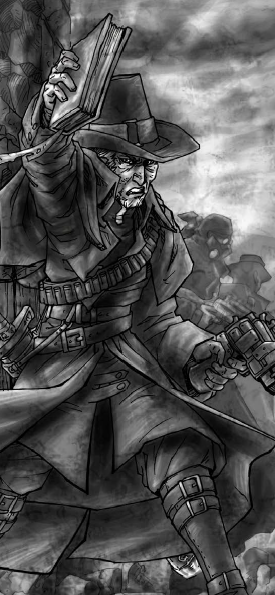
EXORCIST: Suffer not a ghost to live. Exorcists are folks with True Belief and force of will to fight back the forces of darkness. It's commonly believed that their power stems from their will and has nothing to do with actual divine manifestation. You end up with a lot of cultists and cranks picking up a book and a gun protecting the streets while Exorcists of major churches are held in good societal standing. Just pick a religion (or make your own beliefs) and figure out how your PC expresses their faith.
Exorcists get a few different features. First, there's CRISIS OF FAITH. If your highest Corruption track is greater than your Will stat, you lose access to Compel, Lay to Rest and Deliverance. The Exorcist must redeem themselves to get the powers back. In the realm of class benefits there's COMPEL, which allows the Exorcist to make a Will roll against a spirit in their presence. If they win, the spirit is forced to tell the truth as long as it's near the Exorcist. This comes with a major dick move: the GM isn't supposed to tell the Exorcist if they succeeded the roll. LAY TO REST takes 10 minutes of concentration against a targeted spirit (which can retaliate) and make a Will roll. Succeed and you reduce the Spirits Will by 1. Reducing the score to 0 puts the spirit down for good, so you keep making rolls as your buddies help keep the ghost at bay. DELIVERANCE gives the Exorcist the ability to exorcise spirits from people or places by focusing for 5 minutes and making a Will roll against the spirit. Succeed and the spirit is ejected for 1d5 hours. You can follow up by sanctifying the area/person for a half hour to prevent the spirit from returning for 1d5 days. Finally, no fear rolls due to ghosts and stuff. Exorcists get extra powers from ranks in their Theology skill, one per level.
-
Congregation: Free Leadership feat. Abstain from scandal and they'll help you out. This option is not available for Exorcists who belong to the Church of England.
-
Exemplar: +1 to Vitality and Will rolls for people around you as long as they're in your presence. Nice party buff. Doesn't boost damage rolls.
-
Fire and Brimstone: Add Theology to your Charm rolls for oration. Also, anyone who hears your words gets +1 to resist their Afflictions for a day.
-
Force of Will: You can roll Will instead of Vitality. If Vitality is higher or equal, get +1 to your Vitality rolls instead. Doesn't apply to doing damage.
-
Inquisitor: One free reroll for Interrogation, Charm, Intimidation and Compel rolls. This is kinda imbalanced!
-
Inspiration: Absolutely blowing Calming Influence out of the water, the Exorcist and anyone around them automatically succeeds at Fear rolls. Very damn imbalanced.
-
Judgment: Literally Paladin-style Sense Evil. Make Will rolls against people to sense their highest Corruption ratings and Afflictions. However, this automatically fails if their ratings are higher than the Exorcist's highest ratings. Nice on paper for roleplay, absolutely useless for purposes on gameplay especially if you play the most morally pure Exorcist you can.
-
Mental Bastion: Automatically succeed in defense against any attempt to possess the Exorcist or mind control them. Very handy. Kinda imbalanced.
-
Noctuary Agent: Something we've seen before. Join the Noctuary, fight the undead, etc. etc. Free Membership quality and +1 to charming the other agents.
-
Purity: Hilariously imbalanced, can only be taken at creation. Gain the Long-Lived and Incorruptible qualities for free. Long-Lived gives you a lifespan that makes you look 50 when you're 150, and that's not counting anti-aging treatment. Incorruptible places the Exorcist in peak physical health forever, gives absolute immunity to disease (!) and this includes vampirism and the Plague (!!!) and will never come back from the dead, PLUS you can't start with Physical corruption and can
never
gain it. This is a really good thing to take!
-
Revered: You're on good standing with other holy folks. You can get consulted for things or consult others and you can get their help too. One free reroll on all Credibility rolls.
-
Sanctity: If the Exorcist encloses a space to create a psychic barrier, add the Concentration skill score to Will score to determine the DR a spirit has to beat to break it. It also lasts for days instead of hours.
-
Shield of Faith: Free faith armor. It only applies to attacks made by psychics or spirits, but this includes if they fling something heavy at you or whatever. You gain your Will score in full body armor.
-
Stirring Speech: If you can make your case, one free reroll to all Credibility rolls.
-
Sword of Righteousness: Okay,
now
you can use your Will score instead of Vitality for damage.
- Theologian: Ohhhhh boy. So normally skills have a limit of 5. You can start at 5 pretty easily and for Exorcist, this is something you should do when you consider all of these other abilities. If you take Theologian, your Theology skill can exceed your Intellect limit (can't have a skill higher than a corresponding stat) by 2. With me so far? Cool. First of all, pump up Intellect and Will (round out the other abilities for good measure). Then make sure you take Theologian and Purity. Then, pump up your Theology skill. Now grab more abilities hand over fist and become even more imbalanced (make sure you pick Force of Will and Sword of Righteousness). Oh also if you want to, you get one free reroll per use of Theology. That's nice but it's not nearly as nice as the rest of all of that business.
The Exorcist starts with the Faith quality (+1 to resist fear and exhaustion, meh) and Resolve quality (failing Fear saves only leaves you shaken, complete non-issue with some of these other abilities). They start with Concentration 2 and Theology 2 and can pick five of the following skills to start with: Etiquette 2, History 2, Melee Weapon 2, Parapsychology 2, Performance 2, Pistol 2, Psychology 2, Rifle 2, Thanatology 2, Torture 2, Unarmed Combat 2. Exorcists begin with the trappings of their faith and a good respirator. They start with vanilla lodgings at a boarding house or rectory, better or worse depending on if they adjust their Wealth. They start with Wealth 4 and get 20 pounds to spend on things. They can only keep 5 for savings.
Thoughts on the Exorcist: Deliciously imbalanced in the right hands. It does the heavy lifting way better than the Undertaker or Deathwatch Soldier could ever hope to dream of and it's no slouch against ghosts. The ability to substitute your good stat for your melee damage stat is completely bonkers and I have a feeling they did not playtest this idea in the slightest. You would be a kind of MAD class if not for the ability to easily game the system and start with Purity, Theologian, Sword of Righteousness, Force of Will and Inspiration. All you have to do is make sure you have a good Coordination stat to help your defense. Now let's be fair: if I wanted to play this kind of character, I would be playing Warhammer 40k. But it's incredibly tempting to roll up someone like this and run roughshod on all of the dangers of the world, belonging to the one man Church of None Of This Is Real.
I'm gonna call this one here because I think it's a beautiful thought to end on.
NEXT TIME: the Medium, the Parapsychologist and the Psychic.
CHAPTER TWO PART TWO
Original SA post
CHAPTER TWO PART TWO
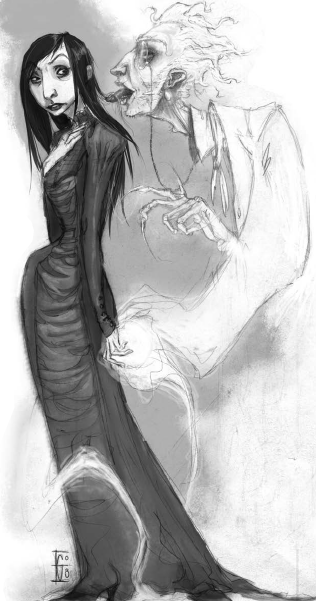
weird damn picture for a character class...
MEDIUM: Mediums observe spirits thanks to having powers of Second Sight. Second Sight is always on and it can be tricky to tell the difference between London and the Spirit World. Most Mediums are self employed and part of London's booming post-mortem communications industry. Some end up getting attached to aristocratic families and groups or end up becoming entertainers. Nothing says "birthday fun" like a medium channeling your dead relatives to wish you a very happy sixth birthday.
Other classes can end up with Second Sight by way of Latent Medium (Mourners, Psychics). The difference is that they don't have access to what a Medium can do beyond paying into Second Sight's Quality to raise its levels. Mediums automatically get FAMILIARITY: SPIRIT and never make Fear rolls for ghosts. They also get SECOND SIGHT level 1 for free and can upgrade it with custom points at creation. They also get bonus abilities tied to their Thanatology skill rank.
-
Death Sense: You know when someone isn't going to live through the night and can sense when someone is hiding an Animate bite. The GM tells you when and why the sense is triggered. This is a pretty useless ability on a mechanical level. It's not bad for role-play, but eh.
-
Fame: You can reroll Charm for people who are fans of your work and get one free reroll on Acting and Performance rolls while performing.
-
Influential Circle: The Medium meets weekly with seven other people as part of a circle of spiritualists. There's no mechanical benefit, it's mostly just a way to give the Medium allies or leads as long as they keep up a good reputation.
-
Latent Psychic: You're a latent empath or telepath. You can get one level of Empathy or Telepathy for 5 points and then develop the ability further, but you can't access bonus features of the Psychic class or develop any other types of Devotions.
-
Living Conduit: You get one free reroll on Will rolls when using a Second Sight power.
-
Mortuary Scientist: Like Theologian, but instead this lets your Thanatology skill exceed your Intellect stat by 2 and you get one free reroll per roll. You're also well known as being a smart cookie when it comes to death stuff. You may be noticing that I'm not clamoring for you to take this skill like Theologian.
Well...
keep reading.
-
Powerful Medium: Add your Thanatology stat to Will to determine the range of your powers.
-
Primacy of Will: One free reroll per roll for Will contests when you're being ridden by a ghost you're manifesting or being possessed by.
-
Spirit Guide: Free ghost buddy that has Will 3. It can't actively hurt you, but it can be a cheeky fucker. It may also help you or defend you against your wishes. Talk to the GM about your ghost buddy.
- Spirit Photography: You don't need special material to photograph ghosts.
Thoughts on the Medium: Okay, first, let's look at Second Sight before I go into my thoughts. I would normally hold off this until it appears in the book but it's kind of vital we take a crack at what exactly a Medium can do with their powers.
SECOND SIGHT: Second Sight comes in 5 levels of ability. Every time you raise a rank in it, you get all the abilities the rank has to offer. Some powers may require needing to enter a trance in order to use a power and each power has a Subject, Range, Trigger and Description (Trigger being when and how a power is activated). For Mediums, raising in rank in Second Sight costs 3xNew Level. With me so far? Cool.
Level One:
-
Death Speaker (Self/Self/Passive): Talk to/hear ghosts while in a trance. This doesn't defy the language barrier and using it in haunted locations may overwhelm you. Nobody else can hear the ghosts.
-
Ghost Sight (Self/Line of Sight/Passive or Maintained): See the dead and see who's possessed or not. If it's maintained, you can see the Spirit World and get -3 to all Wit and Vision rolls to navigate the real world while seeing the Spirit World.
- Impression (Group/Radius Willx10/Maintained): Feel the presence of ghosts. Make a Will roll and all ghosts (active or dormant) in the area make separate contesting rolls to see if you notice their presence. The Medium can also tell the relative strength of each ghost.
-
Ectoplasmic Mist (Self/Radius Willx10/Maintained): Summon an ectoplasmic mist and you determine how strong it is. It only lasts as long as it's maintained. Attackers gain a -2 to hit with ranged attacks, the Medium gets +2 to Intimidation and anyone other than the Medium touched by the mists gets a -2 to all Vitality rolls involving poison, illness and infection for the next day.
-
Shroud (Self/Radius Willx10/Maintained): Charge an area with spiritual energy to help weaken the barrier between worlds, or charge with aetheric interference to make it harder for spirits to manifest. Spirits get +1 to Will when it's weaker, -1 when it's stronger.
- Spirit Channeling (Self/Self/Maintained): Trance out and summon a ghost into your body. You can pick a spirit in your presence to bring into you (apparitions don't work out so well, poltergeists can't be channeled). If it's a willing channel, no rolls needed. If not, Will contest. Ghost successes reduce the Medium's Will by 1, KOing them at 0. If the Medium wins, the ghost gets into their body. Ghosts can really only talk to people and are trapped until they're released by the Medium, but a willing channel gets +3 to trying to possess the Medium. There's some more rules, but I think you get the point.
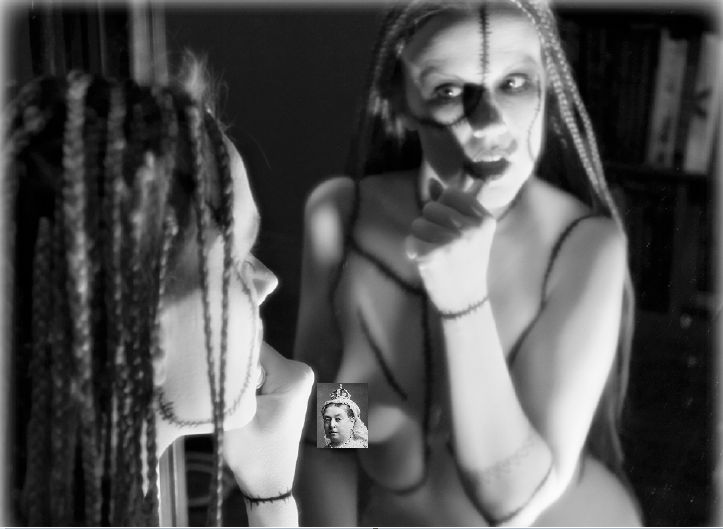
why the hell is this picture here in the section on second sight? I'm not kidding, it's there and it's ridiculous but I need some art to break up these words so yeah have...this.
Level Three:
-
Aetheric Disruption (Single target/Willx10 feet+LOS/Thought): Contested Will rolls to use aetheric static to disrupt or dissipate a ghost. Works the same as struggling with a channeled spirit: either the ghost is cowed and loses will until it's gone or the medium passes out for 1d5 hours. Using it on a possessing spirit doesn't eject it, but it gives the host an attempt to get control again.
-
Compel (Single target/Willx5 feet+LOS/Maintained) Will rolls to make spirits do shit for you. Same rules as above, repeated again. You need to do this every time you tell the spirit to do something.
- Summoning (Single target/Limitless/Maintained): Call a ghost into your presence. You need a tether to call them. If it doesn't want to be called, Will contest like above. If it does, it shows up. Note two things: first, it doesn't have to manifest and it can stay hidden from everyone and second it sure as hell doesn't have to be friendly . Hit it with Compel the moment it shows up before everyone gets attacked by a ghost or it just fucks off. You have to be in a spirit's haunt if it's dormant, and summoning forbidden/quarantined spirits is a crime that carries a penalty of 10 years hard labor.
-
Expel (Single target/Willx5 feet+LOS/Thought): Will contest to end possessions for anyone in line of sight.
-
Manifest (Single target/Willx10 feet+LOS/Maintained): Use spiritual energy to make a ghost manifest and become both audible and visible. For every minute maintained, the Medium must beat a DR 16 Will roll or lose 1 Will every failure. At 0, the Medium naps for 1d10 minutes and regains 1 Will per hour of rest.
- Soul Well (Single target/Willx10 feet+LOS/Thought): Buff/hinder a spirit, increasing/decreasing their Will by 1. Hit 0 Will and you nap again.
-
Deadlock (Self/Willx25 feet/Maintained): Will contests to prevent the ghosts from manifesting.
-
Oubliette (Single target/Willx5 feet+LOS/Thought): Lets the Medium cause people who die in their presence to live on as ghosts. They can roll to resist unless they want to be a ghost. This is a bad power unless you're going to get info from someone but don't need them alive.
- Shepherd (Single target/Willx10 feet+LOS/Thought): Put ghosts to rest with Will contests or nap trying.
Thoughts on the Medium: The Medium doesn't really do anything another class can't (with the exception of Ghost Buddy and even then ).
That's an incredibly harsh thought but it's completely true. The problem with Latent Medium is that it lets other classes do more than just see ghosts with points pumped into it. They can't do any of the other Medium (optional!) class abilities but really what that boils down to is rerolls for Ghost Stuff and Will Contests. Mediums get the ability to raise it at a cheaper level and they get the first level for free, but the Latent Mediums can just do more with their own class abilities. Latent Medium is only available to Mourners and Psychics, but what else can they do?
-
Mourners are the dual-wielding melee badass types, good at combat and they can now be a good asset against ghosts.
-
Psychics are psychics and can now treat interacting with ghosts like the rest of their powers and they're already Will-focused.
-
The Exorcist even gets the heavy lifting abilities of the Second Sight even if they can't see ghosts, accessing the ability to banish and exorcise from the word go rather than pumping points into a quality. They also have absolutely nothing to lose by losing against a spirit in a Will roll to get rid of them, the sole downside is that it just takes a few minutes to channel up some mojo.
- Parapsychologists just need physical equipment to do some of what a Medium can do but also get to play with wonderful Galvanic toys in the process and don't have to worry about naptime.
After reading through the Medium far more thoroughly, if it wasn't clear that they didn't play test or balance any of this it should be apparent now.
NEXT TIME: the Parapsychologist (I won't be including their gear for that update because there's way more than a Medium's abilities) and the Psychic (won't be including their powers either).
CHAPTER TWO PART THREE
Original SA post
CHAPTER TWO PART THREE
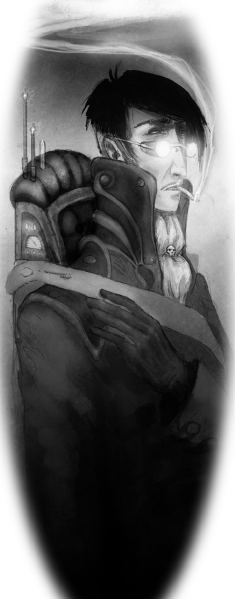
look it's just not proper bustin' without a smoke after
PARAPSYCHOLOGIST: Parapsychologists are academics and science-learnin' types who focus on ghosts and psychic phenomena. They operate entirely using the tools at their disposal, building and maintaining their own tech to hunt ghosts, capture them and measure supernatural phenomena. Despite supernatural shenanigans being an accepted fact of life, parapsychologists are low-ranking in the hierarchy of scientists. Even the nutjobs who try to bring the dead back as Mercurials have better governmental backing. You've still got funding and power, though, and it's enough to be a PC.
Parapsychologists start with FAMILIARITY: SPIRIT so they're never spooked by a ghost. They also gain bonus abilities depending on the strength of their Parapsychology skill.
-
Aethertech Engineer: The Parapsychologist gets their gear for half the price if they can craft it themselves or salvage it from broken tech. You also get one free reroll for Galvanics rolls that deal with building, repairing or maintaining Aethertech. This should not be an optional class ability. This should be a mandatory addition because good god your toys aren't cheap.
-
Credentials: You've got a good name like every other time someone takes this type of skill. Add your Parapsychologist stat to your Credibility rolls.
-
Ghost Hunter: One free reroll per Parapsychology roll when it comes to manipulating an Aetheric field.
-
Historian: One free reroll for every Intellect or Skill roll that has to do with history or finding history or plumbing archives.
-
Interns: The Parapsychologist has 3-10 assistants that can help them or come and go as long as you're not a dick to them. You should make up their back stories too.
-
Keen Eyed: One free reroll for every Perception roll.
-
Mental Bastion: Can't be affected by any supernatural attempts to get possessed or mind controlled.
-
Psychical Researcher: The Parapsychologist automatically senses the presence of an enemy Stand when it's used on them, successfully or not. They also get one free reroll for Parapsychology and Psychology rolls that have to do with psychic investigations.
-
Spectral Eliminations Agency: You've got your own firm. Business 3 and you have an Aether vault to hold spirits.
-
Spectral Investigator: One free reroll for each Parapsychology roll pertaining to spirits and knowledge of them.
-
Spirit Finder: Automatically detect the presence of ghosts in a Willx10 foot radius around you and their relative strength but nothing past that.
- Spirit Photographer: No special materials needed to photograph ghosts.
Thoughts on the Parapsychologist: Like an Artificer, Parapsychologists are totally reliant on their shit and being able to build their shit. They're also reliant on how much stuff they can carry at once, but if you take interns you can turn them into porters. Parapsychologists do get some fun toys to play with and they can also use Galvanic weapons like lightning guns, so they're quite good as a tech-focused class.
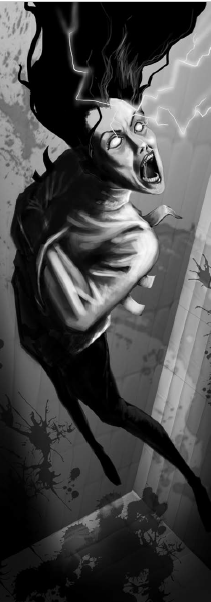
PSYCHIC: You know exactly what a psychic is. In London, licensed psychics are given training for their powers and then ranked in three groups by how powerful they are. A lot of psychic ability is borne from suffering and torment and a lot of psychics have mental issues as a result. So do PCs.
Psychics automatically start with LATENT INSANITY. The presence of psychic powers and a calm mind are holding back a mental disorder that the psychic has; as long as they're stable and calm, the disorder is at rest and they can function normally. It manifests in times of extreme stress or when they gain too many Instability Points from using their powers. You pick a Mental Disorder for free and don't get any points for having an impediment and you can't pick one you already have to be your Latent Insanity. The class abilities Psychics gain stem from their Concentration skill stat.
-
Dead Eye: One free reroll per missed ranged psychic attack.
-
Force of Will: One free reroll on failed psychic control checks.
-
Fortified Mind: Treat Chronic Mental Disorders as Minor Mental Disorders. If you start with this one, you can't start with a Chronic Disorder to game points.
-
Gifted Mind: Free Savant quality, creation choice only.
-
Latent Medium: Upgrade to Large for 50 cents more.
-
Mass Perceptions: Automatically succeed checks to split your perceptions while using your powers to view.
-
Meditations: Enter trances to use certain powers without needing to make a Will roll. When meditating, you can only hear things around and reply to questions. It's a free action to end the trance without a dice roll and if you're knocked out of a trance, it doesn't grant Instability Points.
-
Mind Shield: Reduce damage taken from Electrokinetic, Pyrokinetic and Telekinetic powers by 1. If you have one rank in the devotion attacking you, reduce it by 2.
-
Nexus: Extend the range of your powers by adding your Concentration stat to your Will for determining range.
-
Self Control: One free reroll per each failed Mental Disorder control checks.
-
Silence: Never suffer Empathic Backlash from Empathy powers, tune out the outside world while using your powers.
-
Sound Mind: Temporary Insanity from losing control only lasts one day. You can also remove two Instability Points instead of the normal one for eight hours of sleep/relaxation without powers.
-
Waking Mind: Use trance powers without totally trancing. -3 to Wit, Skill and Charm rolls and only take actions to activate powers or move but you can speak normally and just look very distracted instead of in a full trance.
- Wrathful: If you have a wound, if you are attacking a hated foe or if a loved one is in danger, +2 to Electrokinesis, Pyrokinesis and Telekinesis damage rolls.
Thoughts on the Psychic: It's hard to get into them without talking about their powers. They're the squishy wizard splat and most of their class benefits are about making the facets of their class be less of an impediment. It's not too hard to smooth the edges and it's interesting that they only get a little bit of their abilities to be about increasing damage or hitting better. In the long run, it helps that the limits of Concentration are dictated by Willpower and Psychics need a high Willpower to handle Instability. There is also some backwards compatibility fuckery we will get into when I get deeper into psychic powers.
How powerful are they from the word go? Not very; level one devotions grant minor things, it takes second level to do more impressive/offensive things. Make sure you pick up some combat abilities to help you out.
NEXT TIME: Qualities and new Mental Disorders and the end of Chapter 2.
CHAPTER TWO PART FOUR
Original SA post Night's Black Agents is pretty good and I appreciate that you're sharing it, Prof. It gives me good thoughts of vampire stories.
CHAPTER TWO PART FOUR
NEW QUALITIES AND IMPEDIMENTS: Qualities and Impediments are bonuses or drawbacks you take at character creation. As much as this kind of system tends to be a bad idea that doesn't integrate game mechanics and roleplaying properly, the vanilla options from Unhallowed Metropolis had a lot of just plain shitty choices you should never take such as: Good Tasting, Fits (aka seizures/epilepsy), Hemophilia, Consumptive, Leper, Syphilis (because you can't cure it for unknown reasons), Gigantism (because despite being a bonus, it has "realistic" drawbacks such as what ended up doing in Andre the Giant) and Malignity. So let's see what's on the menu this time around: bad choices and a lot of art to break up the text.
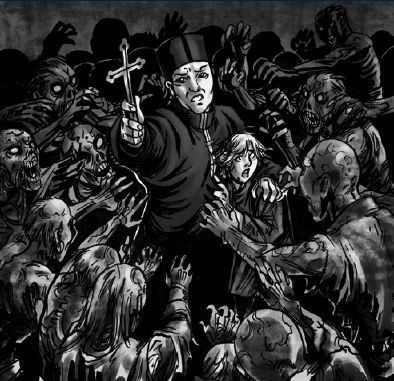
wrong thing to do but at least you tried
Social Qualities:
-
Church of England Clergy: Be a priest, a canon, a cathedral dean, a suffragan bishop or a diocesan bishop. PCs can't be higher in the church than diocesan bishop. Variable costs and each gives you various bonuses to call on.
-
Priest: Ordained by any other order than the Anglican church. Only one level. If you're not in your community, people will think you're a little off base with your beliefs and you're not necessarily in a good political position being a Buddhist or Taoist or Protestant or anything not Anglican. This isn't actually stated to give you anything besides the position of priest in an organization, there's no real ally hooks to call on or changes to wealth or benefits but I dunno, figure something out.
-
Psi Branch Investigator: Can only be taken by anyone with psychic powers with at least one level in Telepathy, ESP or Prescience. Also requires not having Wanted or Criminal Record impediments and must have 2 in Forensic Science, Streetwise and Law. What does this give you? You start with Wealth 4, a gun, handcuffs, whistle and the ability to arrest/detain people and be a cop.
-
Secret Government Agent: Exactly what it sounds like. +1 Wealth, gain a handler that gives you mission and access to safe houses.
- Secret Occult Society Membership: Also what it sounds like. This can be as benign as pagan worship or exploring sexuality with erotic rituals (not my example, this is in the book) or as dangerous as the exploration of dark arts and other esoteric, dangerous things. You can call on the society for help or things, but don't be a dick and pay back what you owe. Requires Parapsychology 2 to take and talk it over with the GM.
-
Escaped Mental Patient: Ayup. And they want you back. This is much more dangerous if you're playing a psychic because they're willing to tell the cops about you.
-
Monthly Evaluation: Psychics only, can't have Escaped Mental Patient or Unlicensed Psychic. You had a meltdown somewhere and need to meet monthly to see if it's okay for you to still be out in the world. -1 Charm to talking to people who know about your evaluations and if you fail, chances are good you'll lose your license and get committed.
-
Quick Temper: EAT SHIT. DC 16 Will rolls to resist getting mad at being ignored or insulted.
- Unlicensed Psychic: It got revoked or you never registered. You can't legally make money off your powers and worse: you don't start with Concentration 2 as a class skill. -2 to Credibility rolls with psychics and employers who know you're a psychic.
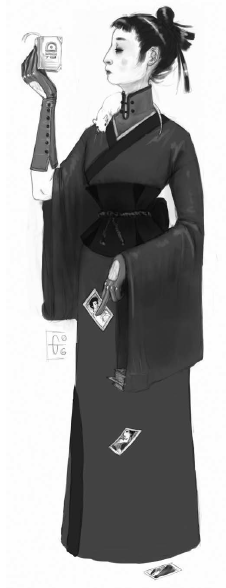
and for my next trick, I will pull a good quality out of my deck of magic cards
Supermundane (ugh I hate that word) Qualities:
-
Cipher (Telepath only): Your mind reading/telepathic sending comes with translate.
-
Dream Sight (Clairvoyant only): You can use ESP in your sleep instead of a trance. DC 14 Will check to remember your dream when you wake up, otherwise it's fleeting snippets.
-
Infectious Personality (Empath only): One free reroll on contested Will rolls using your Empathy because, well, you're just that forceful.
-
Psi-Null: Never become a psychic ever. Grants complete immunity to Empathy and Telepathy, automatically wins Will contests when targeted by a psychic power, causes all psychics within Willx10 feet of the psi-null to gain 1 Instability Point whenever they use a power.
-
Sensitive: Shitty Second Sight. Sort of see/hear spirits depending on how much Will they have, but it's vague and requires Will rolls to understand them. Mediums can't take this.
- Spirit-Touched: Higher Sensitivity/a near death experience/being born near a shitload of ghosts makes the PC a spirit-touched half lifer. Gives the Half Lifer benefits, +2 to Will to resist spiritual powers and the ability to see ghosts/hear them like a medium but depending on Will like Sensitivity. Also you can never be a psychic so psychics and other half-lifers can't take this.
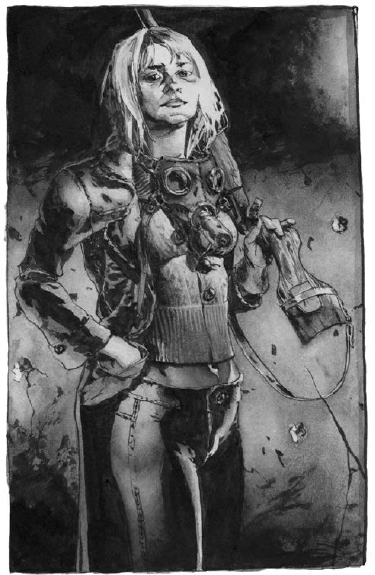
pretty rad, she'd make a good PC
Supermundane Impediments:
-
Altered States: Can only use Second Sight/psychic powers when under the influence of a drug or substance. It can be specific or it can just be whatever is at hand, but it can't be a little or a sip; you have to have the effects of the substance to use your powers. Smoke a blunt, shoot lightning from your fingers.
-
Blinded Sight (Clairvoyant only): Can only use ESP powers when blindfolded, in the dark, your eyes are shut, etc. If you open your eyes, your powers shut off and you gain 1 Instability Point. If you're blinded this impediment no longer matters, but you can't pick both Blinded and Blinded Sight, you would have to be Blinded over the course of play.
-
Blood Work (Precog only): Can only use Prescience powers when you have an open wound on your body and can possibly only enter a trance if there's a blood focus to concentrate on. This is the same level of Impediment as "can only read minds when high on opium" and yet is much, much worse.
-
Burns (Pyrokinetic/Electrokinetic only): Failing a control check related to those two powers causes the psychic damage. Fail an Electrokinesis check, roll for damage with a modifier equal to the level of the power you failed to use. Fail a Pyrokinesis check, catch fire.
-
Combustible Dreams (Pyro only): The PC has nightmares that cause them to set fires in their sleep to try and protect themselves. Every night, the PC must beat a DC 14 Will save to wake up without setting everything around them on fire. Sedating the psychic means that they will automatically be unable to wake up before they start a fire, ensuring damage and danger. Psi-inhibitors are the way to go to sleep without worrying.
-
Delirium Tremens (Empath/Telepath): Your powers can't affect the awake, the sober or the sane. They have to be groggy, asleep, sedated or mad for you to affect them. This is a pretty big downside.
-
Dream Bound (Precog): Can only use Prescience while asleep. Like Dream Sight for Clairvoyants but it's the
only
way to use your powers. DC 14 Will to remember your dreams.
-
Ghost Lover: The PC is obsessed with a dead lover who is a ghost. Nothing living is as romantically satisfying as the ghost and the ghost is not guaranteed to give a shit anymore. On the other hand, the ghost may haunt their past lover.
-
Hands On (Empathy/Telepathy): You have to touch someone to use your powers on them.
-
Haunted: You're the focus of a ghost's attentions, severity depends on the level.
-
Heat Wave (Pyro): Everything within Willx3 feet of the psychic catches fire when they use their powers unless they make a control check. This includes the psychic's clothes, which won't hurt them, but will leave them naked every time.
-
Hellbent (Precog): Your visions are always tainted with doom, gloom and apocalyptic vision. This is only a 1 point Impediment but...why? This even applies to GOOD visions. Why would you make limiting yourself to depressing/gloomy visions less severe than "can only use your powers when sustaining an open wound"?
-
Inconsolable (Empathy/ESP/Prescience/Telepathy): Gain 1 Instability Point whenever someone living/half living dies within Willx10 feet of you. Never take this. Everyone's dropping like flies in London.
-
Mental Strain: If the psychic uses a thought/focus triggered power, they must make a control check to not go catatonic for 2d10+10 minutes.
-
Phantom Signal (Electrokinetic): Your thoughts are broadcasted as electrical signals over Willx1 mile, including your dreams. Anyone using a radio can hear you.
-
Psychospasm (Telekinetic): Extra shit breaks around you when you use your powers. It's not dangerous, but it's destructive.
-
Psychotrope (Empathy/Telepathy): Your mental disorders end up in the heads of the people you use your powers on if they fail a DC 11+Psychic's will Will roll. It lasts for 2d10 hours. You will most likely be pumping your Will up as a psychic so this is a terrible drawback to take. It also only gives you 2 points back.
-
Sandman (Empathy/Telepathy): Anyone you use your powers on will remember your mind the next time they sleep and will learn a secret of yours they can remember with a DC 14 Will roll.
-
Spirit Beacon: Ghosts dig you. They get +2 to Will rolls when around you.
-
Visible Manifestation (Telekinesis): People can see the strings when you use your powers.
-
Waking Dream: Taking this is a terrible idea. Every time you use your powers, make a DC 14 Will roll to not hallucinate for a hour. While hallucinating, -2 to all Charm, Wit, Will, Intellect and Skill rolls.
- Weird (Clairvoyant): People can feel your presence like they're being watched when you use ESP.
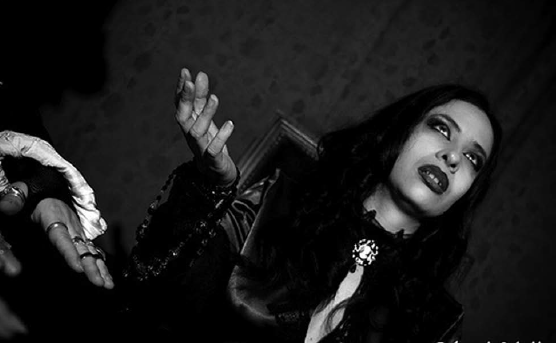
me for most of this, sans rosary
Physical Qualities:
- Living Furnace (Pyro): You're always warm and don't have to worry about blankets/the cold except for near freezing conditions. Also people can snuggle with you for warmth. This is it. This is the sole Physical Quality this book introduces.
-
Ashen Breath (Pyro): Breath mints, dude. -1 to Guile and Seduction rolls.
-
Draw Lightning (Electrokinetic): Every time the psychic uses their electric powers, there's a chance they will be struck by lightning. Indoors it's not a problem, but there's always a chance it will happen outdoors and during a storm they're guaranteed to be hit at least once. This never hurts the psychic (except for bruises from being thrown from the impact) but everyone around them has to make a damage roll with a +5 modifier, including allies.
-
Eidolon (Precog/Clairvoyant): Having a body suuuuuucks, not being in a trance suuuuuucks, fuck eating, fuck bathing, it's tiring being in a body goddddd I just wanna trance out and use my powers. The psychic can never have a Vitality more than 4 and can't have Gigantism or Light Sleeper.
-
Entropic Presence (Half-Lifer/Electrokinetic): You kind of just suck the life and heat out of the room. -1 to all Vitality rolls for people around you, -1 to all Medicine rolls around you.
-
Haywire: Galvanic and aetheric tech breaks or goes bananas around you within 10 feet. In times of high emotions, this increases to Willx3 feet.
-
Internal Lights (Electrokinetic): You glow! It ebbs and flows depending on your emotions and even your wounds spark/glow. It's easier to hit you in the dark and doctors operating on you have -2 to Medicine because of distracting lights and mild shocks.
-
Void Marked (Electrokinetic): You've been marked by your powers. You're either bald or have Bride of Frankenstein hair (but pure white) and it's hard for you to be expressive, so -1 to Charm rolls.
- Waking Fits: When waking up from sleep or a trance, spend 2d10 minutes in a epileptic fit. If not restrained or helped, make a 2d10-Vitality roll to determine how you hurt yourself from the seizure. NEVER TAKE THIS.
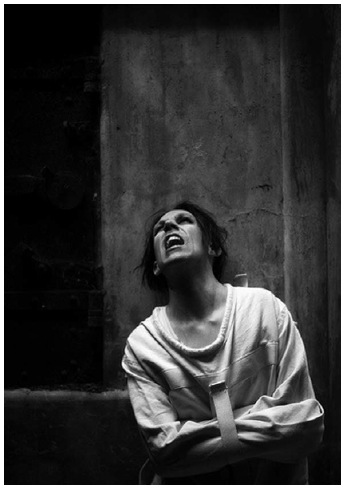
help i'm trapped in a bonus/drawback factory
Mental Qualities:
-
Dream Recall: Never have to make a roll to remember them. Yep.
- Emotionally Dead: YEP. Free reroll per failed Fear rolls, +2 to Will contest rolls, Empaths never suffer Empathic backlash.
-
Catalyst of Despair: Requires a Chronic Mental Disorder. Nobody around you can add Concentration to their roll for a Mental Disorder check and any psychics with Empathy, Prescience or Telepathy around you gain 1 Instability Point every time they use their powers.
-
Delamayn (Empath/Telepath): You're bored with people and with social stuff. Fuck all that noise and fuck being polite. -2 to Charm unless using a power to manipulate someone. When you're done using the power, DC 14 Will roll to not be overcome with disgust and revulsion at the people around you and possibly undo what you just did.
-
Reversion: Act like a child in times of stress. Fail a DC 14 Will roll and this is the pain in the ass the other players will have to put up with for 6d10 minutes.
-
Sexual Dysfunction: The equipment works but you can't get no satisfaction. DC 14 Will to not be disgusted in romantic/sexual situations, DC 11 if they're courting you already and you dig them.
- Timeless (Precog): What if Doctor Manhattan had dementia? The Precog has no sense of time anymore and accidentally lives out the past/future without meaning to. This is a really shitty impediment to take, but they explicitly say it's not dementia, just the psychic's mind is unable to sort through the continuous visions they have. -2 to Credibility rolls, -2 to General Knowledge rolls.
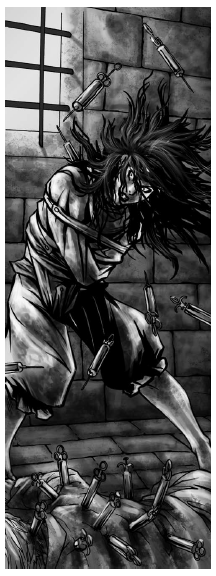
man, lot of art of women in this section
New Mental Disorders:
-
Agrypnia: Minor or chronic insomnia, depending on severity. If you haven't slept the five hours out of the last day, -2 to Wit, Intellect and Initiative. Sleep requires a sedative and control check to enter a light slumber and if awoken you must make another control check to go back to sleep.
-
Multiple Personality Disorder: Ohhhh boy. Comes in Minor or Chronic. Control checks to resist switching personalities in times of stress or duress. Fail and you have to wait d10 hours to try and take control again. Fail again and you have to wait d10 hours to try again. Fail again and yeah. Vicious cycle.
- Pyromania: Yup. Comes in Minor or Chronic. No sleep and -2 Intellect, Wit, Will, Charm and Skill not pertaining to starting a fire if you fail a control check. You can hold off with small fires, but it inflicts a cumulative -1 to the penalty for every day without a blaze to satisfy.
That's it for Chapter 2. A lot of those qualities are okay at best, a lot of those impediments are stupid to take and the new mental disorders don't really add anything new but they're there for the psychic players to pick from. There's not much to say about this part of 2, the character classes are much more interesting.
NEXT TIME: ALL ABOUT PSYCHIC POWERS AND OTHER BRAIN SHIT
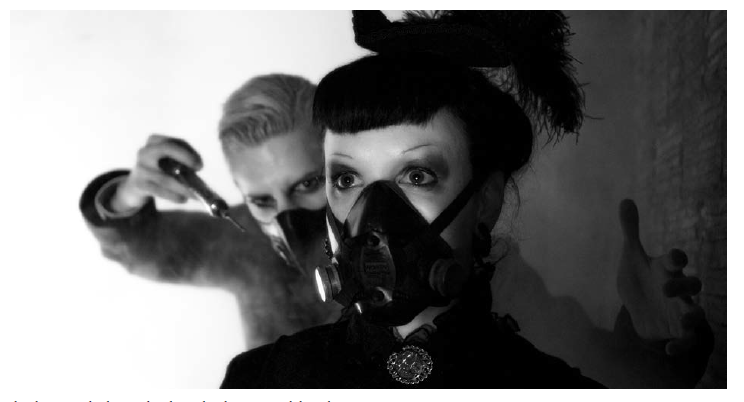
this isn't from chapter 3, it's from 2, but trust me: it's incredibly appropriate for a lot of the content in 3
CHAPTER THREE: THROUGH A GLASS DARKLY: PART ONE
Original SA post
CHAPTER THREE: THROUGH A GLASS DARKLY
PART ONE
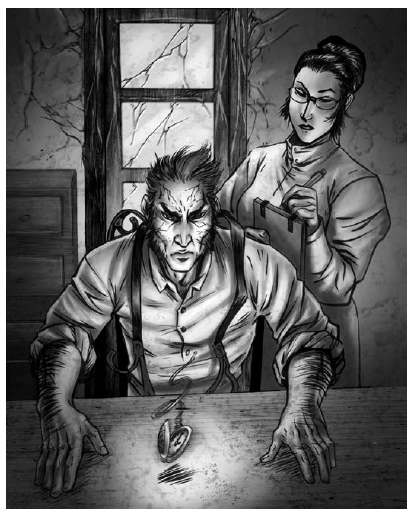
It is the duty of all proud, patriotic citizens of the British Empire to register if they have psychic powers. A lot don't, especially because you can lose your license. A licensed psychic has to fill out the proper paperwork to get ordained to use their powers for money followed by training and lessons. You have to reregister and get retested annually. However, most psychics only register one or two of their abilities and hide the rest because there's nothing requiring you to register ALL of your powers.
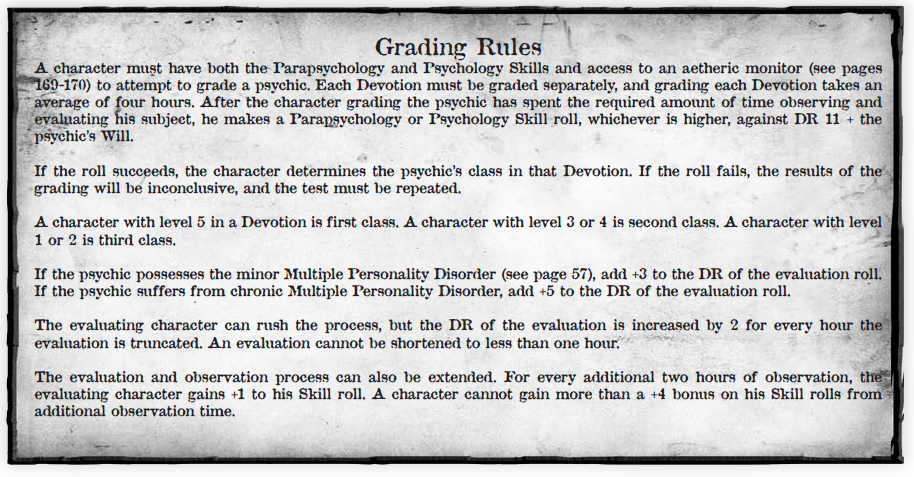
PSI LAW: Empathy and Telepathy cannot legally be used to dominate or influence people. It's two years of prison for minor nudges, ten of hard labor for fraud or contracts the influenced signs and surveillance/eavesdropping using powers is illegal (gathering sensory info isn't). These rules, of course, change if you become a psychic cop. Precogs are not liable for if their predictions aren't right, but intentionally misleading/lying is fraud. Psychokinetics are licensed weapons and are liable for the damage they cause but can still profit using their powers. And, of course, misusing your powers isn't illegal if you don't get caught but if the police see you they will ask for your license.
So what happens if you're caught and get imprisoned? You either go to prison and go to solitary or if you're especially unwell, you go to an asylum. You don't want to go to an asylum.
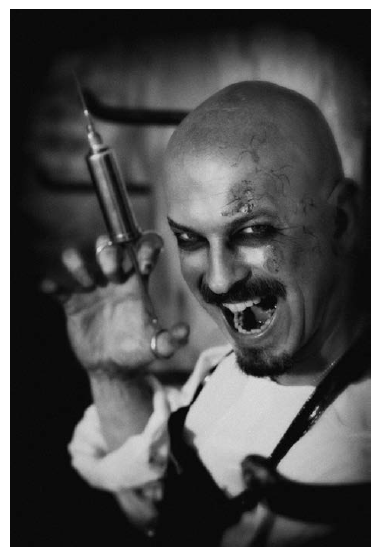
I told you.
Asylums suck. They're the personification of every horror game trope rolled up into a Cuban cigar wrapper of "suffering tends to induce psychic powers in the desperate". Most people with minor or mundane or "hopeless" cases get thrown out onto the streets with a scolding to make room for a psychics. The regulars and the psychics are kept separate with psychic captivity resembling supermax cells that can pump in gas. Psychics in asylums are experimented on, studied, poked and prodded and kept on a healthy diet of scop, sedatives and inhibitor drugs. If you can't be used for experimentation, develop a resistance to the drugs, try to escape too much or are too dangerous to be safely kept, you're lobotomized.
So let's say you're a talented enough psychic and you're willing to play ball with the law and they're willing to let you join the Psi-Branch. You don't actually have to be the best of the best to join Psi-Branch; the majority of them are Rank 2 or Rank 3 psychics. Psi-Branch is made up Psi Crime, Special Interrogation and Oracle. Psi Crime is the department that solves crimes using their assets (generally precognition and clairvoyance). Psi Crime has five rapid response teams made of up to four to six psychics who handle major problems beyond simple investigation. Special Interrogation uses telepaths to extract information from suspects and witnesses. Special Interrogation telepaths don't ever make an appearance in court (not like the worst criminals ever make it to court) and the project itself is a closely guarded open secret. Oracle tries to predict the future by using precogs and analysts but they're generally not very accurate. The most accurate thing that Oracle does is predict Lost Days (when the smog is so thick it can kill and reanimate a body in a minute) and print the info ahead of time. Despite that, it has the highest funding out of all of the departments. Alienists, Mediums and Parapsychologists can also find good employment in Psi-Branch if they're willing to support the main assets or work with the dead. The only people Psi-Branch will not employ are Empaths, considering them to be too unpredictable and believing that their powers influence and change police work too much.
PSYCHIC RULES
Let's talk about all the things that make psychics tick. For starters, your level in a Devotion gives you all the powers of that level and below (this system is also used for Second Sight). Sometimes when you use a power, you have to make a Control check which is a Will check with DC 11+Power Levelx2 (so 13, 15, 17, 19, 21). Success means nothing, failure means +1 Instability Point.
What exactly are Instability Points? They're how much stress and strain the mind of the psychic can take before their latent insanity manifests and they return to their old self, unable to use/control their powers properly. Your limit for points is directly equal to your Will score. Matching that amount is what's called a Breakdown and the player has three choices for how a breakdown plays out:
-
Temporary Insanity: Your Latent Insanity returns for 1d10 days (rolled by the GM and the GM is not supposed to tell the player how long they're going to be out of their gourd which is a dick move). When this period is up, the character is back to normal. You can't pick this if you're already undergoing Temporary Insanity.
-
Degeneration: Your Latent Insanity becomes permanent and you have to pick a new Latent Insanity.
- Chronic Madness: One of your active Mental Disorders becomes permanently chronic.
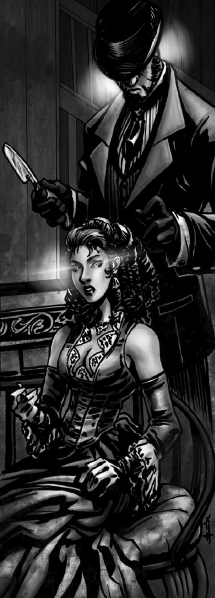
Trances are necessary for some abilities and requires one point in Concentration to be able to perform, automatically entered after five minutes of meditation in a peaceful environment. That's the ideal case, so of course there's rules for trancing under duress: Will rolls with a minimum DC of 11 and entering a trance becomes easier with something to focus on or sedatives. You can trance as long as you like but requires a DC 11 Will roll to exit one peacefully. If you're brought out by force, gain one Instability Point.
Finally, psychic powers have four aspects: a subject, a range, a trigger and a description. This is pretty much the same as the Second Sight powers except for the fact that a Psychic can maintain certain amounts of psychic abilities up to their Concentration skill stat.
That's the rules for how to track and use psychic powers and world fluff. So far, this has been a pretty boring, dry update. I don't even have much art to offer to spice things up. Let's do something different before we finish then. Let's see how hard we can break the system or at the very least game it.
First of all, there's a backwards compatibility issue I'm not sure the developers thought of when they made Concentration the bonus power skill for Psychics. However, what they've done with the first game (and have done since) is give you bonuses for every point in some skills besides "gun better". For example, every point in Rifles gives you one bonus ability to pick, like Night Fighter, Sniper, Headhunter or Trick Shot. This applies to Concentration: every point in Concentration lets you pick a little bonus. Some of them are quite good, but in the core game alone they're entirely situational because Concentration and trances weren't used for much. Let's take a look:
-
Compress Sleep: Get the equivalent of a good night's sleep with four hours of meditation.
-
Dull Pain: Reduce the penalties caused by wounds to skills and such by 1.
-
Focused Healing: Recover from wounds a week faster than normal with the help of trances.
-
Suppression: No physical side effects to going without sleep or food but you can still starve to death or go crazy, you just don't feel the distraction of the detrimental effects.
-
Thought Mask: One free reroll per failed Will rolls to resist external mental influence.
- Willpower: One free reroll per failed Will roll to resist addiction.
The bonus abilities of the Psychic class rely on being somewhat situational, unfortunately. You're not going to take Wrathful if you don't have those offensive powers, you're not going to take Mass Perception without a scrying-type power. Let's assume that we're playing a Psychic with 5 Will and 5 Concentration. Without even picking a main Devotion, let's choose the following bonuses for maximum cheese and gaming.
When it comes to Concentration bonuses, we pick Focused Healing, Thought Mask, Compress Sleep, Dull Pain and Willpower (because drugs are handy things, sadly). Now for class bonuses. First, Meditations so we don't get IP from getting shocked out of trances and getting in and out of a trance faster. Second, Sound Mind which reduces Temporary Insanity to one day only plus removes 2 IP instead of 1 when you rest. Mix Sound Mind with Compressed Sleep and you can easily flush out all of the accumulated IP over the course of a day and still have time left over. Or, if you want to engage in Maximum Cheese, trance for eight hours while everyone else is sleeping their required eight to be super rested and lose up to 4 IP. Third, take Force of Will; failing Control Checks with those other safeguards in place are the biggest source of IP and a reroll to help deny those means you've got less to worry about. More importantly, it helps keep Temporary Insanity much more manageable so you don't have to choose those worse options.
Now, unless you have other active Mental Disorders it's not worth taking Fortified Mind or Self Control because they relate actively to handling Mental Disorder rolls. Hanging out with the right crowd (coughanexorcistcough) will help protect the Psychic against any future mental disorders, leaving them with a latent disorder that they have created a system of control and prevention to manage. Your other two ability choices are just gravy and personal choice, depending on the type of powers you choose to take. You'll still accumulate IP, there's no bones about it because a good GM would test your limits and push you and account for your trippy mind powers. You're just much more equipped to flush and purge it with a good night's sleep. Aside from that, there's not a lot of ways to break the system besides taking Wrathful and cutting yourself every now and again to shoot lightning better. They only really excel at breaking the rules and restrictions imposed on them (as opposed to the Exorcist who does VERY well at breaking the actual game rules). That being said, don't take their ability to break the restrictions lightly; without worrying much about the pressure of IP they can use their powers all day every day if needed and in the hands of some of the more destructive psychokinetic powers this can be quite a tasty benefit.
NEXT TIME: THE ACTUAL POWERS, STARTING WITH EMPATHY
CHAPTER THREE: THROUGH A GLASS DARKLY: PART TWO
Original SA post
CHAPTER THREE: THROUGH A GLASS DARKLY
PART TWO
Empathy: Empaths can't read minds but they can influence emotions and glean information from how people respond to emotion. Empathy is a power you can't legally profit off of and (as mentioned previously) Empaths can't be police officers due to the possibility of tampering. Most Empaths of London are content to hide their abilities and, if they do use them, use them as grifters or con-men or gold-diggers. It helps that it's really hard to prove empathic influence in a court of law. Empaths are supposed to be tragic characters in the game, ruled by their uncontrollable emotions, have "a perceived deficiency of character" and unable to touch another person without problems. It's mentioned that it's common for Empaths to be sexually attracted to vampires due to their limited emotions and many Empaths have a Desire Corruption.
Empaths have some extra rules in place. First, unless the power says otherwise, they can't use their powers on animals. Second is a rule I highly dislike: critical failures with Empathy are horrific failures and critical successes go way too far in the direction of success. Empaths also suffer from Empathic Backlash (if you didn't take Silence, which prevents this from happening so why didn't you take it). Empathic Backlash means that an Empath with a power stat of 2+ is subject to feeling the worst of negative emotions any time they're in close proximity of half-lifers, humans or spirits feeling strong emotion. What this translates to is that they have to make a Will roll with a DC of 11+highest Will of character around them in the group and if they fail they take damage. This is bumped up to +2 DC if they're touching someone. Just take Silence, this is a stupid rule. Finally, Empaths get +2 to the Empathy rolls if they're touching the person they want to influence.
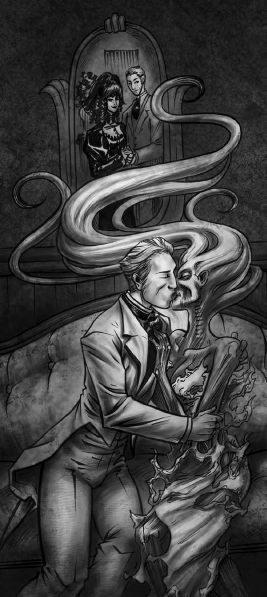
Would you smooch a ghost?
LEVEL ONE
- Empathic Bond (self, self range, passive): the Empath can feel when a loved one/acquaintance is experiencing high emotion or dies. They can instinctively feel this regardless of range but can't tell anything else. Death gives the Empathy 1 IP, emotion makes them make a control check. You're supposed to figure out who falls under this with the GM before play and make more as you play but why would you take this? This is just here to punish the Empath or make life harder for them because it can only tell you emotion or death, there's no practical use for this power at all. Never develop this, ever.
- Ingratiate (single target, touch, maintained): Light charm, helps put people at ease around the Empath but does not change what they know about them, only how they feel at the moment. Will contest to initiate: if the defender wins the Empath gets +1 IP but if the Empath wins they get +2 to all Charm rolls as long as they're within arm's reach of the Empath. It doesn't need to be maintained if they're within that distance either. This power affects animals to boot.
- Read Emotion (single, Willx10 feet+LOS, maintained): The Empath can read emotions of people or animals and know what they're feeling but not necessarily why they're feeling it. Will contest: nothing happens if the Empath loses but if they win they get one free reroll per failed Charm or Psychology rolls against the subject as long as they're in range. Plus, this power can be used to tell if someone is possessed or not. Don't use this power on people with a Chronic Mental Illness or Corruption 4+in any track or ghosts because that leads to a control check.
- Empathic Scan (group, radius Willx10 feet, maintained): Group Read Emotions, carries all the same restriction and rules of Read Emotions. This also has another benefit, though: you can pick up people you can't see and get a vague sense of where they are which is super handy for trying to find hidden people.
- Lie Detector (single, Willx10 feet+LOS, maintained): Will contest with the stakes being +1 IP on a failure or automatically knowing if a subject is lying. The power lasts as long as the Empath wants as long as they can hear the subject's voice and the Empath is within the proper range.
- Subtle Manipulations (single, Willx5 feet+LOS, maintained): Will contest, +1 IP vs. being able to influence the subject's emotions. The Empath can make the subject automatically fail a second Fear roll if it's a reroll, make the subject beat a Will DC of 11+Empath's Will to not fly off the handle and attack something they designate or just plain change the magnitude and direction of their emotions. As long as the Empath is within the range of the power, the subject has -1 to Will and Charm rolls. This also works on animals.
- Bedroom Eyes (single, LOS, maintained): Seduction through direct eye contact and a Will contest (the subject gets +2 to their Will roll if they would find the Empath gross under normal circumstances). Failure means +1 IP and success means that the subject is romantically infatuated with you. The power lasts as long as it's maintained or if the Empath hurts the subject physically/mentally, at which point the subject can break free on a Charm vs. Will roll.
- Heart Strings (Single, thought): The long-term equivalent of Bedrooms Eyes, Heart Strings requires the Empath to spend significant time with the subject AND for the subject to be sexually compatible with the Empath. After a hour with the subject, the Empath can make a Will contest roll: 1 IP vs. 1 point of fondness. The Empathy must accumulate fondness points equal to the subject's will, but can only do this once per day and any interruptions before it's complete sets the process back to zero. When completed, the subject is completely infatuated with the Empath and wants to be around them at all times, giving the Empath +2 to Will and Charm rolls against them. This will last as long as the Empath is around the subject and pretty much nothing can break the spell. To be freed, the subject has to be away from the Empath for a number of months equal to the Empath's Charm stat. Even then, they will be fond of the Empath unless it's abundantly clear that they were taken advantage of.
- Provocation (single, Willx10 feet+LOS, maintained): Will roll with stakes of +1 IP vs. the subject becoming violently unstable. If it succeeds, the Empath just needs to maintain it and be around the subject. Once a minute, the subject has to make a Will DC of 11+Empath's Will with a failure resulting in the subject going on a violent rampage, especially if someone is provoking their ire. This works on animals too and will last until the Empath shuts it off or the subject is restrained.
- Grip of Fear (single, Willx10 feet+LOS, maintained): Works on animals, 1 IP vs. the subject being absolutely paralyzed with fear until released or they take damage.
- Mass Hysteria (group, radius Willx15 feet, maintained): Pick an emotion and hit a group with it, causing separate Will contests with everyone in the group. As long as the emotion isn't too complicated, it can affect animals too.
- True Emotion (single, Willx10 feet+LOS, thought): Like Heart Strings but with a true emotion that will last a lifetime without therapy: fear of bacon on salads, love of interpretive jazz, anger towards horses, lust for Prussian Sky Pirates.
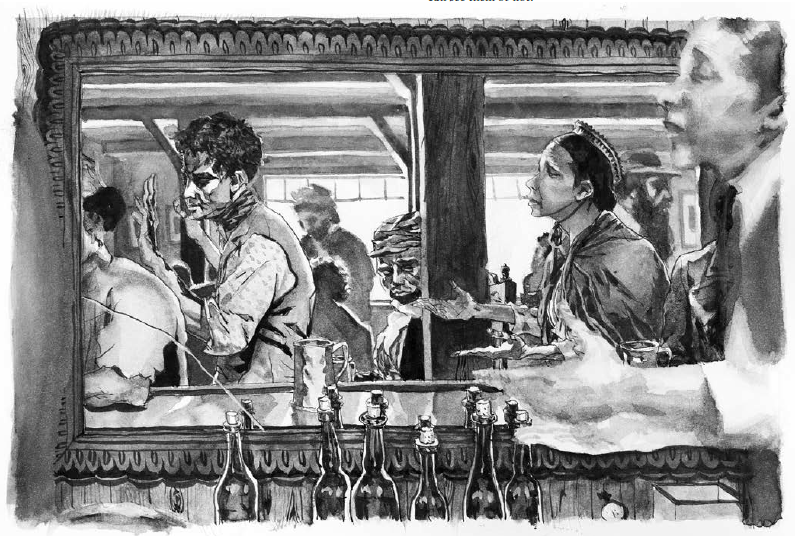
I have no idea what this has to do with Empathy or why it's in this section really.
LEVEL FIVE
- Dominion (group, radius of Willx200 feet, maintained): Mass Mass Hysteria. You know what's a really, really shitty design choice? Individual Will rolls per subject and you can only choose to not affect people you can see with a control check. The Empath gains +1 IP every time they intentionally use this ability, it causes animals to flee the area in a panic and there's no way the cops aren't going to show up and investigate why shit just got weird.
- Heart Stopper (single, Willx10 feet+LOS, thought): Will contest, save or die. If the Empath wins, the subject dies from heart failure or aneurysm. If the subject wins, the Empath gains +1 IP but the subject has to make a DC 11+Empath Will fear roll and is permanently afraid of the Empath for the rest of their life, installing a +2 to Intimidation against the subject.
- Soul Searcher (single, LOS, passive): Will roll for anyone you see to get one free reroll per failed Torture, Charm or Psychology because the Empath can read how anyone will react to any emotion or stimulus and how they're feeling.
Extrasensory Perception: Psychics with ESP are called clairvoyants and their power isn't a sharpening of the senses but a honing of the mind. Or so the book says; in the next breath it says that ESP can replace lost sight or it can augment existing senses to pick up new things, but for the most part ESP is an entirely new sense. London's psychics are generally voyeuristic with a predilection for Drive or Desire corruptions and it doesn't help that they can't legally use their powers to spy on people (unless you're a cop and even then there's limits). It's not uncommon for a psychic to blind themselves in a misguided belief that this will enhance their powers or have trouble reacting to stimuli properly (overreacting to distance noises, not noticing a gun going off by their ears).
ESP has its own special rules. First, the powers don't affect animals unless they say they do. Second, just take the stupid Split Perception ability. Otherwise, every time you try to use certain powers while maintaining other powers, you have to make a Control check with a DC of the highest power you're using. On top of that, you get -1 to all Wit rolls per maintained power. Fail and you gain 1 IP and drop all the powers you're currently channeling. So just take Split Perception.
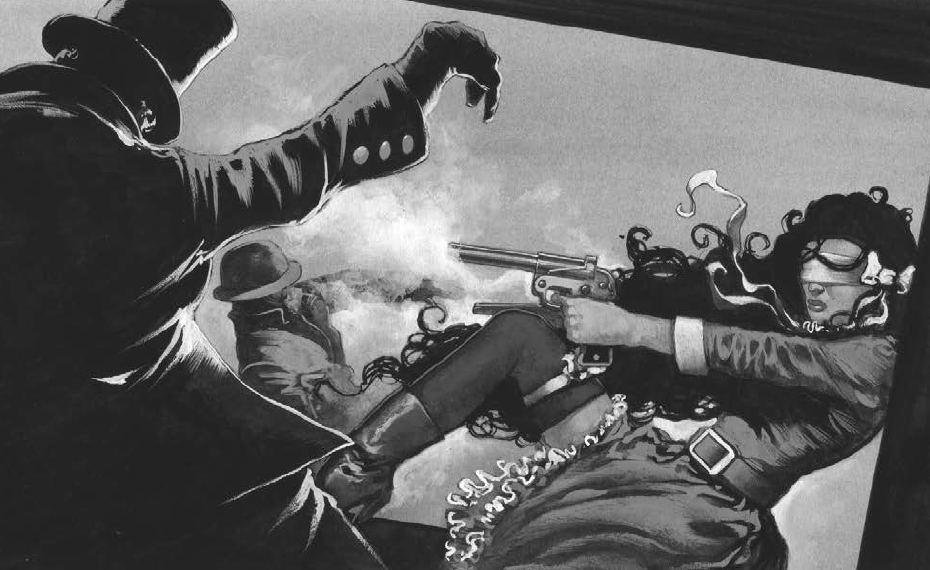
Your Stand, with a gun.
LEVEL ONE
- Psi-Senses (self/self/passive): Plot/Detective Vision. The psychic's vision is augmented with plot important things, lost items, clues and hidden objects glowing faintly. One free reroll per failed Perception roll. Not bad, all things considered.
- Sense Presence (single, Willx10 feet radius, thought): You can sense if a subject has been in the area recently. You either have to know them or be able to accurately visualize them. There's a variable DC, but failure means 1 IP and it automatically fails if the subject has not been there. Also using this on someone with 4+ Corruption or Chronic Mental Disorders forces a Control check because you're tracking people by lingering thought patterns.
- Teleperception (self, Willx10 feet, maintained): Throw one of your senses by projecting it to a specific point. Blind psychics can see, deaf psychics can hear, hungry psychics can try that chocolate cake without buying any. Maintaining more than one sense in one area or in general requires splitting perception.
- Aura Sight (single, LOS, maintained): Aura Sight doesn't need a dice roll and can just be used whenever. You can use it on as many people as you want to at once and using it gives +1 on Charm, Interrogation, Perception, Torture, Medicine, Parapsychology and Psychology rolls against the subject. It can also be used to see the auras of animals, tell the psychic if the subject is using a psychic power (but not which) and can be used by blind psychics to see aura outlines and use powers that would require line of sight.
- Darklight (self, LOS, maintained): See in the dark. The world may still be dark but everything item in it is defined by a grey-gold glow. You can't tell color, but you can read in the dark or a blind psychic could maintain it to "see" again.
- Psychometry (single object, touch, maintained): Read psychic impressions left on items. Beat a Will DC (variable, failure inflicts 1 IP but can be tried again) to get a clear picture of the last person to handle the item. While Psychometry is being maintained, other powers can be used to read the person in the vision (like Aura Sight or Read Emotion). The more powerful the psychic stain left on an item, the easier it is to view the wielder and sometimes the psychic might have to make a Control check.
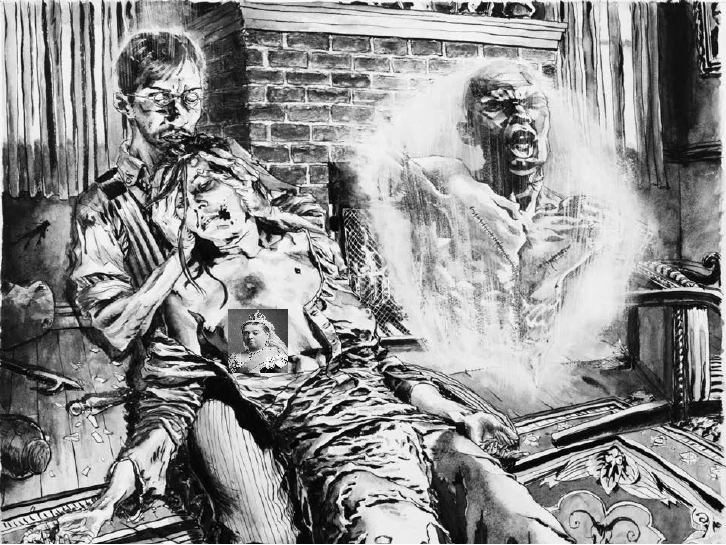
Spoilers: there are zero powers that will let you figure out who killed a person by touching the body.
LEVEL THREE
- Minor Clairvoyance (self, Willx150 feet, maintained): Trance out and throw your senses into a place within that effective radius. The psychic perceives the area as if they're standing there and can use further powers to read people or the world around them. This can be used on multiple locations at once but again: make sure you have Split Perception.
- Psi Tracker (single, variable, maintained): Use Sense Presence to find a subject then use Psi Tracker to retrace your steps. If the target has gone through a populated area, it'll take a Wits roll to keep the trail.
- Telelocation (single object/animal, Willx5 miles, maintained): Find specific objects by focusing on them. The power won't tell you the precise location, but it will tell you the direction and roughly how close you are to the object. The power works best on items the psychic has touched, has a photo of or has seen in the mind of someone. First, the psychic must trance out and beat a Will DC (easier if you've touched the object) to discern if the object is within the radius and figure out its direction. Failure results in 1 IP and a headache. If you want a specific location, you can grab a map and make another Will roll to pin-point the location. Telelocation will also tell the psychic if the item is moving, how fast it's moving and in which direction it's moving.
- Aura Scan (group, LOS, maintained): Like Aura Scan but on a group of people automatically.
- Major Clairvoyance (self, Willx10 miles, maintained): See further as per Minor Clairvoyance.
- Photospheres (group, LOS, passive): Photospheres are literal thought bubbles that appear when a psychic reads someone's aura. They give insight into a subject's thoughts, beliefs and soul. Seeing a subject's photospheres gives the psychic one free reroll per failed Charm, Psychology, Parapsychology, Torture or Interrogation rolls.
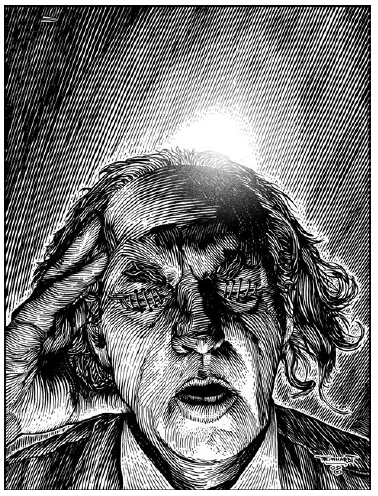
ESP gets a lot of art.
LEVEL FIVE
- Astral Projection (self, limitless, maintained): Eject your spirit from your body in a trance and explore the world. Clairvoyants of this magnitude are endlessly useful to London by watching important areas or carrying messages. The psychic can travel hundreds of miles in minutes, but it helps to want to view someplace you've been before. However, there are some pretty heavy rules. First: the astral body can be acted on or detected by Telepathy, ESP, Empathy and Prescience. You can also be seen with Second Sight and you can be treated like a spirit. Third, you gain 1 IP per use of power. Fourth, and most importantly, there are some places you can't view:
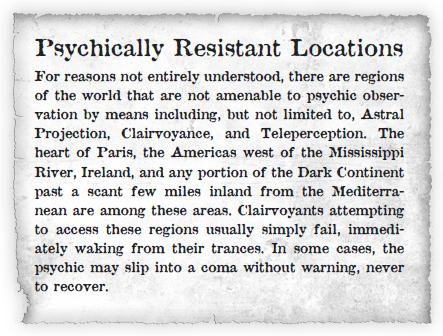
See the world, except when you can't because GM fiat/developer fiat.
- Revelation (self, Willx500 foot radius, maintained): Sense people as they come and go around you, and by people I mean everyone. This can be used in lieu of line of sight for certain powers.
- Seeker (single, limitless, maintained): Improved Telelocation. Seeker can be used on people now, but it's harder to use on people and it can't be used with a map to pinpoint people. The best it can do is point you in the direction and give you a sense of how close you are.
Thoughts on Extrasensory Perception: Like many powers or spells where the PCs are able to just gain info with a snap of their fingers, ESP can break things quite a bit. The progression is pretty good, though, and I would honestly say that it's worth sinking the extra points into starting with level two. You do start off with a very good kit of tools from level one alone. ESP lends itself very well to stories about investigation and you're going to be using a lot of your powers over and over. It's also not a set of powers that carries a lot of IP risk which is handy, but taking the ability to increase the range of your powers is absolutely necessary. I'm not happy with the hindering of Astral Projection, though. If you can't project over places that are too corrupted with the rotting of the planet, that means there's a lot of places you can't visit easily. France makes sense, but most of Europe/East Europe/Central Europe? I know you're not going anywhere near them because the mechanics of this game assume you're focusing ONLY on London, but that's a really lazy way of stopping your players from getting more information about the world. Revelation is also somewhat weak as a capstone and at least Seeker will let you follow people now.
NEXT TIME: Seeing the future (protip: do not do this) and reading minds (protip: reach out and touch someone).
CHAPTER THREE: THROUGH A GLASS DARKLY: PART THREE
Original SA post
CHAPTER THREE: THROUGH A GLASS DARKLY
PART THREE
Prescience: The game describes having Prescience powers as being "a living nightmare" so there's that. The majority of precogs who aren't working for the cops end up becoming hermits or cult-leaders or con men. A licensed psychic can in fact make money off of prescience and they're not liable for their predictions not coming true unless they out-and-out lied to the customers. It's a lot safer and a lot more financially stable to just join Oracle and become a weatherman.
Precogs have no special rules but it's not uncommon for them to need some sort of focus for the powers they have control over (and a lot of their powers they can't control). Some of the more nasty drawbacks are related to Prescience though and the game says it's pretty common for long-lived precogs to develop ennui, nihilism or dementia.
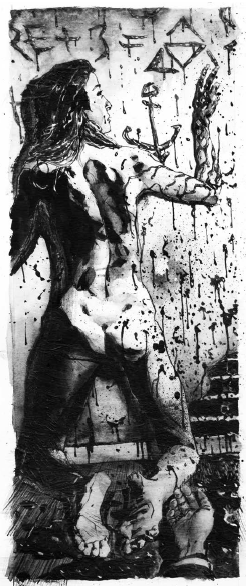
I would make a joke but this is just feels exploitative.
LEVEL ONE
- Flashes (single, touch, passive): The precog has no control over this power. Poke someone, get a premonition in the form of a flash, an emotion or a few words. Touching people with high Corruption forces a control check.
- Premonition (self, self, passive): Get one or two premonitions per session whenever the GM feels like. The precog has no control over this and really bad premonitions force a control check.
- Sixth Sense (self, self, passive): +1 to Initiative, any surprise attacks against you automatically miss before proper combat, any attacks against you while you're asleep will wake you or make you toss to make it miss.
- Awareness (self, self, passive): On its own, you always know when you're being watched. Alternately, the precog can focus for a minute and beat a Will 16 DC to pinpoint where the watcher is within Willx50 feet. This can also be used to detect undead.
- Portent (one topic, self, thought): Trance for five minutes after picking a subject then make a control check. If you succeed, you get a good or bad feeling about the topic. The precog can then make a DC 16 Wit roll to try and glean a little more information.
- Uncontrolled Vision (one topic, self, passive): The GM can force you to view visions without warning. They are generally vague and distracting and the precog may see something completely unrelated to what they're currently doing. The precog can make a control check to try and shut down the vision if they don't want to see it (or if the GM is a dick and hit them with a vision in the middle of combat).
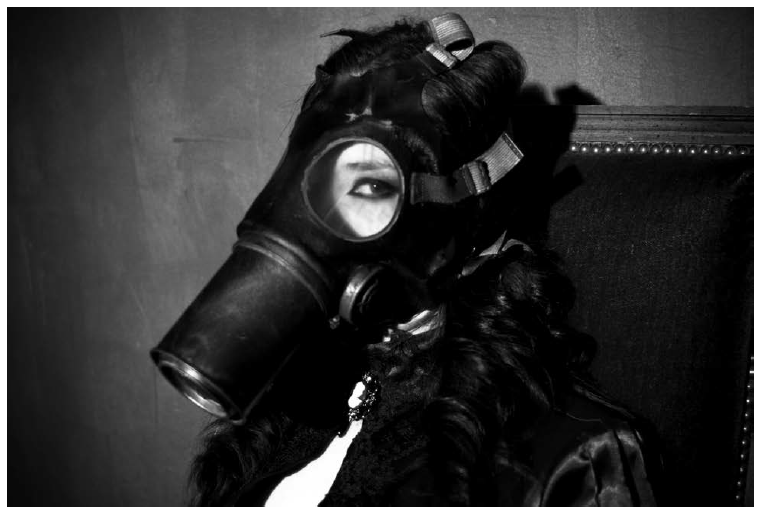
Put your keyboard on the floor. Put it down as flat as you can. That's good. Now I will move your keyboard by power of my will alone!
LEVEL THREE
- Augury (self, self, maintained): Trance for a hour and make a control check to gain a vision on a topic of choice. It's like Uncontrolled Vision but you're actually seeking the vision.
- Future Sight (self, self, thought): Make a control check. If it succeeds, the GM will narrate the most likely events of the next five minutes. This can be changed or altered by the precog's actions or the info might be wrong or misleading.
- Guided Hand (self, self, maintained): Turn the power on a pick a skill then get one free reroll per failed roll for that skill as long as it's maintained. I don't see anything saying you can't pick a combat skill.
- Pathfinder (self, self, maintained): The precog can enter a waking trance that will allow them to fulfill something the player describes to the GM. This can be something like "find a secret exit", "pick the right wire to cut" or "walk me through the slums without getting mugged". The precog moves like a sleepwalker while it's active, gains +3 to Leaping and Climbing , is immune from outright harm due to GM fiat and will sidestep or wait out hazards like Mr. Magoo. The trance automatically ends when the goal is achieved or they can try to roll out of it.
- Preternatural Reflexes (self, self, maintained): While the power is active, the precog can dodge and parry BOTH melee and ranged attacks, reroll their Initiative or get one free reroll per failed Coordination roll. How do you parry a ranged attack? I imagine you grab something with a flick of the wrist like Jackie Chan would.
- Retrocognition (self, self, maintained): Focus on a person, place or thing to gain information. This works better if you've touched it/them, met them or been there or if they're present/you're at them. The info is vague or incomplete and there's a lot to sort through, but you will get urgent/immediate/powerful info quickly. Also don't use this power on someone with a high Corruption unless you want to witness their personal history of atrocities.
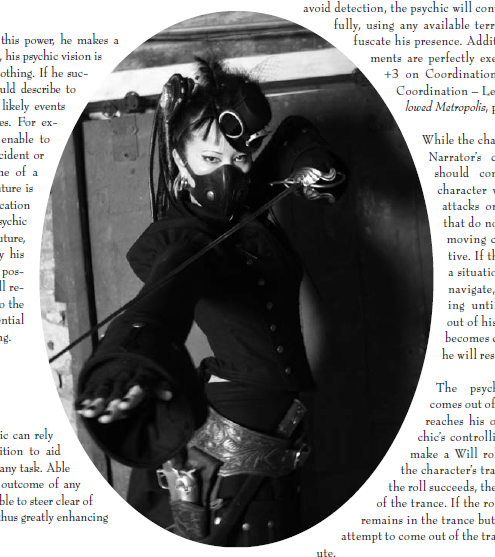
LEVEL FIVE
- Dreamshaper (group, Willx3 mile radius, thought): The precog mass-broadcast a psychic vision to people around them in that radius. The normal version only targets other precogs but you can eat 1 IP to target EVERYONE. The precog also automatically passes down any huge visions they receive to every lesser precog around them, but only in facets or broken pieces.
- Fate Weaver (self/self/thought): The precog can use their own Second Chances and Devil's Luck for any dice roll or any situation or for another character's benefit. This is a reference to a mechanic I don't like from the whole game: you get Second Chances for certain rerolls equal to your highest Corruption rating, and you can use Devil's Luck to increase your Corruption by 1 if you're out of chances and you're up shit creek. It's a badly implemented knock-off of Warhammer's Fate Points and they exist because your characters are all inherently corrupt and Byronic hero etc. etc. I sincerely apologize that the description for this power ended up becoming a rehashing of the mechanics because I sincerely didn't remember how they worked.
- Prophecy (one topic, self, thought): Visions forever whenever without needing to trance. The precog's visions are still incapacitating but if you keep using the power on the same topic, you'll get pretty much the same vision to allow yourself to get more details and a more clear image. Using this power costs 1 IP point.
Thoughts on Prescience: A lot of the passive powers are unreliable and uncontrollable and that's kind of not fun, especially when the GM is in control of whenever you get visions. There's also the fact that you can still use minor powers when you have a higher level, so you're still beholden to GM visions whenever. Prescience also doesn't seem like an Instability intensive set of powers, but failing control checks gains IP and there's a lot of control checks you have to make to shut the visions off. Force of Will is mandatory for IP management for precogs. Aside from that, I like some of the powers that aren't just "get vision". The precog can be an effective fighter or a skill monkey whenever you need them to be and I appreciate the versatility beyond just seeing the future. The capstones aren't very good. Dreamshaper is nice from a RP perspective but it's just going to get you in trouble, Prophecy is okay and Fate Weaver gives you rerolls for anything but oh man is that a limited pool of dice you don't want to increase.
Telepathy: Victorian telepaths are people with trust issues because they know what you're thinking and it ain't always pretty. Most telepaths keep to themselves or to their own kind, most work for private clubs or clients or the police. The aristocracy tends to stay the hell away from telepaths because pretty much every bloodline is host to horrible secrets and bizarre pasts, so telepaths are generally not allowed in higher society. They live quiet lives of silence and work and really stand out as a result, even considering the nature of Neo-Victorian London. On the plus side, you can totally use your powers for money as a courier or with the authorities, just don't steal info on your own.
Telepathy has some extra rules. First, using them on anyone with a Chronic Mental Disorder or Corruption 4+ gets you 1 IP. Second, telepaths are immune to the powers of other telepaths who are lower than them in power (unless they permit them to use them). Third, touching someone you're using your powers on gives you +2 to the roll. However, touching people is risky. It forces a Will save where a failure is 1 IP and a success is brief flash of what the other person is thinking. You can automatically pass this roll with Silence but you won't get that flash of vision, so opt out of that when you need to. Otherwise, Silence is a handy class ability to have.
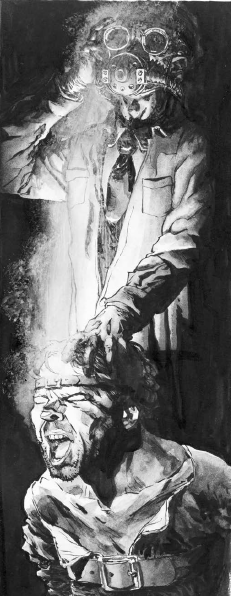
I don't think you need be able to read his mind to know he wants you to stop touching him.
LEVEL ONE
- Distraction (single, Willx5 feet+LOS, maintained): Contested Will roll where failure is 1 IP and a success lets you distract the subject with some kind of phantom stimuli. This can be something out of the corner of their eye, the urge to go to the bathroom or a whisper in their ear but nothing that shuts down a sense completely. The victim can't add Concentration to Will rolls and gets -1 to Perception rolls; the telepath can maintain this as long as they want without line of sight once it's on.
- Silent Voice (single, Willx5 feet+LOS, thought): Broadcast ten words or a simple image to someone's head. The words can be heard aloud in their head. The subject can resist the message, which forces a Will roll where success gets it across and failure gives the telepath 1 IP.
- Thought Reader (single, Willx5 feet+LOS, maintained): Skim the mind of a target but you can't go any deeper than that. Requires a Will contest, 1 IP vs. success. This can also be used on ghosts but the telepath always gets 1 IP. As long as it's maintained it doesn't need to be line of sight and the telepath gets +1 to Charm and Psychology against the target. Should the target attack, the telepath gets +2 to dodging or parrying their attacks. That's a nice little bonus.
- Mind Scan (group, Willx10 feet radius, maintained): Mass Thought Reader, has most of the same rules. However, should the telepath not have Silence, they will gain 1 IP for every minute it's active. They can only focus on one mind's thoughts at a time but switch to another mind for free, plus the telepath can feel where people are if they can't see them. Will contest of the telepath vs. everyone where failure just means the telepath can't read that person.
- Pain Induction (single, Willx10 feet+LOS, maintained): Wrack the target with excruciating pain that does no lasting damage. Will contest, success vs. 1 IP. Success inflicts -2 to Attribute, Initiative and Skill rolls as long as the telepath maintains it.
- Thought Transfer (single, Willx10 feet+LOS, maintained): Speak/send messages remotely back and forth between the telepath and the subject. Doesn't allow mind reading or thought viewing, just whatever is sent. It can be used on ghosts at the cost of 1 IP. Should the subject move out of range, the link is broken.
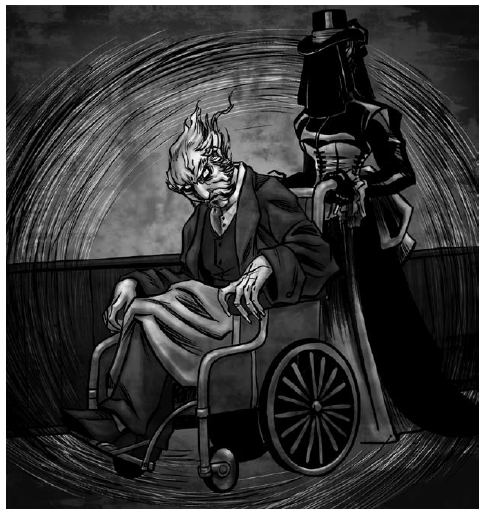
Oh hey Professor X.
LEVEL THREE
- Conduit (group, Willx15 foot radius+LOS, maintained): Group Thought Transfer with maximum participants equal to the telepath's Will.
- Memory Suppression (single, Willx10 feet+LOS, thought): First, the telepath must contact the target's mind (use Thought Reader at the very least, Mind Scan, Cognivore, Omniscience or Thought Reader work too). The telepath can then make a contested Will roll, success vs. 1 IP. If successful, the telepath can edit or remove the details of up to one minute of their memory. This can be hella illegal and abused so don't do that, I guess.
- Psychosomnia (single, Willx15+LOS, maintained): Will contest, success or 1 IP. A success means the target is put into a deep sleep and can't be woken until the power is no longer maintained. If the power is cut off, the target sleeps normally for 1d10 minutes and will then awaken. The book notes that Psychosomnia can be used instead of anesthesia for medicine which I would imagine would be really handy for gutter surgery.
- Cognivore (single, Willx5 feet+LOS, maintained): Will contest, success vs. 1 IP. On a success, the telepath can dig through the mind of the target to bring up specific memories. If the target resists, the experience is painful and terrifying and causes -2 to Wit, Intellect and Skill rolls while it's active and for a hour after. The experience will often cause the target to try to fight back or escape, so restrain them first. If the target allows it to happen, the experience feels weird but there's no pain or downsides. The power lasts as long as it's maintained, and it may take a while to find the memory you're looking for depending on how old it is.
- Overmind (single, Willx10 feet+LOS, maintained): Will contest, save vs. 1 IP. If successful, the telepath will forcibly take control of the target and control their body. The target can be forced to take the actions the telepath wants (double their Will for the resistance if the actions are suicidal/dangerous), the telepath can shut off the target's senses, the telepath can make the target experience vivid/realistic hallucinations or they can make the target do something the target knows how to do. The target has -3 to all Attribute and Will rolls while controlled, so they can't do everything.
- Psychogenesis (single, Willx10 feet+LOS, maintained): Hooboy. Psychogenesis requires the telepath to fully map out the mind of a subject for no less than 8 hours using Cognivore. Everything this power does will most likely be permanent and depends on what the telepath wants to do and requires a Will contest (success vs. 1 IP) when it begins. Psychogenesis can be used to: cloud/bury memories (in the form of lost time/amnesiac episodes), manipulate/create new/delete memories (which can be linked to a trigger to make them remember/forget but deleted memories are gone), implant commands, mental stabilization/destabilization (which can also be linked to triggers) or implant a secret message (requires a trigger for them to get it). This power has the potential for abuse or it can be used to get people back into a safe state of mind.
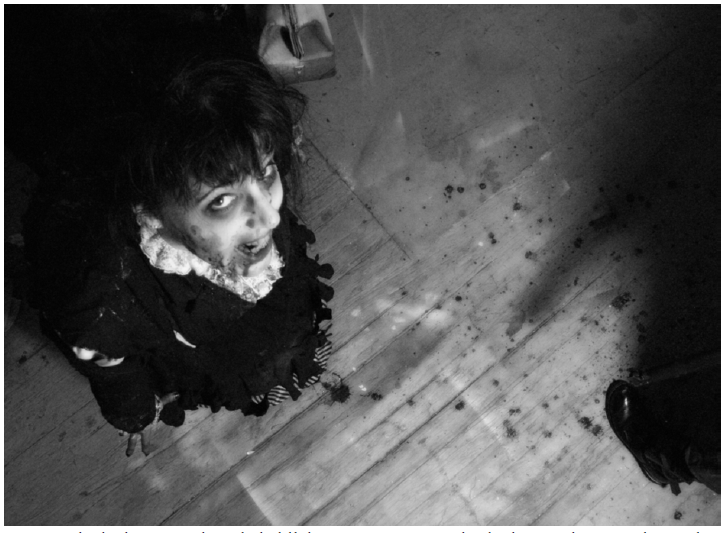
?????
LEVEL FIVE
- Mind Slave (single, touch, maintained): Will contest, where no matter what the telepath gets 1 IP. Mind Slave shunts the personality and consciousness into the target's body and leaves the telepath's body in a coma. While in the body of the target, they are suppressed and can't stop themselves from following the telepath's commands. When ridden, the body uses the telepath's Wit, Intellect and Will, the body's Vitality and Coordination and an average of their Charm. People may notice the body is acting odd and Clairvoyants can see two auras in the same body. If the telepath loses concentration, sleeps, is made unconscious or if either body dies, the target regains control.
- Omniscience (group, Willx200 feet, passive): The telepath starts to influence people who spend long periods of time around them, knowing when people leave or enter the radius. They will pick up small traits of the telepath and the telepath can use Thought Reader on them at will or borrow their senses or use other powers on them as if they could see them.
- Puppet Master (group, Willx50 feet, maintained): The telepath can use Mass Pain Induction, Psychosomnia or Overmind. This targets everyone around them, including allies, unless the telepath can see them and makes a control check.
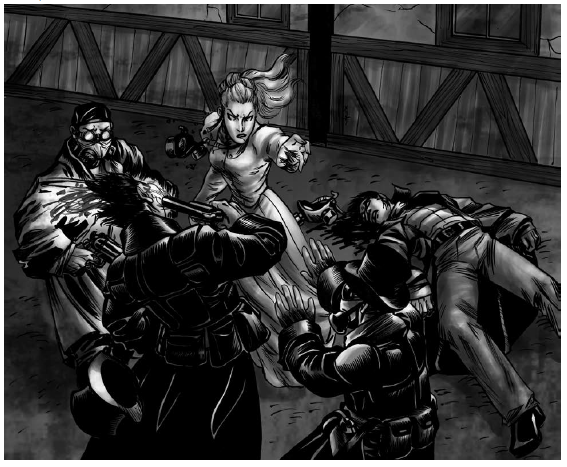
Heck yeah.
Thoughts on Telepathy: Telepathy is a nice grab bag of powers that can pretty easily fall into uncomfortable territory unless the players take action to not go there. The whole set is a good mixture of investigative powers, debuffs and group communication abilities. The capstone powers continue to not be totally good/worth it. Mind Slave is a really good way to impersonate someone for a little while, but it's a borderline abominable act. Omniscience would be a lot better if it didn't have the caveat that the personality of the telepath bleeds into the minds of people around them. Puppet Master is by far the best because it's very versatile for group control; the sleep ability is an excellent way to shut down enemies or problems, group Pain Induction is a nice debuff and while it probably wouldn't work to command everyone to kill themselves, it's a lot easier to tell them to shoot each other. Telekinesis is a very IP-intensive power set, so management is important; pump up the Will and Concentration.
We have officially moved past the predominantly investigative/social psychic powers, which means that NEXT TIME, we move onto the three Psychokinetic power sets: Electrokinesis (Shocking Grasp), Pyrokinesis (Burning Hands) and Telekinesis (Bigby's Magic Hand).
CHAPTER THREE: THROUGH A GLASS DARKLY: PART FOUR
Original SA post
CHAPTER THREE: THROUGH A GLASS DARKLY
PART FOUR
PSYCHOKINESIS: Psychokinetic abilities (Electrokinesis, Pyrokinesis and Telekinesis) are more noticeable, physical psychic abilities and follow different rules. First, most of them require the psychic to make a ranged attack using their Wits. They can't use Combat abilities with their powers but they can use other powers to see their enemies where they normally couldn't. Second, psychokinetic powers can affect the dead unless otherwise noted. Third, be prepared to make a lot of control checks. Finally, most psychokinetics can't find gainful employment due to their naturally destructive abilities, but they're a considerable ally to criminals, anarchists and Deathwatch.
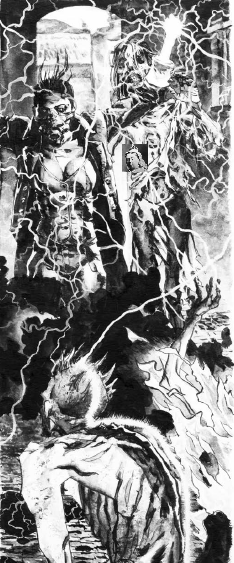
Vicky is covering a zombie titty.
Electrokinesis: Electrokinetics are walking, talking aetheric generators, capable of powering galvanic weapons and aethertech with their bodies. They're considered to be the most calm and stable of psychokinetic psychics, developing an interest in space, math and science while keeping their bodies and minds fit and clean. Some gain a fear of entropy and gain phobias of the dark.
There's one big rule for Electrokinetics and it's an enormous pain in the ass. A lot of their powers run the risk of causing temporary blindness from flashes of light. Anyone looking at the psychic or the target (and this includes the psychic ) is blinded for 1d5 rounds. The psychic can close their eyes and fire blind at -4 or the psychic and their friends can wear photo-reactive goggles. Other characters can be warned ahead of time that the flash is coming and can close their eyes. Either way, it's a giant annoyance but handy for dealing with human enemies.
Finally, a note on electrocution: electrocution has its own damage table. It ranges from "cooked alive" to "muscle spasms" depending on how severe it is. It doesn't do any long-lasting damage like certain complications (disembowelment) but it does bypass armor, so that's nice.
LEVEL ONE
-
Bio-charger (multiple items, touch, maintained): While maintained, the psychic can use their own energy to power galvanic devices (completely bypassing their batteries and power sources) or the psychic can recharge batteries by touch over the span of a minute or longer.
-
Electromagnetism (self, Willx3 foot radius, maintained): The psychic can generate an electromagnetic field that can repel or attract metal objects. Be careful of small objects rocketing towards you at rapid speeds. When the field attracts, the psychic gains +3 to climbing metal surfaces. When repelling, everyone in the area risks being pelted by small metal objects with a +1 damage roll and any attacks by a metal weapon/projectile give the psychic +1 armor for the whole body for resisting the attack.
-
Power Vacuum (multiple objects, Willx5 foot radius, maintained): The psychic can directly adjust the flow of energy in the area. They can cut off objects from drawing from the aetheric grid (so when they run out, they run out), overload them (rendering them inoperable until repaired) or simply drain their batteries. The first and third sound similar but in the case of the first, they can still be used until they run out of juice.
-
Electrical Discharge (single, touch, maintained): Shocking Grasp. The psychic builds a charge with this power that lasts until it's released or stops being maintained. Make a normal attack roll, then add the psychic's Will to the damage result using the electrical shock table. The power can either be an unarmed touch (which will automatically hit and hurt the opponent if the psychic is being grappled) or they can choose to inflict electrical damage
through
a weapon (which deals two rolls: normal weapon attack and electrical damage). The power can also be used to attack galvanic machines. Once it's released, it has to be recharged with an action.
-
Galvanic Manipulation (single, Willx5 feet+LOS, maintained): The psychic can use their electrokinesis to make a machine function or stop functioning as long as it's maintained. It only lasts as long as you can see it. So, for example, you can stop a galvanic rifle from firing as long as you tell it to, or you can make it spontaneously fire, but you can't control it or aim it. Using this power forces a control check but regardless of result it succeeds; it's just making you flip a coin over whether or not you gain IP.
-
Static Emitter (self, Willx150 foot radius, maintained): Scramble radios in the area. Helpful but not fancy.
-
Electrical Blast: Lightning Bolts! Point, click and boom with a ranged attack and a +Will damage modifier on the shock table. This can be used on machines as well and can blind people with the flash in dark places. Make a control check after using the power.
-
Galvanic Field (self, Willx10 feet radius, maintained): Bio-Charger+. It powers everything in the radius and the psychic gets +1 to intimidation while it's active.
-
Radio Transception (self, Willx1 mile radius, maintained): The psychic turns their brain into a radio to broadcast, receive and decode radio waves over one or many frequencies. You need the Silence ability, and I mean you sincerely need it or otherwise you just get 1 IP and a headache.
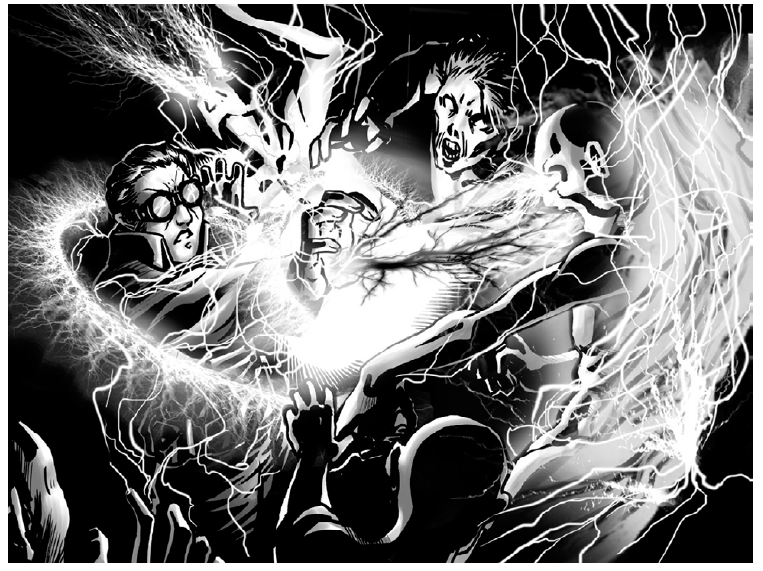
LEVEL FOUR
-
Electrical Storm (self, Willx10 feet radius, thought): The psychic can call down a point-blank AoE bonanza of lightning that automatically deals +Will shock damage rolls. This is, again, for EVERYONE in the area, including allies unless the psychic can see them and make a control check to exclude them. This also damages machines and the psychic automatically gains +1 IP.
-
Machine Mind (multiple objects, Willx15 foot radius, maintained): Galvanic Manipulation+. The psychic still needs to make a control check (the power works regardless) and the psychic can tell the items what to do individually: this is off, this is on, etc. The same limitations of control apply.
-
Synaptic Overload (single, Willx10 feet+LOS, maintained): Here we start getting into very dangerous toys: psychic's Will vs. double the subject's Vitality. If the subject wins, the psychic gets 1 IP. If the psychic wins, they get to pick one of the following: complete bodily paralysis (no actions, even speaking), seizures (that will last as long as the power does and then 1d5 minutes after it's ended, the subject makes a damage roll if not restrained from the seizures) or out and out death. This doesn't work on the undead but it does work on animals. There are many more Save Or Die powers to come.
-
Electrocutioner (group, Willx15 feet radius, maintained): Mass Synaptic Overload for the price of 1 IP, where the psychic picks one result (seizure, paralysis, death) and makes one Will roll, the targets making their own individual rolls. This also targets allies in the area unless the psychic can make a control check and see them. Yes, a sufficiently powerful Electrokinetic can accidentally cause a partial/full party kill if a series of bad rolls are made and they pick death.
-
Entropy (self, Willx30 foot radius, maintained): The psychic can actively devour power: aetheric energy, radiation, heat. First the power goes out and any fires snuff. After two minutes, everyone living/half-living in the area (including the psychic) take -2 to all Skill and Attribute rolls in the area. After five more, everyone takes a +Will damage roll and then every minute after as everyone freezes. Padded/insulated clothing doubles the time between rolls. The power deals 1 IP to use.
-
Ion Blast (single, Willx15 feet+LOS, thought): The psychic can launch a ball of energy with the force of a nuke (or a Van Haller Death Ray) with a ranged attack. This is by far the most dangerous weapon in the Electrokinetic arsenal. First, the psychic must make a control check to make the ranged attack; if you fail, the psychic is the epicenter of the blast and is instantly atomized. If the ranged attack misses, it hits 2d10 feet away. If it hits, the target is atomized and the blast has a diameter of Willx3 feet. Anything in the blast takes +Willx2 on a damage roll, anything that takes less than a Fatal Wound is thrown clear and set on fire. If the damage is Fatal, the target is vaporized. Finally, everyone who witnesses the blast is blinded temporarily, the psychic gains +1 IP and there's a giant, empty crater left from the blast.
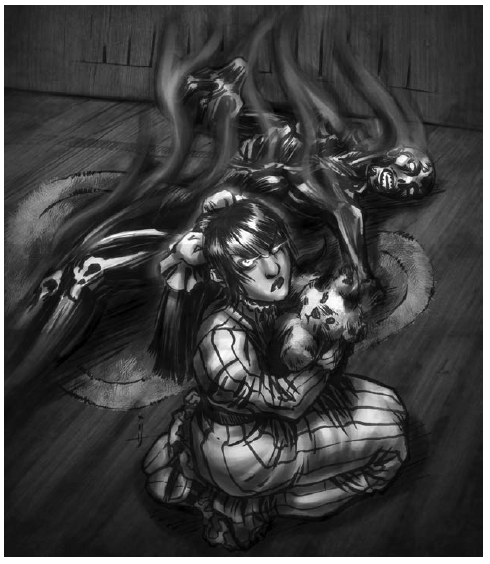
~toasty!~
Pyrokinesis: Pyrokinetic powers are, as a whole, destructive. There's a disproportionate amount of pyrokinetic's stuck in asylums for small crimes compared to other psychics and the most unruly/dangerous are often lobotomized. The game portrays pyrokinetics are impulsive, antisocial and ruled by their emotions.
Your attacks and abilities often run the risk of someone being set on fire, which add +3 to rolling on the damage table and you're on fire until it gets put out. Pyrokinesis has a big restriction and it sucks. Without the Silence ability, strong emotions or Serious wounds force Will checks on the part of the psychic where failure means they must attack the source of their frustration. Take Silence. Just take Silence. Also, a lot of your powers might result in you losing your clothes, so don't worry too much about armor and get comfy with being naked in public. Freak them Victorian squares.
LEVEL ONE
-
Fanning the Flames (single, Willx10 feet+LOS, maintained): The psychic can control an existing fire by causing it to flare, burn out or lower to a smolder. If it flares, it triples in size and anyone around the fire catches fire.
-
Ignite (single, Willx5 feet+LOS, maintained): Set something on fire with your mind or perform that old chestnut where you superheat something in a guy's hand and it hurts them until they let go. Make a control check after using.
-
Radiance (self, self, maintained): Let the world see how grossly incandescent you are. The psychic creates a five foot sphere of warmth around their body that keeps people warm and they will glow bright enough to illuminate a room. You also give enemies +2 to attacks to shoot you because you're a big glowing target.
-
Fire Charmer (single, Willx10 feet+LOS, maintained): The psychic needs to make a control check at the start but can still use the power. The psychic can sculpt, control and move fire as long as it has a fuel source and can use it as a weapon with an attack roll.
-
Firewalker (single, self, maintained): Anything on the psychic's person or held in their arms can't be harmed by natural fire. This doesn't protect against smoke or debris, just fire. If you're attacked by another psychic with Pyrokinesis, subtract your Will from their damage roll.
-
Torch (self, self+LOS, maintained): Ignite a limb or end of a weapon with harmless fire as long as it's maintained. The fire acts as a light source and can be used for an unarmed attack or put a fire damage roll (plus igniting the target, +Will for damage) on top of a weapon damage roll.
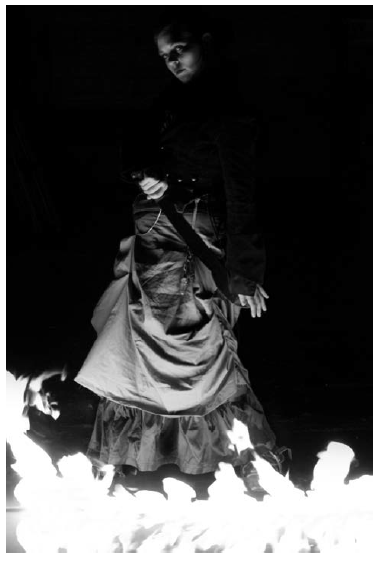
You'll find her at the Black Lodge.
LEVEL THREE
-
Burning Man(self, self, maintained): Set your entire body on fire and become a walking flame. It will burn off anything flammable on your body so I hope you like fighting people naked. People get +2 to hit you, but being on fire makes animates not want to attack you, all unarmed attacks against you set the attacker on fire and any of your melee attacks set people on fire. This is also tremendously useful if you're tied up or being grappled. Each use costs 1 IP.
-
Eruption of Flame (single, Willx10 feet+LOS, thought): Make a control check where success ignites the air around the target to create a fireball. Anyone in the epicenter is knocked down and set on fire with +Will damage, the damage reduced by 1 for every three feet. This can also burn people's clothes off and the blast will affect the psychic if they're caught in range.
-
Flame Jet (group, Willx5 feet, thought): Projects an AoE cone with a Willx8 inch circumference. Make a ranged attack against everyone in range of the fire that deals 2xWill+ damage and sets them on fire.
-
Blazing Aura (self, Willx3 feet radius, maintained): The psychic creates a superhot zone that ignites everything but themselves and their clothes. The aura melts bullets, sets anyone in the area on fire and wards away Animates. You can also use a Control Check to render people/things immune to the power's ability. The aura costs 1 IP to use.
-
Psychic Crucible (single, Willx10 feet+LOS, thought): Fill a Willx2 foot radius area with enough heat to melt steel (in two minutes) or crumble stone (in three). Anyone in the area catches fire and if they can't escape will die in ten seconds and turn to ash in 30. The psychic must make a control check when the power is resolved.
-
Spontaneous Combustion (single, Willx15 feet+LOS, thought): Save or die against living/half-living subjects. Will vs. 2xVitality for the target, 1 IP vs. setting the target on fire to the bone and setting everything around them in a three foot radius ablaze.
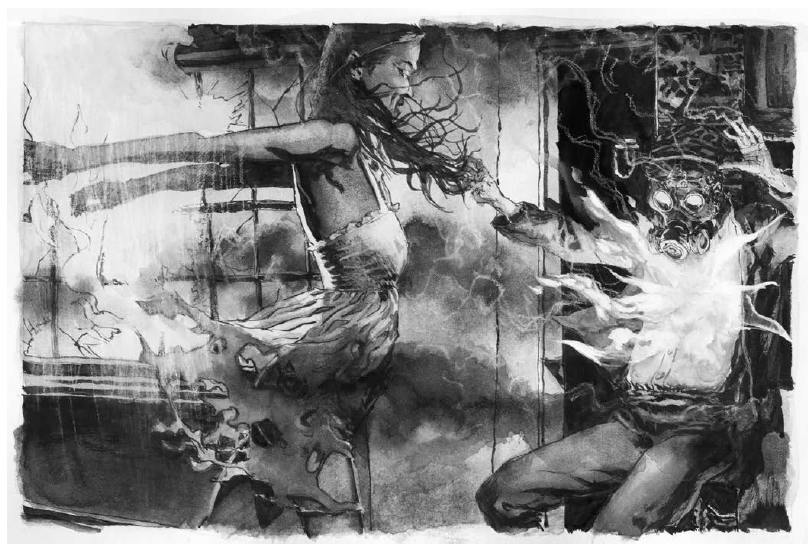
TADAA!
LEVEL FIVE
-
Conflagration (self, Willx50 foot radius, maintained): Control and manipulate all fires in the area around the psychic. This power requires a control check to start. This can be used to devastating effect.
-
Firestorm (self, Willx50 foot radius, thought): Explode and ignite the air around the psychic in a PBAoE. The psychic must make a control check to be immune from the effects of their own power which automatically inflicts a Willx2+ damage roll, concusses and sets on fire. Anyone who sustains a Fatal wound is turned to ash. The firestorm lasts for three rounds and everyone in the area has to make a Vitality roll to hold their breath or choke on fire and ash. Unlike most of these powers, the psychic can't choose to exclude people or things.
-
Spontaneous Devastation (group, Willx30 foot radius, thought): Group Spontaneous Combustion that is capable of hitting allies too. Costs 1 IP to use.
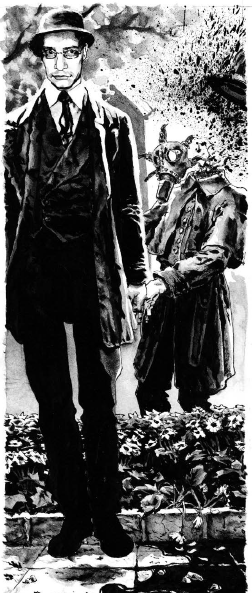
Let's see you turn heads like that , Empathy.
Telekinesis: Electrokinetics are tied to logic and control, Pyrokinetics are tied to passion and emotion, but the Telekinetics of London are most tied to madness and sorrow.
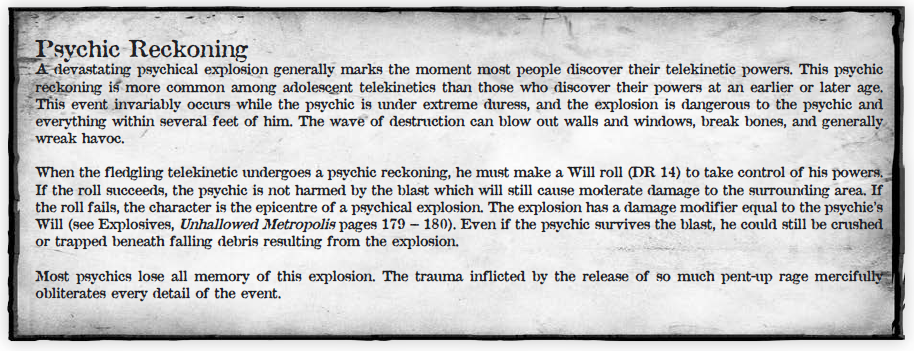
Telekinetics are pylons of power and often have pasts rooted in mistreatment, tragedy and suffering. Their powers are a way to take control of the world around them and they end up with a lot of complexes and raging egos as a result. The ones who gradually develop their powers have more control over their anger and their power than ones who develop it spontaneously. These psychics are prized in construction and manufacturing and often live lives of control of themselves and their power through meditation or mysticism or religion. Some become mass murderers, some neglect their bodies and use their powers instead, some rip Animates asunder. They don't have any explicit downsides besides normal psychic rules save for one: if two telekinetics try to use a power on the same object, the one with the higher level wins automatically.
LEVEL ONE
-
Force Blow (single, Willx5 feet+LOS, thought): Force Blow is a simple telekinetic punch but doesn't hold up well to armor but it can knock people out with a blow to the head. It requires a control check after use.
-
Strong Arm (self, self, maintained): Replace the psychic's Vitality with their Will for melee attacks, lifting carrying (or get +1 Vitality if they're equal). The psychic also doesn't have to deal with Coordination penalties for armor.
-
Telekinetic Manipulation (single, Willx3 feet+LOS, maintained): You can only manipulate one object at a time, you can't squeeze a throat until it chokes, but you can repeatedly use the power to manipulate more than one thing at once or trip people.
-
Force Hammer (single, Willx10 feet+LOS, thought): Improved Force Blow, all the same requirements but with better range and double the Will damage bonus.
-
Pin (single, Willx5 feet+LOS, maintained): Force Grapple. It requires a control check but works regardless of the check. The grappled subject can be choked, used as a human shield or pressed up against something.
-
Telekinetic Shield (self, self, maintained): Control check, 1 IP vs. the shield. The shield gives you full body armor depending on Will: 1 for 1/2, 2 for 3/4, 3 for 5+. This stacks on top of other armor and can also deflect rain and smog.
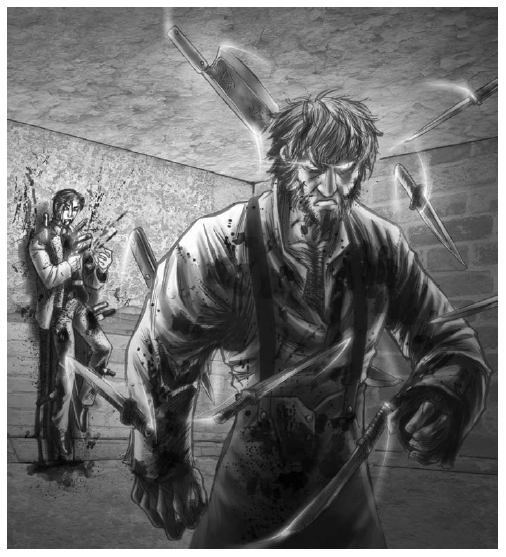
"We're never gonna make it as a circus act at this rate."
LEVEL THREE
-
Bone Snapper (single, Willx10 feet+LOS, thought): If the psychic succeeds a Will vs. 2xVitality roll (losing gains 1 IP), the psychic can inflict a Complication as they see fit on the subject. Complications are bad and range from broken fingers, severed limbs, disemboweling or organ damage. They can also pick a Complication that will leave the subject near death if not attended to within the minute. A psychic with Medicine 4 can do things in a more subtle way: constrict blood vessels, stop the heart, shut down an organ. If this power is used on the undead, the psychic can simply crush their skull (or heart if a vampire) to kill them instantly.
-
Greater Manipulation (single, Willx10+LOS, maintained): Better telekinesis. Drop people to their deaths, choke them, propel heavy things or glass/nails/knives at them with the force of a shotgun blast. Fun stuff.
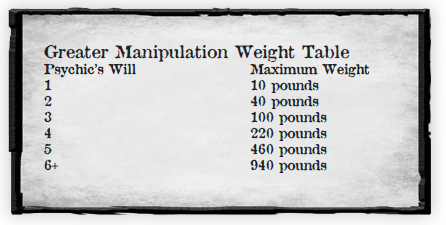
-
Levitation (self, self, maintained): Fly Willx3 feet per turn or hover. Wind is your enemy.
-
Force Barrier (single, Willx10 feet+LOS, maintained): The barrier can be up to Willx3 feet in diameter and conforms to the space it's placed in. It can't keep out air, sound or elements so you're still vulnerable to galvanic attacks or other psychic powers, but it can keep out bullets and any other objects or spirits. The psychic needs to make a control check to use this power but will use it regardless.
-
Mass Manipulation (group, Willx15 foot radius+LOS, maintained): Even more better telekinesis, but you can just manipulate things in a group and don't need to maintain multiple uses of the power.
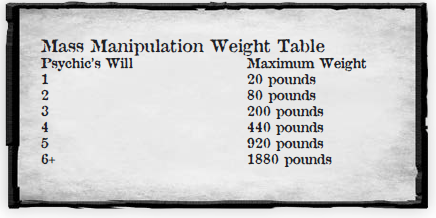
-
Wrecking Ball (single, Willx15 feet+LOS, thought): The psychic can send a big ol' ball of telekinesis at a target with a double Will modifier for damage on the explosion table. The attack is on par with a grenade but the psychic isn't immune to their own power, so be careful or attack from behind a force wall.
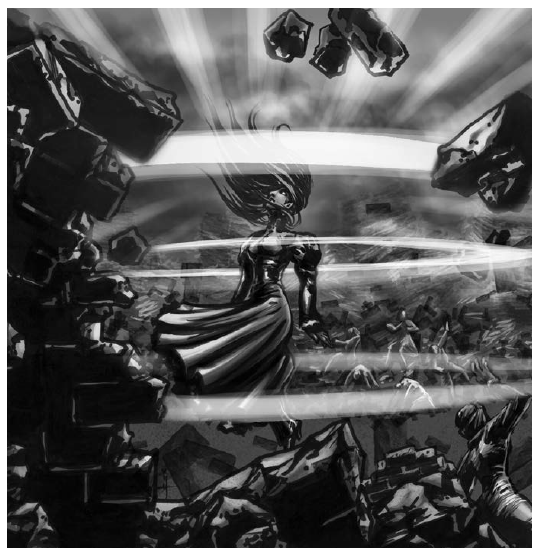
"Ride the Maelstrom, just a pound a go!"
LEVEL FIVE
-
Massacre (group, Willx30 feet+LOS, thought): Mass Bone Snapper but can't be used subtly. Yes, your friends are not immune to this unless you want them to be. Hits the psychic with 1 IP to use and is quite good for killing a giant mass of undead.
-
Total Control (group, Willx150 feet+LOS, maintained): Hurt people and add a Willx3 damage bonus, do anything you could by hand with a -3 penalty for skills. This too requires a control check before use but won't stop you from using it.
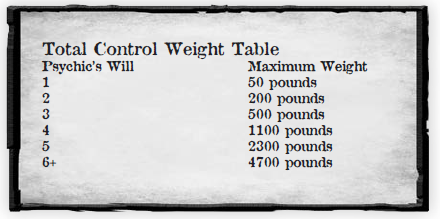
-
Tremor (self, Willx150 foot radius, maintained): Create a localized earthquake. Anyone in this area automatically takes +Will damage, is concussed and can't stand. This power costs 1 IP to use, cannot protect your friends from it, can easily destroy buildings and even the psychic isn't safe unless they Levitate off the ground. Also the cops will come after you for gross property damage. The big danger of this power comes from the collapsing building and debris landing on people in the zone of effect and there's no way to use it in London without killing a bunch of people.
Honestly I'm glad to be done with sharing these powers. They were a lot and I think I was too thorough in regurgitating them. NEXT TIME we'll finally be done with this chapter and take a look at lobotomies, psychic induction surgeries and the rest of the nitty-gritty behind psychic powers.
CHAPTER THREE: THROUGH A GLASS DARKLY: PART FIVE
Original SA post
CHAPTER THREE: THROUGH A GLASS DARKLY
PART FIVE
A warning: the following write-up is all about surgeries and treatments in Neo-Victorian asylums and sanitariums. It handles them as well as you would expect them to (in true lazy horror fashion) and people who are sensitive to these topics should pass this section over. You're sincerely not missing much, just a lot of tables.
PSYCHOSURGERY
To make a long story short, the lobotomy was invented in 1888 then the Plague happened and lobotomies never really went out of style. Psychosurgery in Unhallowed Metropolis/Necropolis is explicitly cutting into the patient's skull to access the brain to tinker with it to fix the patient's ailments. This is essentially the pinnacle of mental health treatment in London and has been for two centuries now; therapy is available but instead of medication or pharmacology, psychosurgery is used for the majority of all treatments.
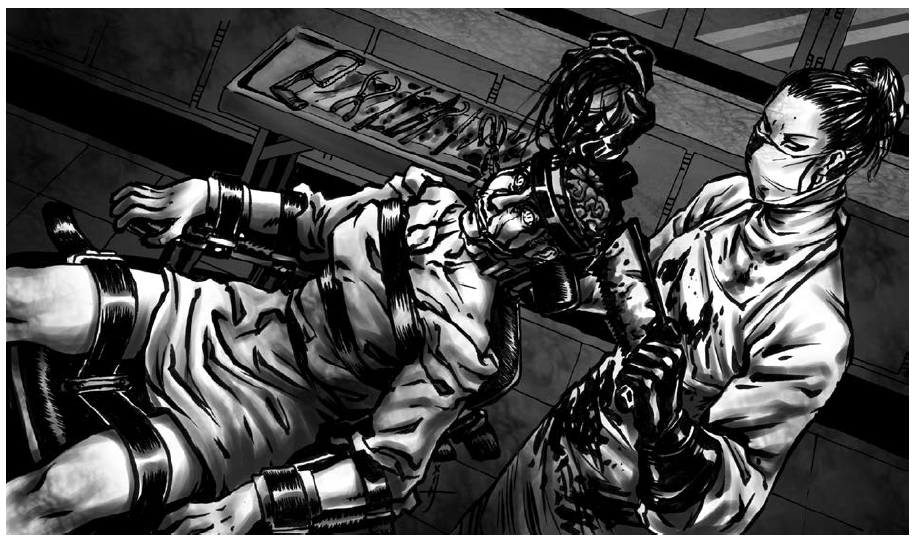
This is definitely on the more extreme end of things but hey, you chose to include this in your book.
Psychosurgery breaks down into three separate fields: corrective surgery, lobotomies and psychic induction. This all ties into my main problem with the Alienist: there are rules for letting the players do all of these procedures. The game treats corrective brain surgery the same way it treats creating Thrope serums, reanimating the dead Herbert West-style and genetically engineering new life. The Doctor class, the scientist-of-all-trades class, can get by perfectly well without ever needing to delve into making monsters or creating new life. Psychosurgery is essentially half of what the Alienist can do, and there's enough here to make a group incredibly uncomfortable or delve into bad territories. It feels cheap and exploitive and not fun because you're giving the players direct access to taking advantage of/controlling NPCs with the power of authority and "medicine" and ~horror~. I personally would not make any of what follows a part of any game I would run in this universe.
Corrective surgery involves trepanning the skull for access to the brain for corrective alterations. "Though such procedures were initially quite haphazard, Neo-Victorian medicine has advanced to the point at which minute and seemingly harmless alterations to the psyche are not only possible but the expected outcome of such treatments." uggggggggh. Corrective surgery can be used to remove psychic powers (whether the psychic wants them to or not), Mental Disorders and some Mental Impediments. These rules apply to both PCs and NPCs so I suppose you could, in theory, pick up a bunch of Disadvantages in generation then immediately turn to the party's Alienist and say "crack me open and fix me" but as you will see, that's not such a good idea. First the patient has to be diagnosed with a Psychology roll (vs. DC of patient's Will+10) to identify the conditions and level of psychic power. The patient should be strapped down ("or" sedated, the game seriously doesn't expect both), the psychosurgery kit should be prepped and surgery can begin once the doctor states the conditions they want to attempt to fix. Key word: attempt.
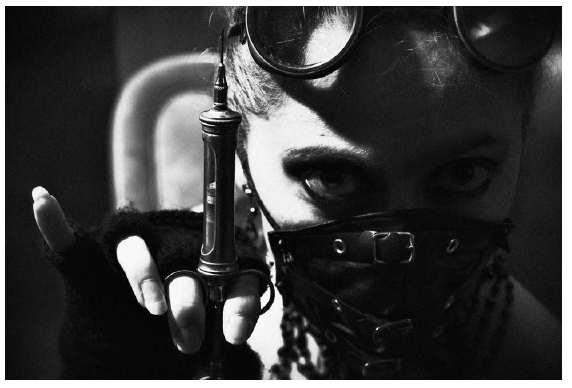
Each condition takes a hour to treat and requires a skill roll of Medicine vs. DC 11+patient's Wit+patient's Will. You can only attempt to treat that condition once per procedure, but the doctor can attempt to treat more than one different condition per procedure. The doctor can take care and double the length of the operation for +2 to the rolls (do this) or rush it and try in half the time for -2 (do not do this). The doctor can also make a really big hole in the skull for +1 to treatment or not sterilize their shit/use the wrong tool for -2. Aftercare requires someone with Medicine 2 to give the patient a half hour of treatment a day for a week or else they'll get an infection and slowly die. I would provide an example of an operation but A: I really don't want to come up with something like this myself and B: the book provides for me. A doctor takes 6 hours to treat a man's chronic OCD, night terrors and narcolepsy and over the course of the operation removes the man's OCD, doesn't cure the night terrors and instead makes the man prone to melancholic fits and accidentally makes the narcolepsy chronic. Whenever you fail a Medicine roll for Psychosurgery, the GM rolls on the Failed Psychosurgery Table to see what happened to the patient (in this case, he still has night terrors and he now sleeps more so that's awful).
Lobotomies are a lot faster because it's using a hammer to shove an ice pick into the patient's brain through their tear ducts. All it takes is a DC 14 Medicine roll and lobotomies are popular with asylums because A: they automatically shut off all psychic powers and B: they reduce the patient's Wit to 1, reduces their Will/Charm by 1 point and makes the patient docile and compliant. If Will/Charm is reduced to 0, the patient is in a vegetative state. If the patient is a PC, they can regain their stats with experience but can never have a Wit higher than 2 or a Will/Charm higher than 4. That's pretty much it for lobotomies; they're an awful medical practice favored by doctors because they're cheaper and faster than sedatives/psi-inhibitors and if the Medicine roll is failed then the GM rolls on the Failed Psychosurgery Table.
FAILED PSYCHOSURGERY TABLE-O-FUN
-
2: The patient accidentally becomes psychic and gains a Latent Insanity and one power at level one.
-
3: Permanent vegetative state.
-
4: Reduce the patient's Will by 1.
-
5: Neurological damage: roll 1d10 where 1-4 means the patient goes blind, 5-7 means they go deaf and 8-10 means they become mute. Wonderful. Great.
-
6: The patient gains epilepsy and seizures. If this is rolled again/they already had that, nothing happens.
-
7: Amnesia.
-
8: Patient gains a weird vacant stare and monotone and -1 to all non-Intimidation Charm rolls when speaking to someone without a mental disorder.
-
9: Gives the patient a new mental disorder or exacerbates the one being treated into becoming chronic.
-
10: Partial success with a complication. Mental impediments/minor disorders are removed, chronic become minor, the lobotomy didn't work and just gave the patient a black eye. Roll again but reroll any results of Death, Partial Success or Partial with complications.
-
11: Partial success: same as above but without needing to roll again.
-
12: Partial success with complication.
-
13: Patient becomes sickened and loses certain physical qualities.
-
14: Patient becomes illiterate.
-
15: Patient becomes melancholic.
-
16: Patient loses muscle control and gains -2 to Prowess.
-
17: Patient gains Uncontrollable Temper.
-
18: -1 to Coordination; if lowered to 0, patient becomes a paraplegic.
-
19: Brain damage reduces the patient's Intellect to 1; previous Academic skills aren't lowered/lost but new ones are limited. Intellect can never recover past 3.
-
20: Death from brain damage.
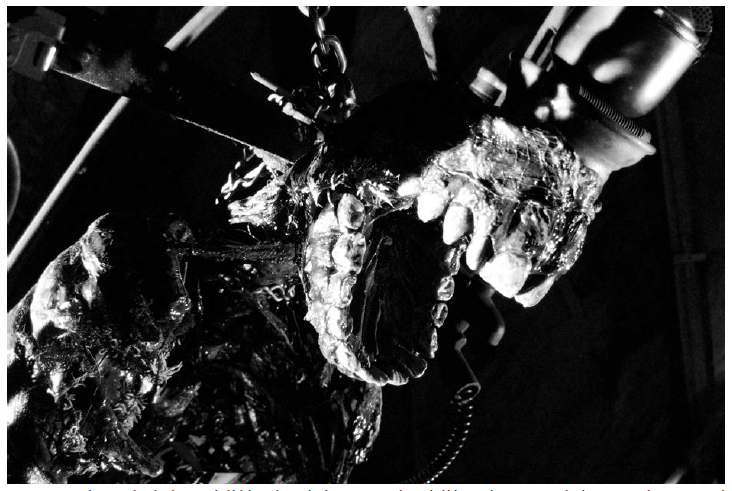
?????
PSYCHIC INDUCTION: Induction comes in three forms. There's natural psychic induction, which is when a person experiences something so terrible and horrific the trauma permanently puts their mind off-kilter and gives them a Latent Insanity and one level in a power (but can't develop anything from the Psychic class). This can just happen naturally over the course of play and is by far the "best" way to get powers outside of playing a Psychic.
Hypnotic Induction is the safest kind, but it's temporary. Someone with Hypnosis 4 and Parapsychology 3 can spend a half hour walking a living subject through a trance to unlock their potential (Hypnosis vs. Subject's will, where success for the hypnotist manifests a power). The hypnotist can attempt to make the subject manifest specific powers (DC 20) or direct the subject to use their power (DC 11+Will). Failures result in uncontrolled/unwanted powers and critical failures/success means they're way more powerful than they should be. If the subject wakes up, the powers disappear. Hypnotic Induction really just exists to look cool or show off the hypnotist's skills at putting people under; in the long run, it's incredibly inefficient.
Which leads us to the hard way: Medically-Induced Psychic Induction. This kind of psychic induction is illegal, incredibly dangerous and undeniably immoral. At its core, it's systematic abuse of the patient with the intent of breaking their will. Anyone involved in the procedure must have Medicine 3, Parapsychology 3 and Psychology 3 and the subject can only see those people for the duration of the procedure. If there's more than one person involved, one has to be designated the head physician who is the one who determines how this progresses. There is no nice/gentle/good way to do this, considering it's breaking a living being's will and intentionally destabilizing their mind; the game recommends that the procedure have appropriate equipment such as an operating room, torture chamber, isolation room or psychoactive drugs. The patient will need two hours of care daily from anyone in the project, requires 24/7 monitoring and the head physician has to monitor and perform on the patient for six hours a day. At the end of the week, the head physician makes two rolls: Medicine vs. DC 16-Subject's Vitality and Will vs. Will. For the former, failure reduces the subject's Vitality by 1 (at 0 they die). For the latter, the doctor adds their Torture, Medicine or Psychology skill to the roll and success lowers the patient's Will by 1. The experiment is done when the subject's Will hits 0, so depending on how rolls go this entire thing can run around a month/six weeks. The subject regains Vitality/Will 1 point per week after the experiment.
So what happens when the experiment is done? The GM rolls 2d10+subject's base Will to determine what happened on the Psychic Apotheosis Table. Yeah, the doctor's stats don't really do anything or add anything, it just comes down to a blind fucking roll after all of that nonsense. The results should be secret until the patient is full examined.
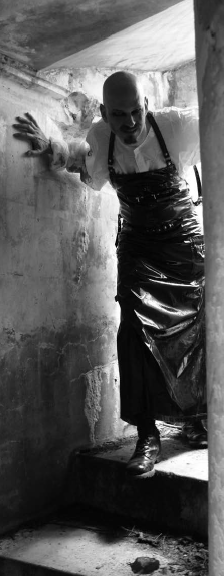
Keep this guy the hell away from my skull.
PSYCHIC APOTHEOSIS TABLE-O-FUN
-
8 or less: patient dies.
-
9-10: Total failure, roll three times on the Psychic Induction Side Effect Table. Patient can be used again after recovery is complete but you did just break their minds and those effects might be permanent so good job there.
-
11-14: Failure, roll once on the table. Can be used again after they recover.
-
15-16: The patient is instead made Psi-Null.
-
17-18: The patient gains one power at level one and a latent insanity at the cost of tremendous damage done (three rolls on the side effects table).
-
19-20: Partial success; one roll on the side effects, one power at level one and one latent insanity.
-
21-22: Flawed apotheosis; the patient gains one power at level
three
, a latent insanity and three rolls on the side effects table. Considering what most psychics can do at level three, most of them turn on their tormentors immediately.
-
23-24: Success; one power at level 3, one roll on the side effects table, one latent insanity.
-
25+: True apotheosis: the patient gets one power at level four, one side effect and latent insanity.
-
2: Patient gains Photographic Memory, Savant and Synaesthesia qualities from the sundering of their mind. No effects if this is rolled again.
-
3: -1 to Vitality and Coordination from treatment of procedure, is cumulative if rolled repeatedly. Death at 0 of either.
-
4: Amnesia, a blessing of sorts. No effects if rolled again.
-
5: Patient gains the Fits Impediment and becomes prone to seizures/epilepsy. No effects if rolled again.
-
6: The pain suffered is reflected through the patient's eyes, giving them the Evil Eye impediment and a creepy look. No effects if rolled again.
-
7: Psychological scars in the form of Night Terrors. No effects if rolled again.
-
8: Hypersensitivity impediment. No effects if rolled again.
-
9: Melancholy impediment. No effects if rolled again.
-
10: Mental damage, reducing Wit/Intellect by 1. Cumulative, lowers skills too, 0 in either is coma/vegetative state.
-
11: -1 to Will, cumulative, 0 means the patient just can't respond to any stimulus anymore and will live the rest of their life in a fugue.
-
12: Uncontrollable Temper. No effects if rolled again.
-
13: -1 to Charm, same as Will if reduced to 0, cumulative.
-
14: Patient goes blind. No effects if rolled again.
-
15: Patient becomes mute. No effects if rolled again.
-
16: Patient goes deaf. No effects if rolled again.
-
17: Patient becomes Lame. No effects if rolled again.
-
18: Permanent -2 on all Mental Disorder control checks.
-
19: Patient gains Accelerated Decrepitude. No effects if rolled again.
-
20: Eye of the Abyss: the patient undergoes a mental transformation that renders them completely immune to Telepathy or Empathy, can never develop either and forces control checks of those powers around them.
FINAL THOUGHTS ON CHAPTER 3: Thank god it's over. The information on psychic powers overwhelms a substantial chunk of this book that's supposed to be about ghosts. I feel like I went too in depth into the powers. This whole last bit is just wholly unnecessary for play and for player interaction and I feel like I can't make my opinions on it any more clear. At least Reign of Steel said "hey, if the PCs end up in a Zonemind's death camp, it should be to further the plot and you really shouldn't just do bad stuff to the characters". There's this kind of implication to Unhallowed Necropolis with psychosurgery; it feels like it's offering up the rules for lobotomies to say "if you wanted the PCs to get thrown into an asylum and operated on, here's mechanics for that" in the same breath it endorses letting the PCs perform brain surgery. Psychic induction is just awful mechanically and narratively speaking; if you do it, you have to commit to it for at least a month and the side effects are bad. There's also the fact that powers gained that way don't get anything from the Psychic class' abilities. The Psychic class is just a better deal overall and I can't think of any narrative reason you'd make a psychic besides needing to for some contrived reason. It's all just awful and I'm glad I can move on with it.

Same.
NEXT TIME: Chapter Four, Ghosts'n'Stuff
CHAPTER THREE: GHOSTS OF LONDON
Original SA post
CHAPTER THREE: GHOSTS OF LONDON
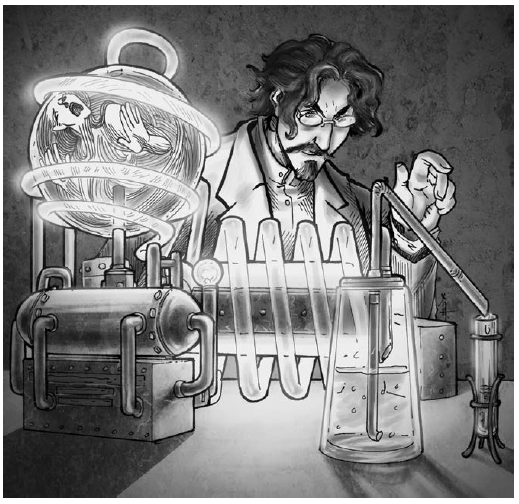
Hey I hope you're ready for a lot of art because I have a lot of art and there's not too much to this chapter.
The Spirit World is linked to the physical landscape of London but it's also linked to the biggest source of power in the city: aethertech. Aether is a wirelessly transmitted form of energy invented by Nikola Tesla and the broadcasting plants are powered by massive coal furnaces. The Spirit World is actually measurable/understandable as a low frequency level of aether, so aethertech can be used to actually measure the Spirit World. So what is it? It's a bit like going to the Other World from Silent Hill; it may match the physical landscape but it's altered and changed by the emotions of people interacting with it or who've come and gone. Destroyed buildings may exist as whole or vice-versa. The ghosts that occupy the Spirit World are erratic and their true nature aren't entirely clear but it's generally held that they have a sort of "battery" necessary to their existence (or that they ARE aetheric energy bound into a sentient form). Ones that are bound to people, places or things draw power from them, while some of the more powerful spirits exist independently and conserve/drain power somehow.
With religion being a bit on the backswing and science's gleeful exploration of the supernatural, Neo-Victorians retain a fascination with spiritualism. Some of it is superstitious in nature, some of it clashes with scientists over the relationship between soul and spirit, but the séance is widely popular. On the other end, you have spiritualist cults like the Adepts of Perpetuity, the Invisible College, the Daughters of Ammit and the Blackthorn Covenant. The Adepts are aristocrats so terrified of death but are unable to take any more anti-aging treatments so their spirits are stripped from their body before death and used to possess a new body that is adopted into an Adept family. The College is a(n allegedly) disbanded cult of mediums and ghost-hunters who blackmailed aristocratic families with secrets gleaned from the dead. The Daughters worship the Egyptian demon Ammit by using alchemy to distill the essence of the living and dead for drinking in an attempt to attain immortality and dread power. Finally, the Covenant is a cult of homeless beggars and madmen who worship the spirits of the city and willingly give up their bodies to possession to escape life and serve a higher power. It kind of says a lot that there's more info about evil ghost cults than anything else.
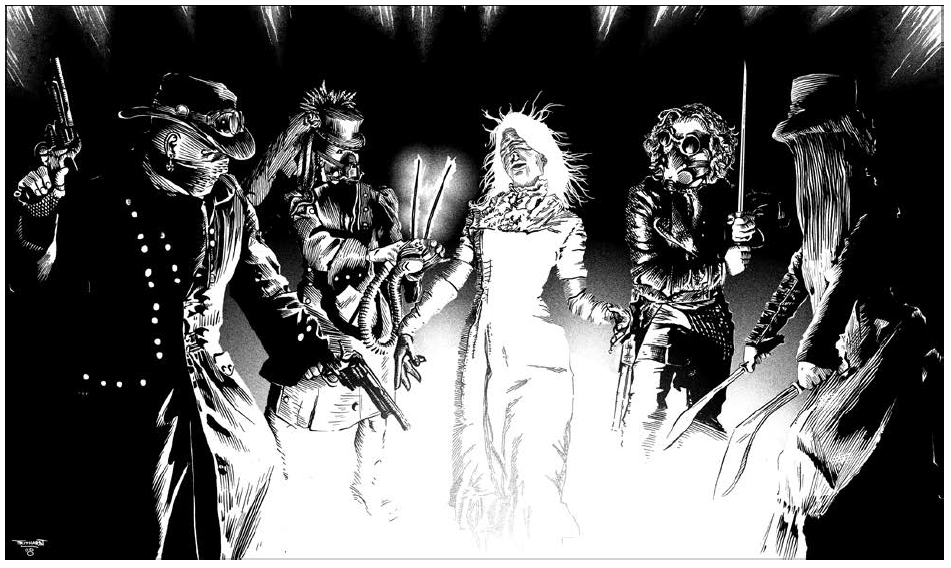
The infamous spiritualist cult The Brotherhood of the Funny Outfits.
So what does one do with a haunting or a spirit? Neo-Victorians treat mild hauntings like one would treat being mortified about a pest problem. Minor hauntings/immaterial ghosts need to have their haunts destroyed or relocated (haunts being people, places or things keeping the ghosts attached). If destruction isn't an option, an exorcist can exorcise and banish, a medium can communicate to the ghost and talk them through severing a haunt, or a parapsychologist can capture/contain or talk to the ghosts. Ghost-hunting/ghost handling is a vital business to London's economy; there's no shortage of takers and it's considered to be the "safer" alternative to Undertaking. These businesses range from amateurs with home-made tech or low-level mediums to teams with contracts with companies, the Anglican church, large franchise companies or groups who work for specific families/groups. The worst case scenario for dealing with a haunting is flat-out quarantine of the affected area as executed by the Department of Health; quarantines can last for decades or until someone gets rid of the ghost (most often a poltergeist or malicious spirit).
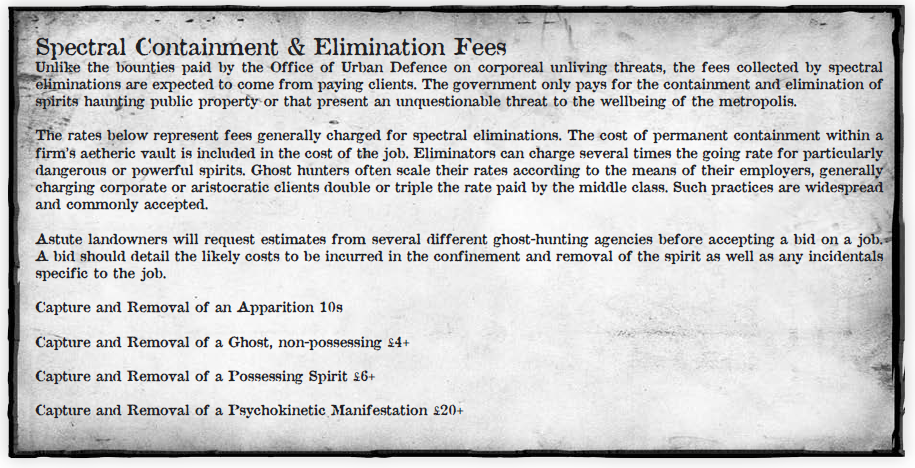
I ain't 'fraid of no property damage.
Taxonomy of the Dead
Spirits are divided into three categories based on strength: apparition, ghost and poltergeist. They are a self-contained aetheric force that can manifest between the Spirit World and real world and they leave behind ectoplasm. All spirits basically need a tether or a reason to keep existing or else they'll gradually dissipate and fade away. Apparitions can last around months, ghosts can last up to centuries depending on what holds them on Earth and poltergeists only lose power in isolation. London has no shortage of old ghosts but the majority of them active in the metropolis are people who died after the Plague; they're only made from a bad, sufficiently traumatic death and the worse the circumstances the more power the spirit has. Dying and becoming undead do not create spirits, so someone dying from the Plague or vampirism can never become a ghost. Other artificially created undead don't have ghosts either and word is out for what happens to most half-lifers (like ghouls or Thropes, not dhampirs because they become vampires). Finally, a note on possession: the person being possessed will not remember what happened while they were possessed. In long term possession cases, the mental faculties of the victim will decline if freed and many have attempted suicide immediately after release. Also, possession really plays hell with the immune system and post-possession the human body has a higher risk of illness.
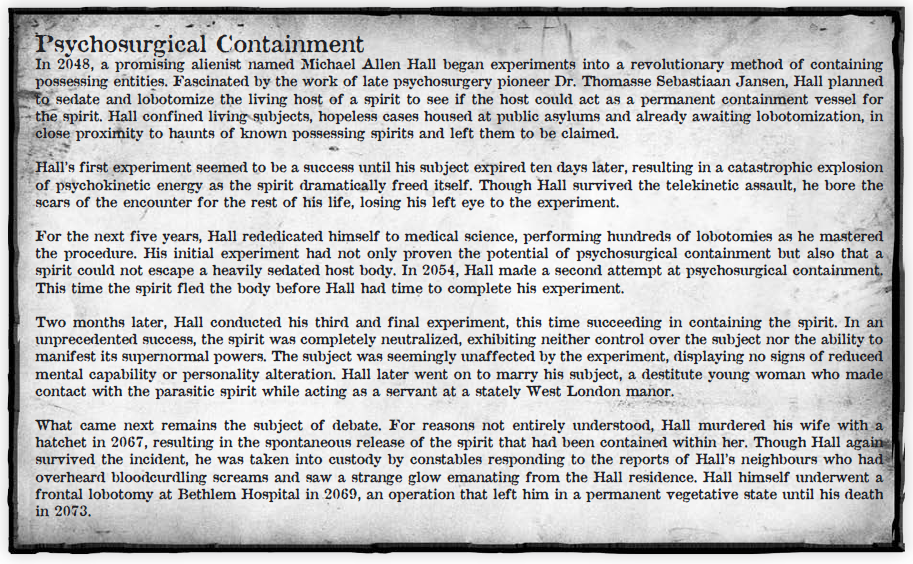
A friendly reminder that Neo-Victorian science is terrible and their scientists are idiots.
GENERAL SPIRIT RULES
To be honest I can't be assed to regurgitate everything I just said but with actual game mechanics this time. Here's some new info instead:
-
Spirits don't have Vitality or Coordination; Will is their health stat and they also have Wit, Charm and Intellect. If a spirit's Will hits 0, they're laid to rest or destroyed.
-
For every month of existence, a spirit must make a DC 11 Will roll where failure reduces Will by 1 until permadeath.
-
Spirits cause Fear rolls unless you are friends with an Exorcist. Be friends with an Exorcist.
-
Spirits spawn with a secondary manifestation and it's not uncommon for them to spawn with more than one of the following: Aetheric Disruptions, Darkness, Ectoplasm, Hallucinations, Mists, Noises, Smells, Spectral Glows, Strange Feelings, Temperature Changes.
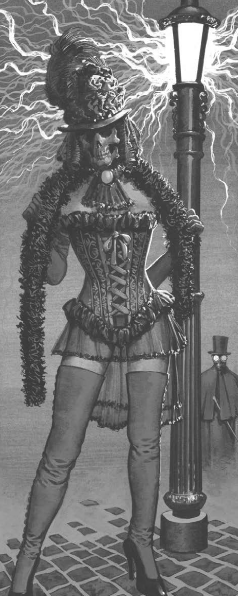
Apparition or ghost? You be the judge!
Ghosts retain all of their stats from life (except Vitality and Coordination) and their skills, but their minds might be impaired from death. Their appearance is tied to how stable their Will is but is tainted by aspects of their Corruptions. Also, most importantly: ghosts can never be player characters. Ghosts can manifest in certain ways, and get ways to manifest equal to their Will selected at their creation.
-
Audibility: ghost can become audible at will. Their noises can deafen people for a while but who can hear them depends on their Will.
-
Corporeality: ghost can temporarily make a body for itself out of ectoplasm to touch people. Does not last long at all, really not worth it.
-
Dread: ghost forces a fear roll. If the living/half living fail, the ghost regains Will or loses Will if nobody is scared.
-
Dread Communication: spy on the living, talk to them politely or force them to experience dreadful nightmares (but you can't kill them in their sleep).
-
Fetch: if someone dies in the ghost's presence, they become a ghost too and that ghost gets the Fetch manifestation as well. Quite a vicious cycle.
-
Ghost in the Machine: ghost can broadcast over radio frequencies and control machines like an Electrokinetic can.
-
Harbinger: the ghost can curse an object to break or malfunction or work how it shouldn't or curse a person to befall an accident ranging from "inconvenient" to "possibly fatal". Kayako from The Grudge would have this power.
-
Madness Induction: ghost can force madness in people around them.
-
Nature Manipulation: control vines, trees, animals, build a body for yourself out of a swarm of angry bees, etch swear words into a lawn by commanding grass to die.
-
Pestilence: carry the disease that killed you, making it harder to avoid disease or making a contested Will roll to make someone catch the disease. Fortunately for the "no undead" rule, I don't think you can carry the zombie plague.
-
Possession
-
Psychical Powers
-
Spectral Vampirism: devour the Vitality of the living to regain Will but can only be used if your Will is lower than your starting Will.
-
Spectrivore: the same as above but with eating other ghosts. In this world, it's kill or be killed. Except we're both ghosts.
-
Tempus Fugit: ghost can accelerate time and aging in organic/nonorganic targets. It can attack people and age them 1d10 years or can use their powers on non-living material and age everything in Willx10 feet around them one year per minute.
-
Visibility: become visible to people without Second Sight.
-
Weather Control: bad news, the ghost's new body is made out of angry bees and it's shooting hailstones and lightning at us.
-
Death, as in they are terrified of death and don't believe they're dead (convinced a person they were alive/were treated like they're alive).
-
Desire (indulging in its appetite).
-
Devotion (helped/protected their object of devotion).
-
Duty (regain info on self, perform task or gain insight).
-
Love (share a moment of real affection).
-
Madness (inspire fear/cause pain).
-
Sin (make amends/help someone in need).
-
Vengeance (REVEEEEEEEENGE!).
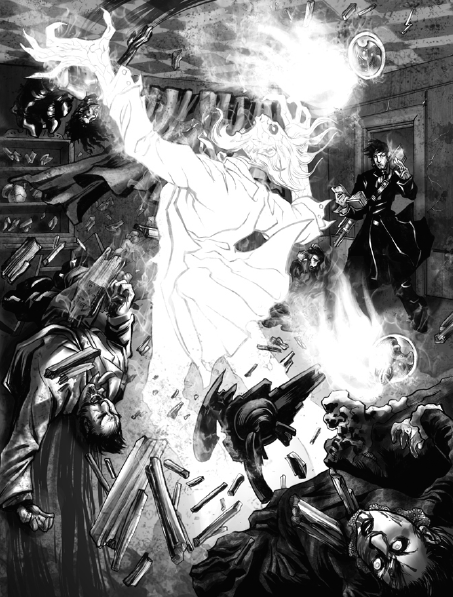
THE FURY!
Poltergeists are assholes. You need Second Sight to see them and they're all terrible inhuman abominations, primal horrors created from a person dying with impotent rage/hatred or the death of a diseased mind. Poltergeists can't be reasoned with or talked to, they're just wellsprings of anger and psychokinetic power. The best way to deal with them is capture and isolation or by quarantining its domain. Destroying its haunt is a good idea but easily said than done for two reasons: because there's a poltergeist standing between you and its tether, and because the poltergeist is prone to destroying it without realizing as it rages. They can't manifest, they regain Will whenever someone dies around them and they get one Psychokinetic power set (Electrokinesis, Pyrokinesis or Telekinesis) equal to the Will of its dead creator.
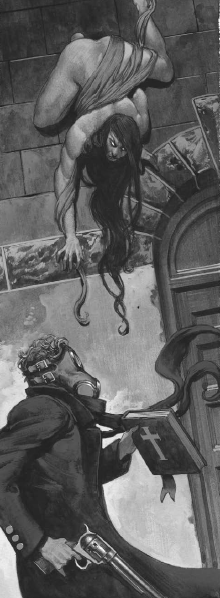
Here's the mandatory naked lady for this chapter. I guess whatever is possessing her hates pants and loves Spiderman.
And that's it for Chapter 4. There's really not NEARLY as much compared to Chapter Three, and that's not even counting out the fact that I included the rules/powers for Second Sight with the Medium class. Funny how this whole expansion is supposed to be ghosts but the ghosts don't get a hell of a lot to them. There's really not a lot to say here! Poltergeists should be used sparingly, there's some neat diversity among ghosts, but the majority of this chapter is back story, world fluff and repeatedly explaining the same things. It really is all downhill from here because NEXT TIME is Aethertech and all the new equipment the book introduces. But to its credit, there's some neat stuff.
CHAPTER FIVE: AETHERTECH
Original SA post
CHAPTER FIVE: AETHERTECH
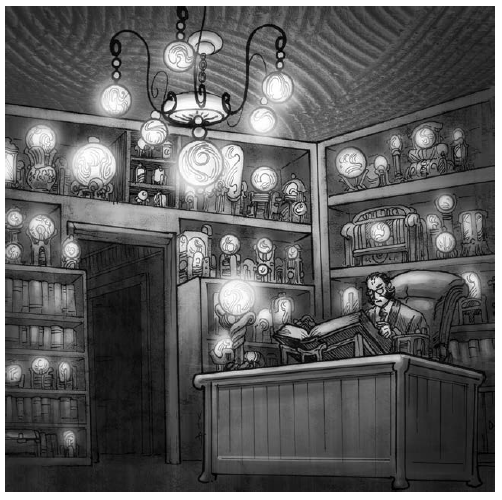
Aethertech, as it's used to hunt ghosts, is pretty straight forward. Spirits are actually condensed, "intelligent" collections of aetheric energy created by a sufficiently shitty death. Ghost hunting with aethertech tools and galvanic weapons just requires the hunters to create a field of aetheric energy around the spirit that has a stronger power than the ghost. Capturing a ghost requires an aether field generator, a containment ring, brass cables connecting the two and knowledge of how to work a generator. It's as simple as luring the ghost into the area of containment and turning the field on. As long as the field is running, the ghost is contained. Most generators are hooked into the city's aether field but it's pretty common for ghost hunters to have machines with backup batteries. Outside of London, these machines need a source of fuel.
Operating a generator doesn't require a dice roll if you've got any points in Galvanics or Parapsychology if you just want to turn it on. A generator has two ratings: Threshold and Area of Confinement. Threshold determines just how powerful of a spirit the field can contain and will trap/deny the powers of a spirit with Will equal to or less to the Threshold rating. If it exceeds the Threshold, the spirit can just leave and use their powers as they see fit. A character with Galvanics/Parapsychology 2 can manually control the field to push the Threshold but can't contain any spirit stronger than Threshold+2. To push the Threshold, it requires a Parapsychology roll based on the DC caused by the Spirit's Will where a failure means the field collapses. An augmented generator needs constant supervision, though; if unattended for longer than a minute, the spirits can try to break free. In cases of dire emergency, the generator can engage in Parapsychology vs. Spirit Will rolls to temporarily hold a spirit with Will higher than Treshold+3 where every success only buys a minute of containment. A field collapse is pretty self explanatory: the spirits are no longer contained and are probably pissed. Loss of power or damage to the machine is an easy way to lose the field, but certain powerful ghosts can just overpower it. The big, important rule of thumb is: any non-Exorcist/Psychic way to deal with a ghost using technology NEEDS a stable aetheric field to contain the ghost. No exceptions. No field, no containment. This applies to all aethertech.
So what do you do with a captured ghost? Generally, a ghost in a containment field can't stay there forever. There's long term imprisonment in a vault until their dissolution is complete and they no longer exist, there's multiple attempts to farm ectoplasm for industrial purposes and there are ways to turn ghosts into alchemical tools or sources of energy. It all depends on what you want to do with what you've captured or who you want to sell it to. The big problem is that you need a good amount of gear to capture ghosts: you need a generator to set up a containment field, you need at least one apparatus to extract the ghost from the field and you need a place to put the ghost. Well boy howdy do I have plenty of stuff to sell you! Friendly reminder: if you have the Aethertech Engineer ability, you get these for half price because you made/scavenged most of the parts yourself. You really, really need Aethertech Engineer for this to all be workable unless you're a university employee or working for a private group. Each item has a price, a threshold and an area of containment.
AETHERIC CONTAINMENT DEVICES
Aether Vault ($350/Unlimited/the vault): The aether vault weighs 500+ pounds. It's built to be a long-term installation for the containment of ghosts until they dissolve. Vaults are massive fixtures of generators, tubes, chambers, spheres and gauges wrapped in a brick, wood or brass frame. Anyone with both Galvanics 2 and Parapsychology 2 can transfer ghosts into the vault for permanent containment, the ghosts unable to manifest. Most vaults draw on the aetheric grid but have backup generators for power outages.
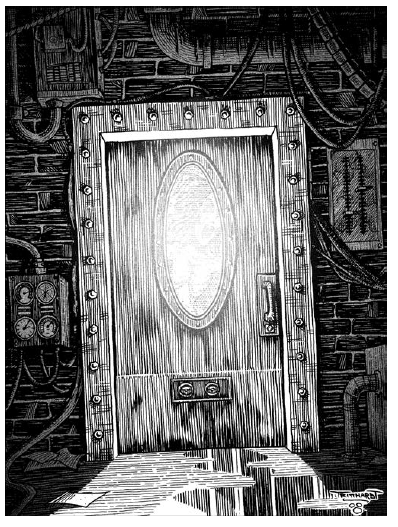
The vault in its natural habitat: someone's basement.
Alcott Jar ($30+regular maintenance/6/15 foot diameter): Alcott Jars are 20-50 pound containment field rigs that use alchemical materials to boost the power of a group of generators. The generators are deployed in a circle and form a containment field of static aether that contains ghosts. Alcott jars come at a good price for the threshold they offer but they have downsides. You need both Galv. and Para. 2 to use one or remove a ghost from its field. Because of their alchemical materials, they require four hours of maintenance after every capture or after ten hours of use and have to be off during that time. Not doing the repairs leads to very bad things happening and the jars in general have a eight year lifespan, no matter how well they're kept in shape. Good containment at a good price, pretty big pain in the ass otherwise.
EctoHabitat ($20/3/slightly bigger than habitat): EctoHabitats are basically orb-shaped or square containers used to hold ghosts without them dissolving and losing Will, drawing on the city's aether for power. It can never have its threshold increased so it's only used to hold low level spirits. While the game says they're shaped like diving bells or lanterns, there is no way in my mind they're anything less than fish tanks that you can keep ghosts in.
Ectostability Containment Suit ($40/unlimited/the suit): Do you remember Hellboy? The developers sure do. It's primarily used to load ghosts (not spirits or poltergeists) into the suit to communicate with them and study them, rarely anything more. There's a bunch of rules but let's be honest, I think the following picture says enough:
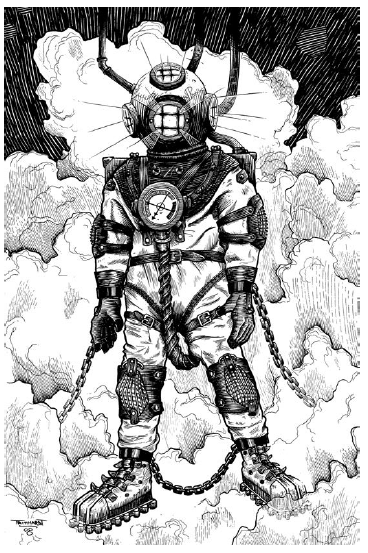
The WEIGHT...of the SEA...
Essence Chamber ($10/unlimited/the device): Essence chambers are used to extract spirits from containment fields so they can be moved to a vault or another container or they can just be kept in the essence chamber. The device is a mix of a generator, a power supply, glass tubes and brass that weighs ten pounds and creates a stronger field than the container which draws the ghost in through a pressure imbalance between the fields. They come in the form of spheres or boxes. An essence chamber can only hold one ghost, but as long as the spirit is in the chamber it's not getting free.
Oscillating Aether Field (variable/variable/variable: The OAF (heh) is a newer invention. The Alcott Jar uses a single ring with an unchanging field (static) while the OAF uses a circle of spider webs placed on the floor that generate concentric, overlapping fields (oscillating). They can take more physical punishment than an Alcott, able to function while damaged. The main downsides are strength, size and price. The price depends on the size of the area and the threshold, ranging from 5 feet to 30 and 3 to 5. On the low end, the five foot diameter, threshold 3 OAF costs $5. On the high end, radius 30 and threshold 5 costs $60. With or without Aethertech Engineer, you're paying twice the price of an Alcott Jar for less containment but you're also paying to not deal with the maintenance. Plus if you're after a Will 6 specter, you're probably working with someone who can reduce their power, so just go with the OAF as the better choice.
Spirit Lamp ($15/unlimited/device): The Hot Topic equivalent of an Essence Chamber, it does everything the essence chamber does but for illumination purposes, lit with wisps of swirling green smoke or tinted to appear however. They don't do anything different except for $20 more you can add a voice modulator to talk to the ghost. Their popularity leads to a pretty good business opportunity for the enterprising Parapsychologist: nab a ghost and sell it as a lamp for twice the cost it took you to build the lamp, plus get paid for the capture job.
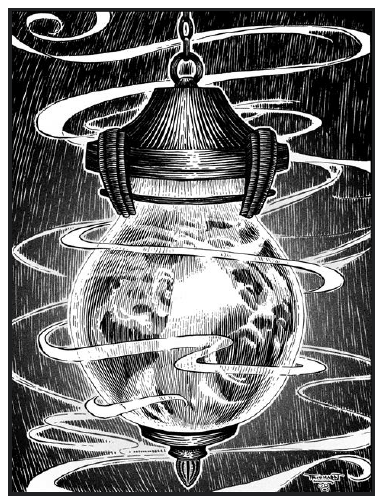
Seriously, eat your heart out Spencers' Gifts, spirit lamps look good.
Void Gate ($20/4/internal essence chamber): Using an Alcott Jar or OAF is a lot like fishing with a reel or with a spear; you have to pick a good spot, lure the ghost, etc. By comparison, using a Void Gate is a lot like fishing with dynamite or a shotgun. A void gate is a 30 pound tool that generates a ten foot diameter field in front of the device that then immediately (violently) collapses and retracts the field into itself. Anything caught in the field is drawn in, but only the first spirit gets captured; the void gate has an attached port for essence chambers, allowing for the speed capture and sealing of a ghost. When the chamber is full, you can just remove and replace it. They don't need any skills to operate, but the big downsides are: need for multiple essence chambers, comparatively low Threshold power than other rigs, can't differentiate between targets, pulls ghosts towards you, requires two hours of recharging after being fired. Looks really cool though.
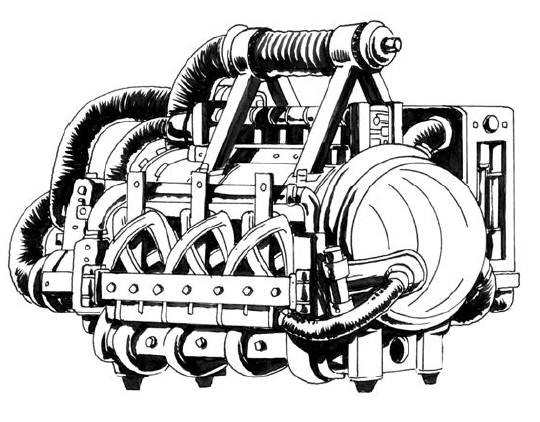
Clunky and big? Yes. Pretty cool and works well? Yes.
AETHER GEAR
Aether gear is used to hunt ghosts or communicate with them (or utilize them) without actually capturing them. Really, anything involving ghosts but not capturing/fighting them belongs here.
Aether Converter ($100): A converter weighs 20 pounds and consists of a turbine and aether vault. Its use is simple: transfer a Will 3 or less spirit to the vault from an essence chamber and the turbine will generate power as it processes the spirit. The theological implications of using ghosts as power has the general public in an uproar and allegedly energy made from ghosts is sinister and bizarre, so don't expect them to replace the coal furnaces powering the aethertech towers just yet.
Aethergraph ($40, 10 silver for a disk, $5 for a prerecorded disk): The aethergraph is a phonograph designed to play EVP, aetheric vibrations, emotions, thoughts and more. It can also record up to a hour of whatever it picks up and burn it to a disk. Excuse me while I pedal down the street on my bicycle, blasting this disk of what ladies think about me as I balance a phonograph on my handlebars.
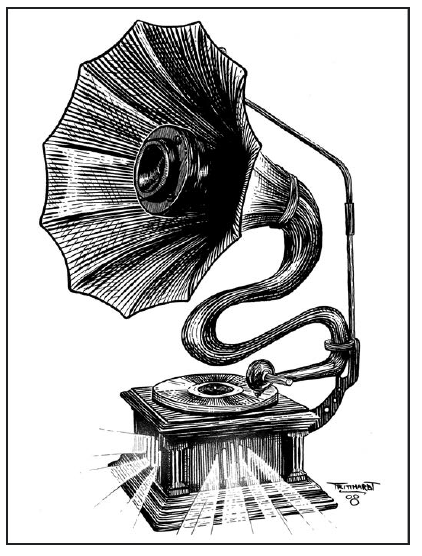
Ghosts really don't appreciate it when you scratch records to remix their death wails.
Aetheric Coupling Tube ($2): "Used to transfer spectral matter from one aethertech vessel to another". Translation: you need one of these to shunt a ghost from an essence chamber to a vault.
Aetheric Monitor ($5): A watch-sized device used to...monitor the aether. There's complicated rules for reading it but meh whatever.
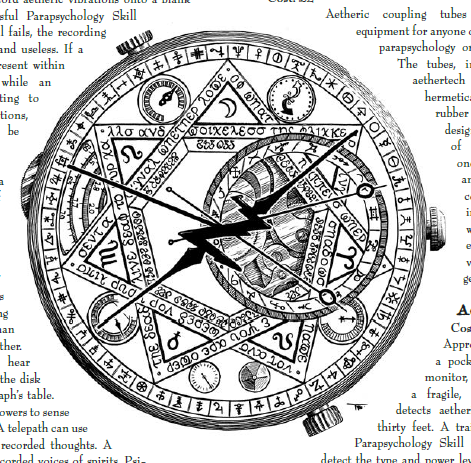
Either this aetheric monitor is broken or it's a feature, not a bug.
Aether Lock ($40): An aether lock is a lamp-shaped device that creates a 10 foot zone of interference. Ghosts can't manifest, psychics and ghosts have a harder time using their powers and it gives psychics IP.
Autopsychographer ($20): The poor man's aethergraph, the autopsychographer is a typewriter hooked up to a motor and a field generator that records everything said onto a piece of paper.
Devourer Swarm ($25 for a small school, $40 for a large, $20 for the habitat): Ohhh man these little bastards are my favorite thing in this chapter. Devourers are little aetheric critters made artificially that live in a modified ectohabitat, either fish tank style or a reinforced backpack with a tube. The Devourers themselves look like ghostly fish with skeletons. Using the swarm is simple: point towards ghosts, release and recall with a special tune that tells them to come back to the tank. When released, they will attempt to eat any and all ghosts in the area; large swarms have Will 5 while small have 3.
Psychoactive Photo Plates ($1): Want to take pictures of ghosts? Use these.
Psychocondenser ($25): A psychocondenser is a still with an attached essence chamber that's used to distill a ghost into alchemical solutions. This always uses up the entire ghost. Never drink/use the raw distilled ghost, that is a terrible idea that won't kill you but will make you wish you died.
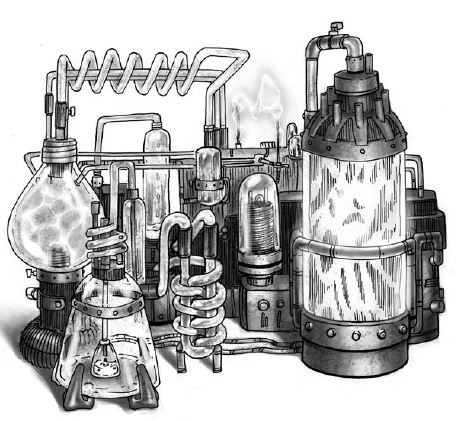
The psychocondenser, for if you want to try putting spirit in your spirits (again, do not do this, do not drink the ghosts).
Psychoscopic Goggles ($20): Goggles that let you see ghosts, auras, astral projections and psychic powers in use but inhibit normal vision while used.
Rictus ($60): The Rictus is a full-face mask made of lead crystal and glass that makes the wearer's completely immune to all non-psychokinetic powers and spectral manifestations and also become invisible to ghosts and scrying. The masks were based on designs from crystal skulls and various hoopla that actually worked. The mask only remains perfectly clear to people whose Corruptions aren't higher than 1, becoming darker and darker the worse of a person the user is. I have no idea if the mask has eyeholes so I mean the mask's darkness may show the world "hey my owner is a horrible person" but people still can't tell who you are, so it might not be that much of a downside.
Shadow Caster ($250): The Shadow Caster lets people engage in astral projection in the form of a living shadow. The device itself is a tripod projector that casts the shadow of the user onto a screen. It's not an invisible shadow and it has to stay in contact with the ground but other than that, the other rules of astral projection apply. This is also terrible to use. Each charge lasts two hours and anything less than touching your body to get back in results in -2 to all Attribute/Skill rolls for 6d10 minutes while you gain a horrific headache and violent vomiting while you piss and shit yourself.
Soul Harvester ($100, $25 per cartridge, $5 per filter): First of all, the machine is highly illegal. Second of all, it was invented by the Prussians as a punishment device for criminals who deserved more than death that found its way to London illegally. The soul harvester itself is a box with a neck that contains tubes attached to a face mount that goes over the top of the head. In a nutshell, you put a person's head in the mount and slam it shut, shoving glass prongs into the victim's eyes which drains the aetheric energy through the skull, down the tubes and filters of the neck and into the box. The box itself contains a "maiden cartridge", an essence chamber that contains the ghost you made from murdering the victim. The machine also makes a weird psychic sludge captured in the filters that goes for big money on the black market. The whole process takes three minutes or six if it's not being maintained properly but the filter must be replaced every five extractions. The contained souls are normally kept on display in Prussia along with the name of the criminal. Interestingly? The chambers don't need an aetheric source to contain them. Good German engineering.
Telekinetic Lock ($15+): A lock that requires telekinesis to open, generally made by telekinetic locksmiths.
Transaetheric Receiver ($35, 10s for headset, 8s for antenna): Use this radio to hear ghosts. Never use the radio that hears ghosts within someone using a psychic power, that is a terrible idea.
Transaether Luminator ($20): The luminator is a gyroscope of seven brass plates that, when spun once by hand, will create an ectoplasmic mist that shows all ghosts in thirty feet for ten minutes. Do not interrupt the device while it spins or else you'll break it/get electrocuted. The really notable thing about this invention is that the design was invented by a French inventor before he was imprisoned by the Golden King, the actually immortal god king of France. This is also the only French item on the list and it works solely by spinning which really makes me want to know more about what's going on behind the closed borders of France. Too bad we'll never know.
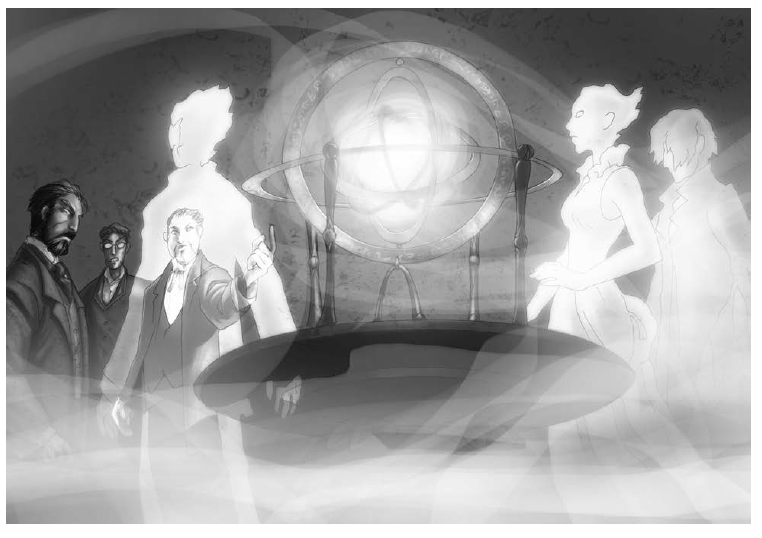
The luminator at work.
Transpsychic Resonator ($150): The TPR is a brass cylinder that boosts the power of a psychic when pressed against the back of their neck, sinking metal prongs into their neck and running an alchemical solution directly into their body and is removed by applying pressure to the top of the TPR. When attached, it gives the psychic +2 to their Will when it comes to damage, range and contested Will rolls. However, every use forces a control check where a failure forces the psychic to pass out and use runs the risk of making mental disorders worse. If that's not bad enough, there's a chance that user will create an apparition based on their memories or thoughts. That last part isn't so bad really, apparitions can't do shit. They should have gone with "ghost" or "poltergeist".
AETHER WEAPONS
Carpe Spiritus ($75): The Carpe Spiritus is basically a four-shot howitzer that forces ghosts to become corporeal by trapping them temporarily in ectoplasm. Any hits to the weapon (like most Galvanic weapons) inflict a -3 penalty to use and using the gun without rubber gloves will electrocute you (like most).
Grenade, Aetherpulse ($5): The aetherpulse grenade is a brass clockwork weapon that will remain primed once it's wound. Simply tossing it causes a pulse of energy that forces spirits to lose 1 Will or psychics to take 1 IP if they fail a DC 16 Will check.
Klöchmann-Adler Hellbore ($100+ and crazy illegal): The Hellbore was created by an Austrian parapsychologist (Adler) who immediately sold it to an esoteric group who sold it to empire who started making the guns for soldiers. Then Klöchmann Arms went bankrupt and top-secret weaponry started ending up in the hands of anarchist and terror cells. Simply put, the Hellbore is a Galvanic rifle that uses ghosts as ammo, drawing from an essence chamber built into the stock. Each shot drains 1 Will from the spirit and creates a five foot explosion of ectoplasm and ethereal energy that forces a Vitality and Will roll in everyone in the area (and automatically forces 1 IP in psychics). If Vitality is passed but Will is failed, the victim is overcome with despair for 2d10 minutes and spends 1d5 days in a depressed funk with -3 Wit, Will and Initiative. Fail Vitality but beat Will and the victim spends 2d10 minutes in pain and spends 1d5 days poisoned with -3 Vitality, Coordination and Initiative. Fail both? Instant death. Fail either roll critically? -1 to Vitality or Will. Pass both? No damage. What a weird weapon.

The Gore Cannon from SLA: Industries that Necanthropes can use is seriously a much better and cooler Emotion Gun than the Hellbore. Man I love that game.
Lockhart Aetherpulse Cannon ($50) : The LAC is a rifle that you wind and fire that creates five feet of fog that forces a Will roll in psychics and ghosts. If they fail, psychics get 1 IP and their maintained powers shut off and ghosts get -1 Will and their manifested powers shut off. It's not as good as the aetherpulse grenade but it's a good ranged alternative.
MEDICAL EQUIPMENT, PSYCHOACTIVE DRUGS AND PROSTHETIC GRAFTS
Psychosurgery Operating Kit ($10): Boy, who knew that tampering around in someone's head could be done at such an affordable price.
Bastion: Clear solution or pills that causes the user to become immune to non-psychokinetic powers for at least a hour. If you take this and you're psychic, you can't use your own for at least a hour.
Deathlace: An oily liquid that kills anyone it's injected into and is made using spiritual distillate. It's rare because it's hard to make and not well wanted even on the black market, plus deathlace poisoning is obvious for 5+d10 hours it takes to work its way out of the victim's system. Victims become cold and pale and breathe a cold mist. If they want to survive, they need either an antidote or to succeed Vitality rolls every half hour until the 5+1d10 hours are up. It's especially cruel because everyone who dies from it becomes an apparition forced to relive the circumstances of their death.
Harrower: Harrower is a black, greasy liquid that makes the recipient a neurotic, jittery, paranoid mess once it's injected. This thing clearly has no purpose outside of letting the PCs fuck with people.
Nebuchadnezzar: Neb is an anti-aging drug made with spiritual distillate that will reduce Ghost Will+1d5 years of aging on the subject. It's a cheap, last resort drug for people who can't afford better procedures. It's highly addictive (where not using it ages the user 1d5 years every week), its uses have diminishing returns, it makes you smell delicious to the undead and the user becomes white like marble.

The aristocrat in their natural habitat: doing drugs to stay young.
Psi-Inhibitor: Psi-Inhibitor shuts down the psychic's abilities for three hours minimum (instantly if a shot or 3d10 hours later if taken in a pill). While not physically addictive, it does get mentally addictive for psychics with poor control or hatred of their powers.
Requiem: Requiem is made with a ghost's distillation that lets the drinker see into the memories and psyche of the used spirit. After the visions are over, the drinker runs the risk of getting -1 to their Will for good and Shell Shock on failure of a Will roll or if they critically fail the spirit takes over the body by completely destroying the old personality. We're not talking possession, no: the drinker is GONE.
Revelation: Drink this, see ghosts and the spirit world. You also glow in the dark for a day. Kinda rad.
Shroud: Made from the ashes of staked vampires, Shroud is a paste that makes the user invisible to ghosts if it covers more than 80% of the body. The downside? The stuff is like psychic sand; you may clean yourself off but boy do you not feel clean.
Cryptor ($30): The Cryptor is a prosthetic graft that looks like an insect and gets mounted on the back of the neck up half the head. It's attached to the spine and has a battery that draws from the aether network to shock the user any time mind control is used on them, negating the power. Downside? That shit hurts; your face twitches, you might drop whatever is in your hands and you have to forfeit your next action to shake it off. Looks cool though.
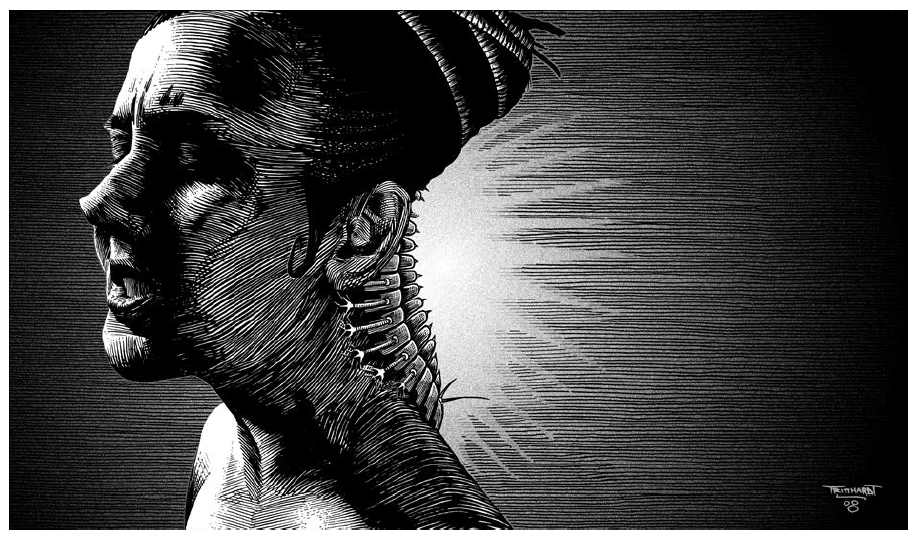
SO COOL
Thoughts on Chapter Five: Chapter five has a lot of stuff and not all of it is...good. I mean, sure, it covers the bases when it comes to not using a Medium, but it goes way beyond what it needs to with the whole "look technology can only do SO much angle". The new weapons are pretty useless and meh, the ghost catching equipment is nice but very, very limited in choices, not much of the drugs are worth any use, Devourer Swarms are awesome little spooky pets and I would love to own them. All in all? Par for the course for Unhallowed Metropolis/Necropolis: a bunch of slightly neat stuff and mostly useless clunky stuff. Also pretty much every parapsychologist headquarter/ghost containment central is one bad power outage from releasing everything, from the vaults to the ghosts in their lamps. But man oh man was the art game on point for this chapter, I included pretty much everything this time around because it's seriously so good. I just wish there were more pictures of the parapsychology ghost-capturing tech so I could get a better idea of what it looked like.
Next time: the end of the book! Holy fuck!
CHAPTER SIX: BEYOND THE SHROUD
Original SA post
CHAPTER SIX: BEYOND THE SHROUD
Chapter Six is the DM/campaign chapter that discusses the book and gives advice on how to use everything presented. It's...not particularly creative in the slightest, really. It gives advice for how to use ghosts and the new PC classes with the players or NPCs but it's kind of basic.
-
Ghosts don't gotta be evil, man, but if the whole campaign revolves around one ghost you shouldn't be too frustrating for the players.
-
Alienist NPCs/bad guys should be the ones abusing their authority while the PCs should be more investigative or supportive of the other PCs.
-
The developers flat out admit that the Exorcist is the most versatile of all classes and should just be used however but synergy with the other player's ideas works best.
-
Mediums have two jobs: see ghosts, be theatrical. Or just...don't pick a Medium and get Latent Medium as a Psychic or Mourner.
-
Parapsychologists should have technology that matches the group composition and general enemy spread. They also point out that their friendship with secret society or cults of knowledge are good for plot hooks. Evil parapsychologists are pretty much super scientist villains or ghost-obsessed nut jobs.
-
Try not to be a dick with your psychic powers but the GM should use the game's mechanics as leverage to keep your ass in line. Actually this has the longest bit of chatter in the whole section, taking into account how powerful they can be, and amounts to "yeah there's psychics but they're not omniscient if they're NPCs". Also the psychics shouldn't overshadow the normal classes which is a fair point but hard to execute well.
Plot ideas!
-
Chasing the Dragon: a Desire-Bound ghost hangs out at an opium den and likes to possess the owners/patrons to indulge in their hungers and run criminal affairs from beyond the grave. Unfortunately, the ghost has the Fetch power and it tends to party too hard to the point where people it possess die, and ghosts made from Fetch HAVE Fetch and the opium den is rapidly approaching Critical Ghost Mass.
-
Psychic Gone Amuck: A psychic has gone insane from pushing too hard and what's worse is that they're powerful. Comes in three different flavors. First, a catatonic level five empath is unintentionally broadcasting their nightmares into the brains of everyone around them and Deathwatch will raze the area if the PCs can't stop the riots and wake up/kill the empath. Second, a telepathic spiritualist cult leader with second sight has gone paranoid and is kidnapping people to make poltergeists the hard way to build an army. Finally, an electrokinetic precog with paranoia and an urge to kill is broadcasting their thoughts all over London before threatening someone at random and killing them within a week. I kinda like this seed a lot because it's got some creative use of the powers and it has three different types of psychic antagonists.
-
Tangled Webs: Mediums are being kidnapped/disappearing all around London, all of them famous/charismatic. They're being taken by a gang of criminals who killed one of their own and then realized too late that the dead man was the only one with knowledge of a giant haul of cash. The ghost doesn't want to talk to the others and so far all of the mediums have been shysters or not strong enough to convince the ghost otherwise, leading to a bad fate and another kidnapping.
-
Dollhouse: This one is...a piece of work. This is, tonally and content-wise, the worst one. A reclusive aristocrat ("long considered to be asexual and emotionless") can't cope with the death of her childhood friend and lover, a girl named Annie. However, the aristocrat is Annie's haunt, and Annie is bound by desire, so her lover has been hiring girls to let Annie possess them. What started off as sweet and loving has become sinister and sadistic, the aristocrat's desires turning dark and violent and the possessions becoming less and less consensual. The aristocrat needs to be stopped. I wouldn't run this type of scenario, period, because while it's an interesting idea (to say the least) it would require a special touch to handle appropriately and would most likely make the players very uncomfortable. I'm reading the thing and I'm uncomfortable.
That's it for chapter six! Seriously. It's seven pages of plot seeds and advice. So I won't end this entire thing on an uncomfortable downer, there's one last thing I want to look at for Unhallowed Necropolis: errata changes and additions between Necropolis and Metropolis. Oh boy!
-
Undertakers should have Survival 2.
-
Forgot to include the skills Trade, Torture and Tracking.
-
You can't take both Poor and Wealth at the same time.
-
Mental Disorders: the rules for Catatonia were accidentally reprinted under Delirium, Delirium was printed under Dementia, Dementia didn't get any rules at all.
-
Characters with Vitality 7 can lift up to 3460 pounds.
...
 That's it. That's all of it.
That's it. That's all of it.
THE END
Final Thoughts on Unhallowed Necropolis: The core game, Unhallowed Metropolis, is one of my favorite bad games. There's some games I like a great deal with flaws, but Unhallowed Metropolis goes beyond flawed to bad. It's a d20 heartbreaker with this overwrought emphasis on Victorian steampunk and every PC having a hidden heart of darkness set in a city on the constant brink of destruction. The big thing, I think, that sucked me in was the fact that they loved Neo-Victorian London as an idea and built the hell out of London as a city. A lot of the core book is just plain world building and fluff, and I'm a giant world building nerd and that's definitely something that caught my interest. The game has a lot of ideas I'd love to steal (and have been, for other project) but requires being less grim to actually play.
Unhallowed Necropolis doesn't have that and I feel like that ultimately makes it worse than the core book, but not in the same way. Unhallowed Necropolis isn't an enjoyably bad game to me: it's a boring bad game.
Are there things that stand out? Absolutely, and I was happy when they did. It actually gave me something to talk about besides digesting and repeating the info my own way. Exorcists easily being imbalanced, Devourer Swarms, incompatibility issues between both games, the sheer uncomfortable idiocy of the chapter on brain surgery. But I wouldn't call them ideas I'd take (except for the first two). A lot of these stood out in a bad way that detracted from the product. The book was literally half the size of Metropolis and it took me way too long to do this because I wasn't interested and I feel like most of you reading this aren't either. I picked apart this whole thing and all I really did was wrinkle my nose and frown at it. It taints a think I like and it's sort of impressive it took them this fast to make the series even worse by making it pretty boring and by destabilizing the mechanics of the game.
To be honest, I don't know a hell of a lot about the company and creators behind Unhallowed Metropolis and Unhallowed Necropolis. Atomic Overmind has been focusing on Day After Ragnarok but hasn't had much to say since late, late 2014. Supposedly, for Metropolis they've been working on an expansion book about France and the old British colonies. If they do? Great. I'll check it out, critique it, share it. Maybe we'll finally learn about what Australia has been up to. But I feel like I shouldn't hold my breath. The core book was their big labor of love and I feel like they said what they needed to with it, created what they wanted to. Necropolis addresses an important part of the world and yet focuses more on psychics and feels like a big old shrug. I don't think anything they can write will be better than what I can imagine about their shitty, messed up world. It's been at least two years and while I want to know more, I know I shouldn't hold my breath. And it's a shame, to me.
But there's other things out there that have great world building that interests me.

ACTUALLY THE END THIS TIME